前言
Dify是一个开源的AI应用开发平台,简单来说,它能让普通人也能轻松创建智能聊天机器人或AI助手。
它通过拖拽式的界面,整合了各种大语言模型和工具,比如可以连接企业知识库或外部API,让AI能回答专业问题或完成复杂任务。无论是程序员还是非技术人员,都能用它快速搭建AI应用,省时省力。Dify还支持本地部署,数据安全有保障,特别适合想快速上手AI的团队或个人。
其实Dify已经火了有很长时间了,之前嫌麻烦,我一直没怎么用。最近,公司里的一批小伙伴都换了配置更高的新电脑,纷纷在本地部署起了Dify,这一期就来一个小白级别的教程,和大家简单分享一下Dify的本地部署。
准备工作
Dify本身官方对电脑硬件的建议要求是:
- CPU >= 2 Core
- RAM >= 4 GiB
如果你打算做完全本地的部署,即不用云端的大模型,
如果你是windows电脑,建议配置如下:
内存:至少 16GB 系统内存(推荐 24GB 以上,留 8GB 给操作系统和其他软件)。
GPU(可选但推荐):至少 16GB VRAM 的 GPU(如 AMD Radeon RX 9070 XT 或 NVIDIA RTX 3090),支持 MXFP4 量化。GPU 内存带宽需高(如 GDDR6X/GDDR7,1000+ GB/s)。
CPU:支持 CPU 推理,但速度较慢。推荐高性能 CPU(如 AMD Ryzen 9 5900X 或 Intel Core i9)。
如果是Mac的话,
硬件:Apple Silicon(M1/M2/M3/M4),至少 16GB 统一内存(推荐 32GB)。
我自己这边用的是Mac,部署起来相对简单一些,用Windows的小伙伴可能会稍微复杂一丢丢。
Windows安装Docker可以参考这个:https://docs.docker.com/desktop/windows/install/#wsl-2-backend
本质都是先在本地电脑安装好Docker,然后通过Docker来部署Dify。
安装Docker
本地装docker,可以去docker官网直接下载一个安装包。
官方地址:https://www.docker.com/products/docker-desktop/
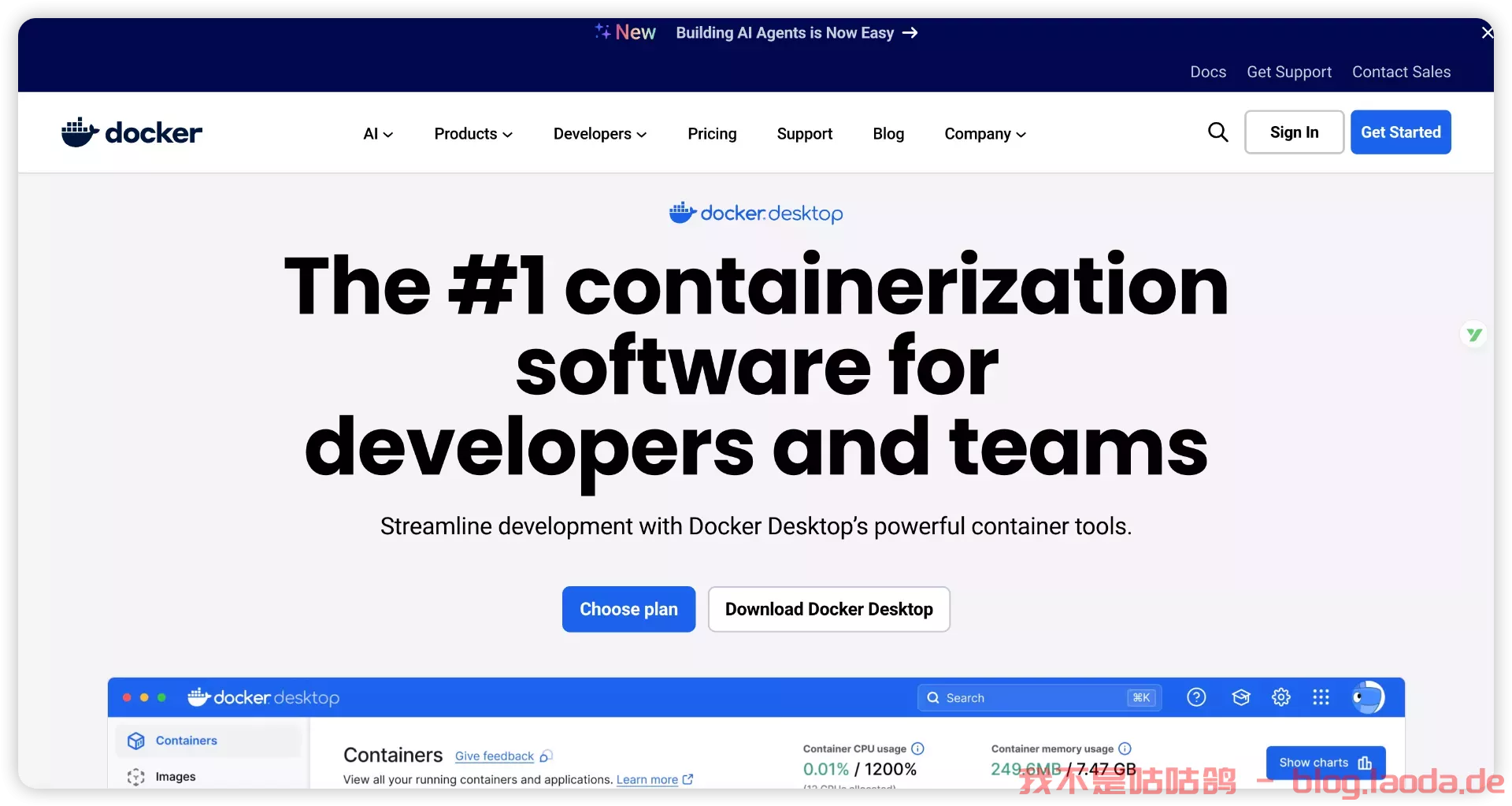
下载之后,就像安装普通软件一样,安装一下。
然后打开docker。
打开Mac的终端,输入docker -v,有版本号说明安装好了。

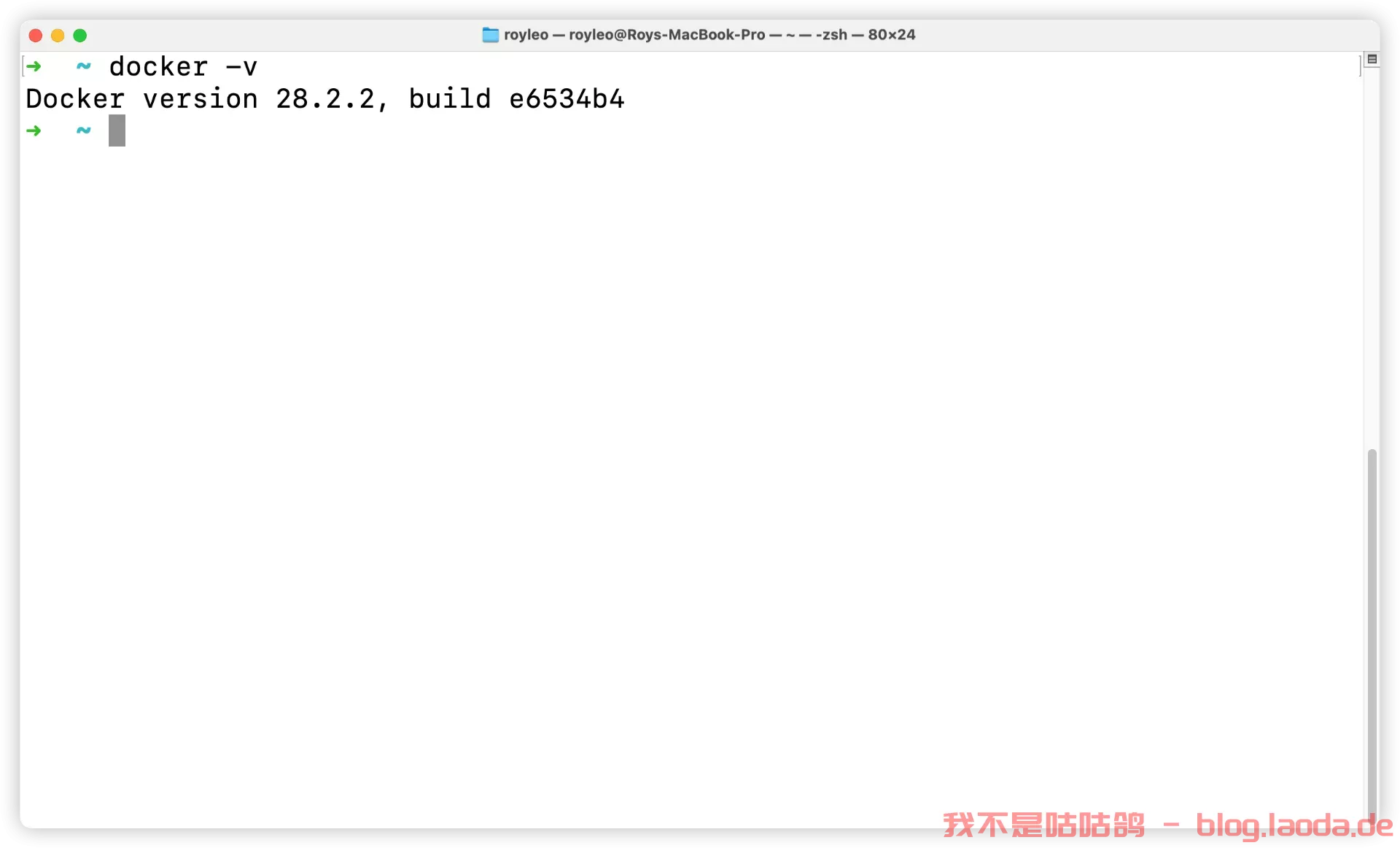
这边还会涉及docker换源,由于防火墙的原因,我们大陆可能无法访问docker的镜像仓库,建议大家换成中科大的源:https://docker.mirrors.ustc.edu.cn/
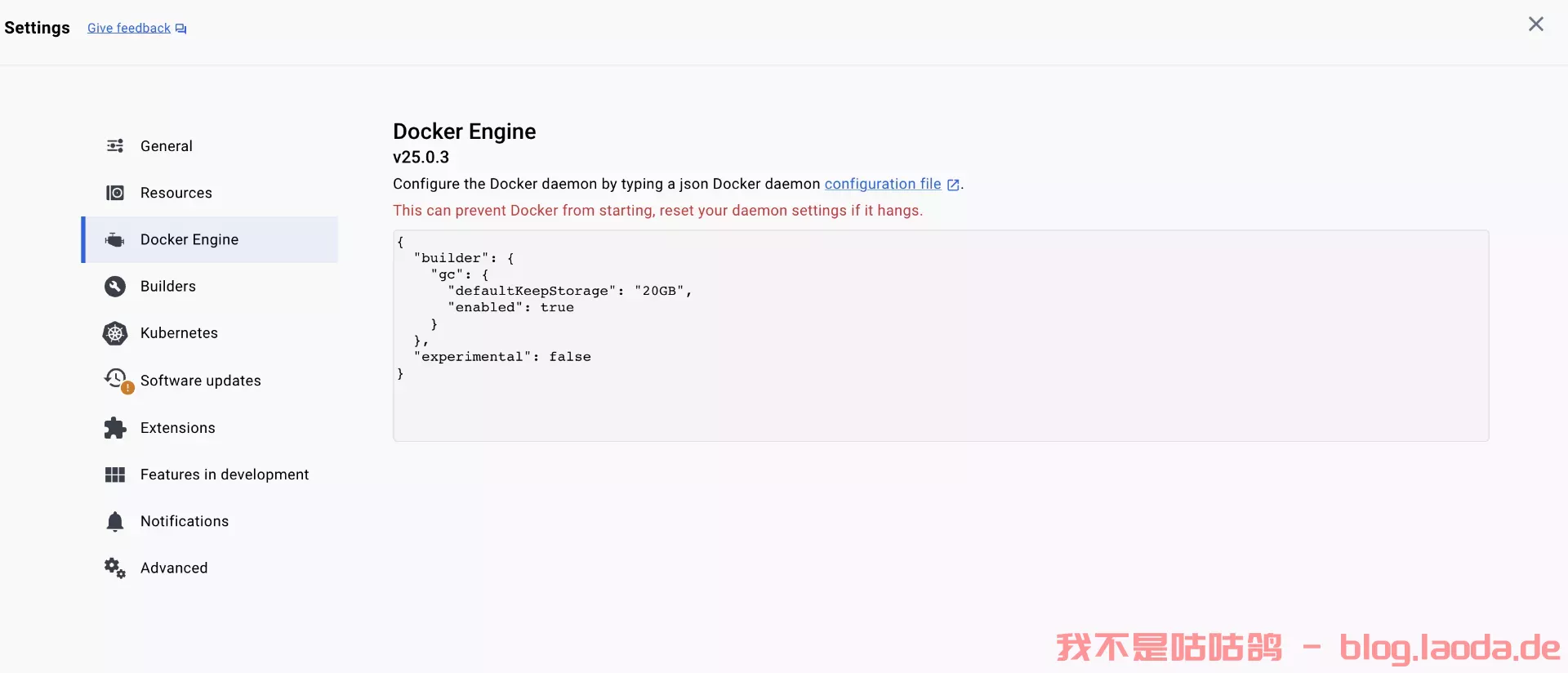
改成这个:
{
"builder": {
"gc": {
"defaultKeepStorage": "20GB",
"enabled": true
}
},
"experimental": false,
"features": {
"buildkit": true
},
"registry-mirrors": [
"https://docker.mirrors.ustc.edu.cn"
]
}
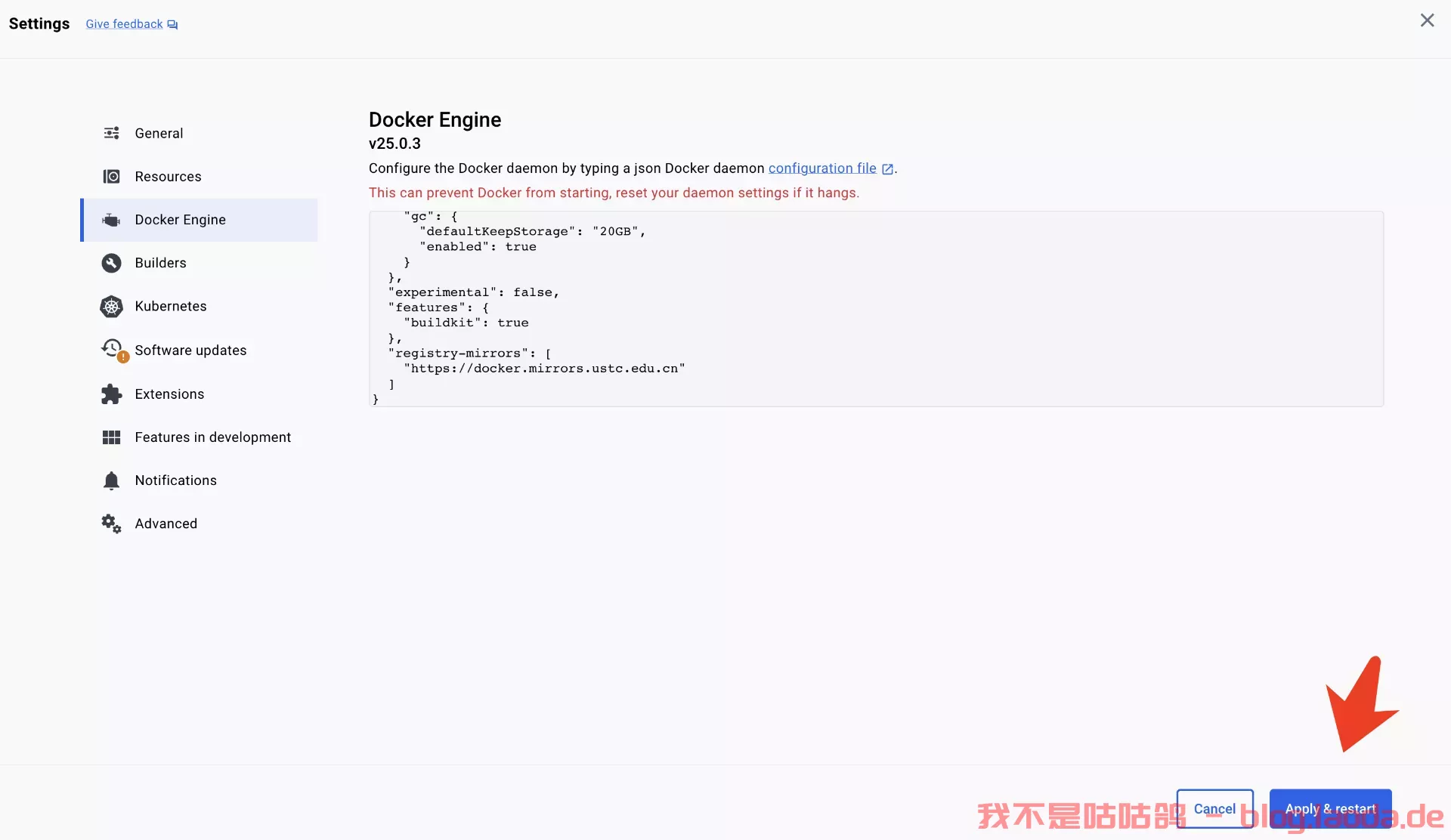
然后记得点击应用并重启。
使用如下命令查看Docker配置,
docker info
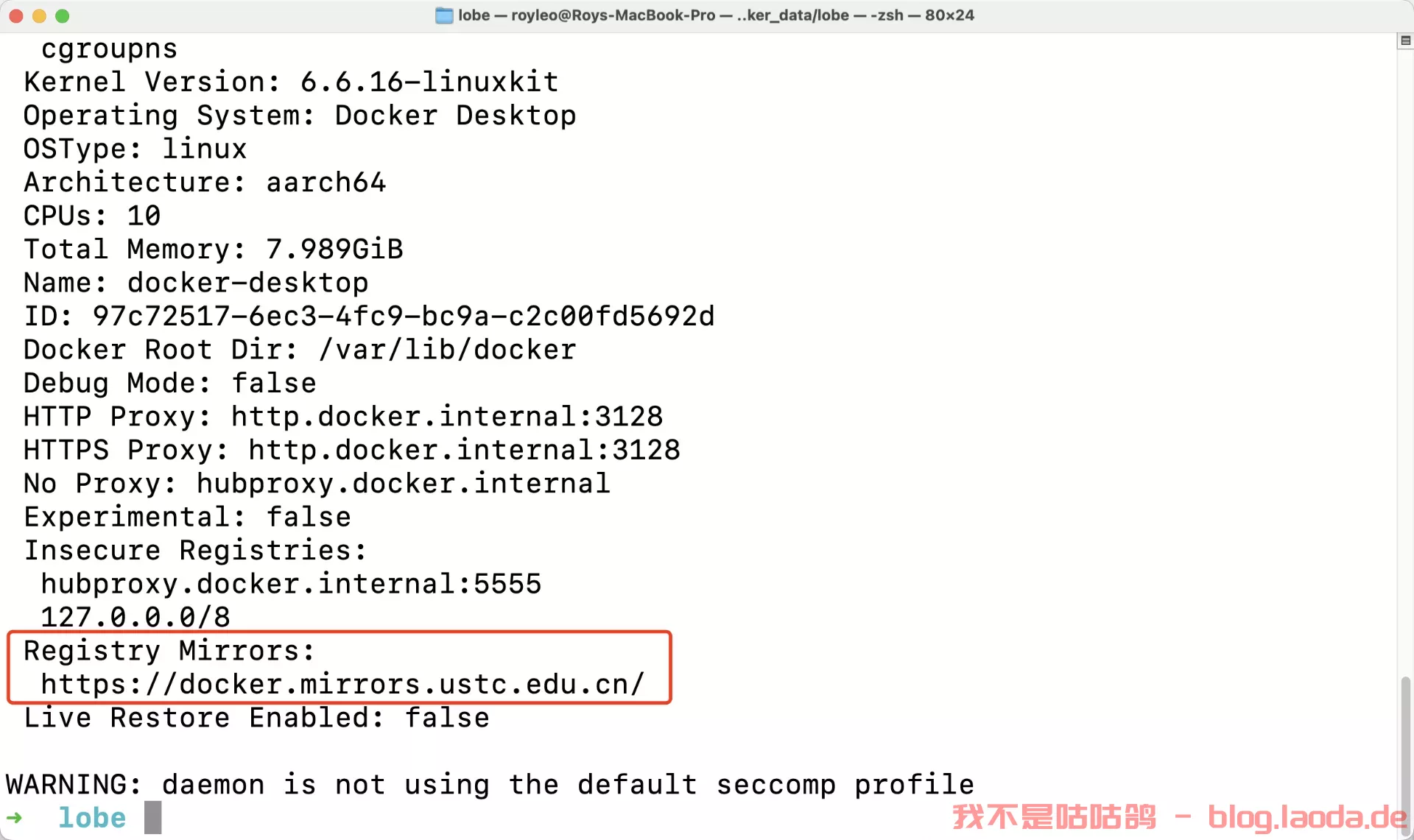
就可以了。
安装Dify
Docker安装好之后,接下来安装我们今天的主角——Dify。
文档地址:https://docs.dify.ai/en/introduction
这边一直关注咕咕的小伙伴可以很轻松的安装好。
Mac和Linux其实差不多,我们直接像操作VPS一样来就行。
mkdir ./data/docker_data
cd data/docker_data
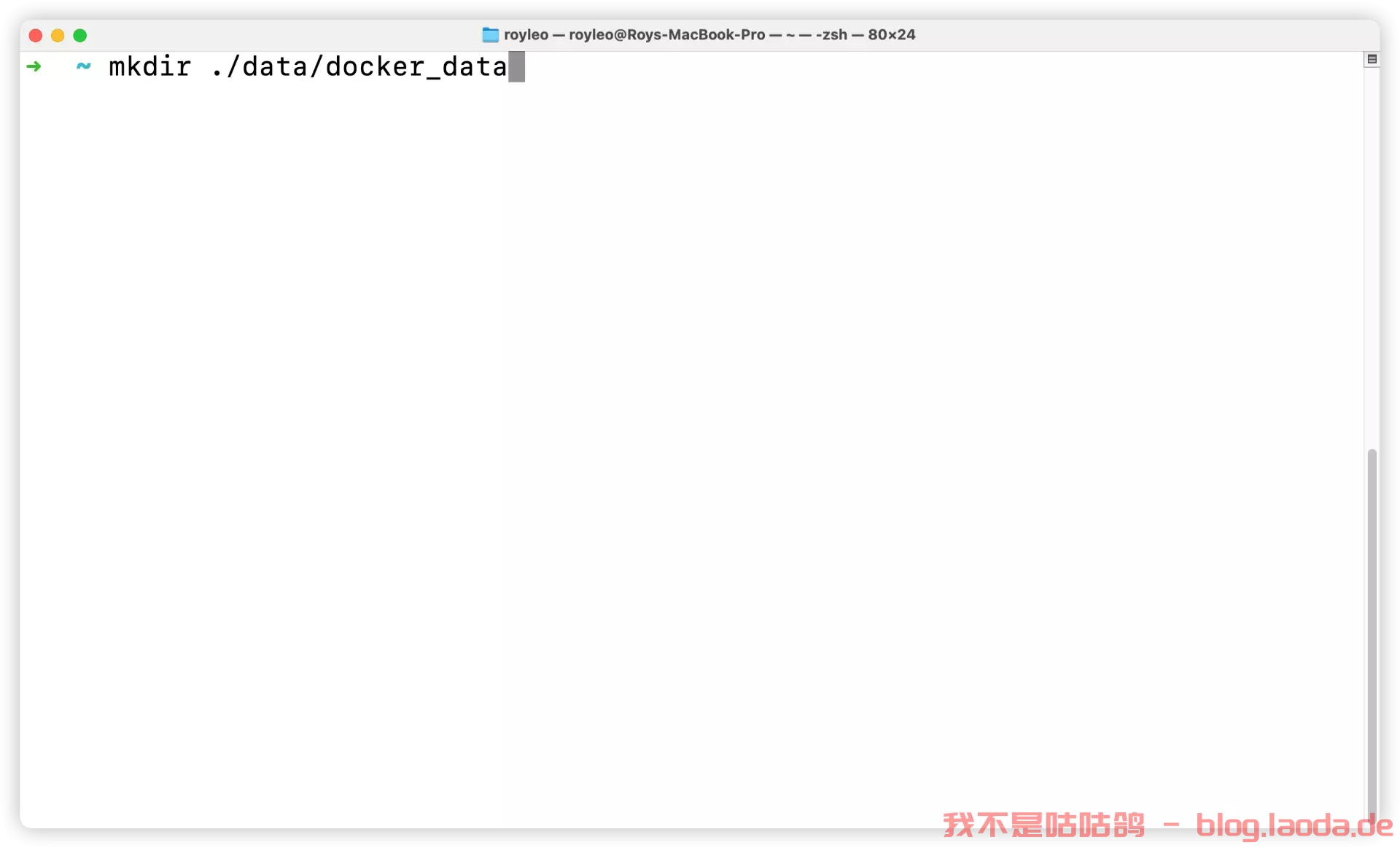
git clone --branch "$(curl -s https://api.github.com/repos/langgenius/dify/releases/latest | jq -r .tag_name)" https://github.com/langgenius/dify.git # 从GitHub下载dify源码
cd dify/docker # 进入文件夹
cp .env.example .env # 拷贝一份配置文件
这里如果后续有需求,可以自行修改这个配置文件,一起来看一下
# ------------------------------
# Environment Variables for API service & worker
# ------------------------------
# ------------------------------
# Common Variables
# ------------------------------
# The backend URL of the console API,
# used to concatenate the authorization callback.
# If empty, it is the same domain.
# Example: https://api.console.dify.ai
CONSOLE_API_URL=
# The front-end URL of the console web,
# used to concatenate some front-end addresses and for CORS configuration use.
# If empty, it is the same domain.
# Example: https://console.dify.ai
CONSOLE_WEB_URL=
# Service API Url,
# used to display Service API Base Url to the front-end.
# If empty, it is the same domain.
# Example: https://api.dify.ai
SERVICE_API_URL=
# WebApp API backend Url,
# used to declare the back-end URL for the front-end API.
# If empty, it is the same domain.
# Example: https://api.app.dify.ai
APP_API_URL=
# WebApp Url,
# used to display WebAPP API Base Url to the front-end.
# If empty, it is the same domain.
# Example: https://app.dify.ai
APP_WEB_URL=
# File preview or download Url prefix.
# used to display File preview or download Url to the front-end or as Multi-model inputs;
# Url is signed and has expiration time.
# Setting FILES_URL is required for file processing plugins.
# - For https://example.com, use FILES_URL=https://example.com
# - For http://example.com, use FILES_URL=http://example.com
# Recommendation: use a dedicated domain (e.g., https://upload.example.com).
# Alternatively, use http://<your-ip>:5001 or http://api:5001,
# ensuring port 5001 is externally accessible (see docker-compose.yaml).
FILES_URL=
# INTERNAL_FILES_URL is used for plugin daemon communication within Docker network.
# Set this to the internal Docker service URL for proper plugin file access.
# Example: INTERNAL_FILES_URL=http://api:5001
INTERNAL_FILES_URL=
# Ensure UTF-8 encoding
LANG=en_US.UTF-8
LC_ALL=en_US.UTF-8
PYTHONIOENCODING=utf-8
# ------------------------------
# Server Configuration
# ------------------------------
# The log level for the application.
# Supported values are `DEBUG`, `INFO`, `WARNING`, `ERROR`, `CRITICAL`
LOG_LEVEL=INFO
# Log file path
LOG_FILE=/app/logs/server.log
# Log file max size, the unit is MB
LOG_FILE_MAX_SIZE=20
# Log file max backup count
LOG_FILE_BACKUP_COUNT=5
# Log dateformat
LOG_DATEFORMAT=%Y-%m-%d %H:%M:%S
# Log Timezone
LOG_TZ=UTC
# Debug mode, default is false.
# It is recommended to turn on this configuration for local development
# to prevent some problems caused by monkey patch.
DEBUG=false
# Flask debug mode, it can output trace information at the interface when turned on,
# which is convenient for debugging.
FLASK_DEBUG=false
# Enable request logging, which will log the request and response information.
# And the log level is DEBUG
ENABLE_REQUEST_LOGGING=False
# A secret key that is used for securely signing the session cookie
# and encrypting sensitive information on the database.
# You can generate a strong key using `openssl rand -base64 42`.
SECRET_KEY=sk-9f73s3ljTXVcMT3Blb3ljTqtsKiGHXVcMT3BlbkFJLK7U
# Password for admin user initialization.
# If left unset, admin user will not be prompted for a password
# when creating the initial admin account.
# The length of the password cannot exceed 30 characters.
INIT_PASSWORD=
# Deployment environment.
# Supported values are `PRODUCTION`, `TESTING`. Default is `PRODUCTION`.
# Testing environment. There will be a distinct color label on the front-end page,
# indicating that this environment is a testing environment.
DEPLOY_ENV=PRODUCTION
# Whether to enable the version check policy.
# If set to empty, https://updates.dify.ai will be called for version check.
CHECK_UPDATE_URL=https://updates.dify.ai
# Used to change the OpenAI base address, default is https://api.openai.com/v1.
# When OpenAI cannot be accessed in China, replace it with a domestic mirror address,
# or when a local model provides OpenAI compatible API, it can be replaced.
OPENAI_API_BASE=https://api.openai.com/v1
# When enabled, migrations will be executed prior to application startup
# and the application will start after the migrations have completed.
MIGRATION_ENABLED=true
# File Access Time specifies a time interval in seconds for the file to be accessed.
# The default value is 300 seconds.
FILES_ACCESS_TIMEOUT=300
# Access token expiration time in minutes
ACCESS_TOKEN_EXPIRE_MINUTES=60
# Refresh token expiration time in days
REFRESH_TOKEN_EXPIRE_DAYS=30
# The maximum number of active requests for the application, where 0 means unlimited, should be a non-negative integer.
APP_MAX_ACTIVE_REQUESTS=0
APP_MAX_EXECUTION_TIME=1200
# ------------------------------
# Container Startup Related Configuration
# Only effective when starting with docker image or docker-compose.
# ------------------------------
# API service binding address, default: 0.0.0.0, i.e., all addresses can be accessed.
DIFY_BIND_ADDRESS=0.0.0.0
# API service binding port number, default 5001.
DIFY_PORT=5001
# The number of API server workers, i.e., the number of workers.
# Formula: number of cpu cores x 2 + 1 for sync, 1 for Gevent
# Reference: https://docs.gunicorn.org/en/stable/design.html#how-many-workers
SERVER_WORKER_AMOUNT=1
# Defaults to gevent. If using windows, it can be switched to sync or solo.
SERVER_WORKER_CLASS=gevent
# Default number of worker connections, the default is 10.
SERVER_WORKER_CONNECTIONS=10
# Similar to SERVER_WORKER_CLASS.
# If using windows, it can be switched to sync or solo.
CELERY_WORKER_CLASS=
# Request handling timeout. The default is 200,
# it is recommended to set it to 360 to support a longer sse connection time.
GUNICORN_TIMEOUT=360
# The number of Celery workers. The default is 1, and can be set as needed.
CELERY_WORKER_AMOUNT=
# Flag indicating whether to enable autoscaling of Celery workers.
#
# Autoscaling is useful when tasks are CPU intensive and can be dynamically
# allocated and deallocated based on the workload.
#
# When autoscaling is enabled, the maximum and minimum number of workers can
# be specified. The autoscaling algorithm will dynamically adjust the number
# of workers within the specified range.
#
# Default is false (i.e., autoscaling is disabled).
#
# Example:
# CELERY_AUTO_SCALE=true
CELERY_AUTO_SCALE=false
# The maximum number of Celery workers that can be autoscaled.
# This is optional and only used when autoscaling is enabled.
# Default is not set.
CELERY_MAX_WORKERS=
# The minimum number of Celery workers that can be autoscaled.
# This is optional and only used when autoscaling is enabled.
# Default is not set.
CELERY_MIN_WORKERS=
# API Tool configuration
API_TOOL_DEFAULT_CONNECT_TIMEOUT=10
API_TOOL_DEFAULT_READ_TIMEOUT=60
# -------------------------------
# Datasource Configuration
# --------------------------------
ENABLE_WEBSITE_JINAREADER=true
ENABLE_WEBSITE_FIRECRAWL=true
ENABLE_WEBSITE_WATERCRAWL=true
# ------------------------------
# Database Configuration
# The database uses PostgreSQL. Please use the public schema.
# It is consistent with the configuration in the 'db' service below.
# ------------------------------
DB_USERNAME=postgres
DB_PASSWORD=difyai123456
DB_HOST=db
DB_PORT=5432
DB_DATABASE=dify
# The size of the database connection pool.
# The default is 30 connections, which can be appropriately increased.
SQLALCHEMY_POOL_SIZE=30
# The default is 10 connections, which allows temporary overflow beyond the pool size.
SQLALCHEMY_MAX_OVERFLOW=10
# Database connection pool recycling time, the default is 3600 seconds.
SQLALCHEMY_POOL_RECYCLE=3600
# Whether to print SQL, default is false.
SQLALCHEMY_ECHO=false
# If True, will test connections for liveness upon each checkout
SQLALCHEMY_POOL_PRE_PING=false
# Whether to enable the Last in first out option or use default FIFO queue if is false
SQLALCHEMY_POOL_USE_LIFO=false
# Maximum number of connections to the database
# Default is 100
#
# Reference: https://www.postgresql.org/docs/current/runtime-config-connection.html#GUC-MAX-CONNECTIONS
POSTGRES_MAX_CONNECTIONS=100
# Sets the amount of shared memory used for postgres's shared buffers.
# Default is 128MB
# Recommended value: 25% of available memory
# Reference: https://www.postgresql.org/docs/current/runtime-config-resource.html#GUC-SHARED-BUFFERS
POSTGRES_SHARED_BUFFERS=128MB
# Sets the amount of memory used by each database worker for working space.
# Default is 4MB
#
# Reference: https://www.postgresql.org/docs/current/runtime-config-resource.html#GUC-WORK-MEM
POSTGRES_WORK_MEM=4MB
# Sets the amount of memory reserved for maintenance activities.
# Default is 64MB
#
# Reference: https://www.postgresql.org/docs/current/runtime-config-resource.html#GUC-MAINTENANCE-WORK-MEM
POSTGRES_MAINTENANCE_WORK_MEM=64MB
# Sets the planner's assumption about the effective cache size.
# Default is 4096MB
#
# Reference: https://www.postgresql.org/docs/current/runtime-config-query.html#GUC-EFFECTIVE-CACHE-SIZE
POSTGRES_EFFECTIVE_CACHE_SIZE=4096MB
# ------------------------------
# Redis Configuration
# This Redis configuration is used for caching and for pub/sub during conversation.
# ------------------------------
REDIS_HOST=redis
REDIS_PORT=6379
REDIS_USERNAME=
REDIS_PASSWORD=difyai123456
REDIS_USE_SSL=false
# SSL configuration for Redis (when REDIS_USE_SSL=true)
REDIS_SSL_CERT_REQS=CERT_NONE
# Options: CERT_NONE, CERT_OPTIONAL, CERT_REQUIRED
REDIS_SSL_CA_CERTS=
# Path to CA certificate file for SSL verification
REDIS_SSL_CERTFILE=
# Path to client certificate file for SSL authentication
REDIS_SSL_KEYFILE=
# Path to client private key file for SSL authentication
REDIS_DB=0
# Whether to use Redis Sentinel mode.
# If set to true, the application will automatically discover and connect to the master node through Sentinel.
REDIS_USE_SENTINEL=false
# List of Redis Sentinel nodes. If Sentinel mode is enabled, provide at least one Sentinel IP and port.
# Format: `<sentinel1_ip>:<sentinel1_port>,<sentinel2_ip>:<sentinel2_port>,<sentinel3_ip>:<sentinel3_port>`
REDIS_SENTINELS=
REDIS_SENTINEL_SERVICE_NAME=
REDIS_SENTINEL_USERNAME=
REDIS_SENTINEL_PASSWORD=
REDIS_SENTINEL_SOCKET_TIMEOUT=0.1
# List of Redis Cluster nodes. If Cluster mode is enabled, provide at least one Cluster IP and port.
# Format: `<Cluster1_ip>:<Cluster1_port>,<Cluster2_ip>:<Cluster2_port>,<Cluster3_ip>:<Cluster3_port>`
REDIS_USE_CLUSTERS=false
REDIS_CLUSTERS=
REDIS_CLUSTERS_PASSWORD=
# ------------------------------
# Celery Configuration
# ------------------------------
# Use standalone redis as the broker, and redis db 1 for celery broker. (redis_username is usually set by defualt as empty)
# Format as follows: `redis://<redis_username>:<redis_password>@<redis_host>:<redis_port>/<redis_database>`.
# Example: redis://:difyai123456@redis:6379/1
# If use Redis Sentinel, format as follows: `sentinel://<redis_username>:<redis_password>@<sentinel_host1>:<sentinel_port>/<redis_database>`
# For high availability, you can configure multiple Sentinel nodes (if provided) separated by semicolons like below example:
# Example: sentinel://:difyai123456@localhost:26379/1;sentinel://:difyai12345@localhost:26379/1;sentinel://:difyai12345@localhost:26379/1
CELERY_BROKER_URL=redis://:difyai123456@redis:6379/1
CELERY_BACKEND=redis
BROKER_USE_SSL=false
# If you are using Redis Sentinel for high availability, configure the following settings.
CELERY_USE_SENTINEL=false
CELERY_SENTINEL_MASTER_NAME=
CELERY_SENTINEL_PASSWORD=
CELERY_SENTINEL_SOCKET_TIMEOUT=0.1
# ------------------------------
# CORS Configuration
# Used to set the front-end cross-domain access policy.
# ------------------------------
# Specifies the allowed origins for cross-origin requests to the Web API,
# e.g. https://dify.app or * for all origins.
WEB_API_CORS_ALLOW_ORIGINS=*
# Specifies the allowed origins for cross-origin requests to the console API,
# e.g. https://cloud.dify.ai or * for all origins.
CONSOLE_CORS_ALLOW_ORIGINS=*
# ------------------------------
# File Storage Configuration
# ------------------------------
# The type of storage to use for storing user files.
STORAGE_TYPE=opendal
# Apache OpenDAL Configuration
# The configuration for OpenDAL consists of the following format: OPENDAL_<SCHEME_NAME>_<CONFIG_NAME>.
# You can find all the service configurations (CONFIG_NAME) in the repository at: https://github.com/apache/opendal/tree/main/core/src/services.
# Dify will scan configurations starting with OPENDAL_<SCHEME_NAME> and automatically apply them.
# The scheme name for the OpenDAL storage.
OPENDAL_SCHEME=fs
# Configurations for OpenDAL Local File System.
OPENDAL_FS_ROOT=storage
# ClickZetta Volume Configuration (for storage backend)
# To use ClickZetta Volume as storage backend, set STORAGE_TYPE=clickzetta-volume
# Note: ClickZetta Volume will reuse the existing CLICKZETTA_* connection parameters
# Volume type selection (three types available):
# - user: Personal/small team use, simple config, user-level permissions
# - table: Enterprise multi-tenant, smart routing, table-level + user-level permissions
# - external: Data lake integration, external storage connection, volume-level + storage-level permissions
CLICKZETTA_VOLUME_TYPE=user
# External Volume name (required only when TYPE=external)
CLICKZETTA_VOLUME_NAME=
# Table Volume table prefix (used only when TYPE=table)
CLICKZETTA_VOLUME_TABLE_PREFIX=dataset_
# Dify file directory prefix (isolates from other apps, recommended to keep default)
CLICKZETTA_VOLUME_DIFY_PREFIX=dify_km
# S3 Configuration
#
S3_ENDPOINT=
S3_REGION=us-east-1
S3_BUCKET_NAME=difyai
S3_ACCESS_KEY=
S3_SECRET_KEY=
# Whether to use AWS managed IAM roles for authenticating with the S3 service.
# If set to false, the access key and secret key must be provided.
S3_USE_AWS_MANAGED_IAM=false
# Azure Blob Configuration
#
AZURE_BLOB_ACCOUNT_NAME=difyai
AZURE_BLOB_ACCOUNT_KEY=difyai
AZURE_BLOB_CONTAINER_NAME=difyai-container
AZURE_BLOB_ACCOUNT_URL=https://<your_account_name>.blob.core.windows.net
# Google Storage Configuration
#
GOOGLE_STORAGE_BUCKET_NAME=your-bucket-name
GOOGLE_STORAGE_SERVICE_ACCOUNT_JSON_BASE64=
# The Alibaba Cloud OSS configurations,
#
ALIYUN_OSS_BUCKET_NAME=your-bucket-name
ALIYUN_OSS_ACCESS_KEY=your-access-key
ALIYUN_OSS_SECRET_KEY=your-secret-key
ALIYUN_OSS_ENDPOINT=https://oss-ap-southeast-1-internal.aliyuncs.com
ALIYUN_OSS_REGION=ap-southeast-1
ALIYUN_OSS_AUTH_VERSION=v4
# Don't start with '/'. OSS doesn't support leading slash in object names.
ALIYUN_OSS_PATH=your-path
# Tencent COS Configuration
#
TENCENT_COS_BUCKET_NAME=your-bucket-name
TENCENT_COS_SECRET_KEY=your-secret-key
TENCENT_COS_SECRET_ID=your-secret-id
TENCENT_COS_REGION=your-region
TENCENT_COS_SCHEME=your-scheme
# Oracle Storage Configuration
#
OCI_ENDPOINT=https://your-object-storage-namespace.compat.objectstorage.us-ashburn-1.oraclecloud.com
OCI_BUCKET_NAME=your-bucket-name
OCI_ACCESS_KEY=your-access-key
OCI_SECRET_KEY=your-secret-key
OCI_REGION=us-ashburn-1
# Huawei OBS Configuration
#
HUAWEI_OBS_BUCKET_NAME=your-bucket-name
HUAWEI_OBS_SECRET_KEY=your-secret-key
HUAWEI_OBS_ACCESS_KEY=your-access-key
HUAWEI_OBS_SERVER=your-server-url
# Volcengine TOS Configuration
#
VOLCENGINE_TOS_BUCKET_NAME=your-bucket-name
VOLCENGINE_TOS_SECRET_KEY=your-secret-key
VOLCENGINE_TOS_ACCESS_KEY=your-access-key
VOLCENGINE_TOS_ENDPOINT=your-server-url
VOLCENGINE_TOS_REGION=your-region
# Baidu OBS Storage Configuration
#
BAIDU_OBS_BUCKET_NAME=your-bucket-name
BAIDU_OBS_SECRET_KEY=your-secret-key
BAIDU_OBS_ACCESS_KEY=your-access-key
BAIDU_OBS_ENDPOINT=your-server-url
# Supabase Storage Configuration
#
SUPABASE_BUCKET_NAME=your-bucket-name
SUPABASE_API_KEY=your-access-key
SUPABASE_URL=your-server-url
# ------------------------------
# Vector Database Configuration
# ------------------------------
# The type of vector store to use.
# Supported values are `weaviate`, `qdrant`, `milvus`, `myscale`, `relyt`, `pgvector`, `pgvecto-rs`, `chroma`, `opensearch`, `oracle`, `tencent`, `elasticsearch`, `elasticsearch-ja`, `analyticdb`, `couchbase`, `vikingdb`, `oceanbase`, `opengauss`, `tablestore`,`vastbase`,`tidb`,`tidb_on_qdrant`,`baidu`,`lindorm`,`huawei_cloud`,`upstash`, `matrixone`, `clickzetta`.
VECTOR_STORE=weaviate
# Prefix used to create collection name in vector database
VECTOR_INDEX_NAME_PREFIX=Vector_index
# The Weaviate endpoint URL. Only available when VECTOR_STORE is `weaviate`.
WEAVIATE_ENDPOINT=http://weaviate:8080
WEAVIATE_API_KEY=WVF5YThaHlkYwhGUSmCRgsX3tD5ngdN8pkih
# The Qdrant endpoint URL. Only available when VECTOR_STORE is `qdrant`.
QDRANT_URL=http://qdrant:6333
QDRANT_API_KEY=difyai123456
QDRANT_CLIENT_TIMEOUT=20
QDRANT_GRPC_ENABLED=false
QDRANT_GRPC_PORT=6334
QDRANT_REPLICATION_FACTOR=1
# Milvus configuration. Only available when VECTOR_STORE is `milvus`.
# The milvus uri.
MILVUS_URI=http://host.docker.internal:19530
MILVUS_DATABASE=
MILVUS_TOKEN=
MILVUS_USER=
MILVUS_PASSWORD=
MILVUS_ENABLE_HYBRID_SEARCH=False
MILVUS_ANALYZER_PARAMS=
# MyScale configuration, only available when VECTOR_STORE is `myscale`
# For multi-language support, please set MYSCALE_FTS_PARAMS with referring to:
# https://myscale.com/docs/en/text-search/#understanding-fts-index-parameters
MYSCALE_HOST=myscale
MYSCALE_PORT=8123
MYSCALE_USER=default
MYSCALE_PASSWORD=
MYSCALE_DATABASE=dify
MYSCALE_FTS_PARAMS=
# Couchbase configurations, only available when VECTOR_STORE is `couchbase`
# The connection string must include hostname defined in the docker-compose file (couchbase-server in this case)
COUCHBASE_CONNECTION_STRING=couchbase://couchbase-server
COUCHBASE_USER=Administrator
COUCHBASE_PASSWORD=password
COUCHBASE_BUCKET_NAME=Embeddings
COUCHBASE_SCOPE_NAME=_default
# pgvector configurations, only available when VECTOR_STORE is `pgvector`
PGVECTOR_HOST=pgvector
PGVECTOR_PORT=5432
PGVECTOR_USER=postgres
PGVECTOR_PASSWORD=difyai123456
PGVECTOR_DATABASE=dify
PGVECTOR_MIN_CONNECTION=1
PGVECTOR_MAX_CONNECTION=5
PGVECTOR_PG_BIGM=false
PGVECTOR_PG_BIGM_VERSION=1.2-20240606
# vastbase configurations, only available when VECTOR_STORE is `vastbase`
VASTBASE_HOST=vastbase
VASTBASE_PORT=5432
VASTBASE_USER=dify
VASTBASE_PASSWORD=Difyai123456
VASTBASE_DATABASE=dify
VASTBASE_MIN_CONNECTION=1
VASTBASE_MAX_CONNECTION=5
# pgvecto-rs configurations, only available when VECTOR_STORE is `pgvecto-rs`
PGVECTO_RS_HOST=pgvecto-rs
PGVECTO_RS_PORT=5432
PGVECTO_RS_USER=postgres
PGVECTO_RS_PASSWORD=difyai123456
PGVECTO_RS_DATABASE=dify
# analyticdb configurations, only available when VECTOR_STORE is `analyticdb`
ANALYTICDB_KEY_ID=your-ak
ANALYTICDB_KEY_SECRET=your-sk
ANALYTICDB_REGION_ID=cn-hangzhou
ANALYTICDB_INSTANCE_ID=gp-ab123456
ANALYTICDB_ACCOUNT=testaccount
ANALYTICDB_PASSWORD=testpassword
ANALYTICDB_NAMESPACE=dify
ANALYTICDB_NAMESPACE_PASSWORD=difypassword
ANALYTICDB_HOST=gp-test.aliyuncs.com
ANALYTICDB_PORT=5432
ANALYTICDB_MIN_CONNECTION=1
ANALYTICDB_MAX_CONNECTION=5
# TiDB vector configurations, only available when VECTOR_STORE is `tidb_vector`
TIDB_VECTOR_HOST=tidb
TIDB_VECTOR_PORT=4000
TIDB_VECTOR_USER=
TIDB_VECTOR_PASSWORD=
TIDB_VECTOR_DATABASE=dify
# Matrixone vector configurations.
MATRIXONE_HOST=matrixone
MATRIXONE_PORT=6001
MATRIXONE_USER=dump
MATRIXONE_PASSWORD=111
MATRIXONE_DATABASE=dify
# Tidb on qdrant configuration, only available when VECTOR_STORE is `tidb_on_qdrant`
TIDB_ON_QDRANT_URL=http://127.0.0.1
TIDB_ON_QDRANT_API_KEY=dify
TIDB_ON_QDRANT_CLIENT_TIMEOUT=20
TIDB_ON_QDRANT_GRPC_ENABLED=false
TIDB_ON_QDRANT_GRPC_PORT=6334
TIDB_PUBLIC_KEY=dify
TIDB_PRIVATE_KEY=dify
TIDB_API_URL=http://127.0.0.1
TIDB_IAM_API_URL=http://127.0.0.1
TIDB_REGION=regions/aws-us-east-1
TIDB_PROJECT_ID=dify
TIDB_SPEND_LIMIT=100
# Chroma configuration, only available when VECTOR_STORE is `chroma`
CHROMA_HOST=127.0.0.1
CHROMA_PORT=8000
CHROMA_TENANT=default_tenant
CHROMA_DATABASE=default_database
CHROMA_AUTH_PROVIDER=chromadb.auth.token_authn.TokenAuthClientProvider
CHROMA_AUTH_CREDENTIALS=
# Oracle configuration, only available when VECTOR_STORE is `oracle`
ORACLE_USER=dify
ORACLE_PASSWORD=dify
ORACLE_DSN=oracle:1521/FREEPDB1
ORACLE_CONFIG_DIR=/app/api/storage/wallet
ORACLE_WALLET_LOCATION=/app/api/storage/wallet
ORACLE_WALLET_PASSWORD=dify
ORACLE_IS_AUTONOMOUS=false
# relyt configurations, only available when VECTOR_STORE is `relyt`
RELYT_HOST=db
RELYT_PORT=5432
RELYT_USER=postgres
RELYT_PASSWORD=difyai123456
RELYT_DATABASE=postgres
# open search configuration, only available when VECTOR_STORE is `opensearch`
OPENSEARCH_HOST=opensearch
OPENSEARCH_PORT=9200
OPENSEARCH_SECURE=true
OPENSEARCH_VERIFY_CERTS=true
OPENSEARCH_AUTH_METHOD=basic
OPENSEARCH_USER=admin
OPENSEARCH_PASSWORD=admin
# If using AWS managed IAM, e.g. Managed Cluster or OpenSearch Serverless
OPENSEARCH_AWS_REGION=ap-southeast-1
OPENSEARCH_AWS_SERVICE=aoss
# tencent vector configurations, only available when VECTOR_STORE is `tencent`
TENCENT_VECTOR_DB_URL=http://127.0.0.1
TENCENT_VECTOR_DB_API_KEY=dify
TENCENT_VECTOR_DB_TIMEOUT=30
TENCENT_VECTOR_DB_USERNAME=dify
TENCENT_VECTOR_DB_DATABASE=dify
TENCENT_VECTOR_DB_SHARD=1
TENCENT_VECTOR_DB_REPLICAS=2
TENCENT_VECTOR_DB_ENABLE_HYBRID_SEARCH=false
# ElasticSearch configuration, only available when VECTOR_STORE is `elasticsearch`
ELASTICSEARCH_HOST=0.0.0.0
ELASTICSEARCH_PORT=9200
ELASTICSEARCH_USERNAME=elastic
ELASTICSEARCH_PASSWORD=elastic
KIBANA_PORT=5601
# Using ElasticSearch Cloud Serverless, or not.
ELASTICSEARCH_USE_CLOUD=false
ELASTICSEARCH_CLOUD_URL=YOUR-ELASTICSEARCH_CLOUD_URL
ELASTICSEARCH_API_KEY=YOUR-ELASTICSEARCH_API_KEY
ELASTICSEARCH_VERIFY_CERTS=False
ELASTICSEARCH_CA_CERTS=
ELASTICSEARCH_REQUEST_TIMEOUT=100000
ELASTICSEARCH_RETRY_ON_TIMEOUT=True
ELASTICSEARCH_MAX_RETRIES=10
# baidu vector configurations, only available when VECTOR_STORE is `baidu`
BAIDU_VECTOR_DB_ENDPOINT=http://127.0.0.1:5287
BAIDU_VECTOR_DB_CONNECTION_TIMEOUT_MS=30000
BAIDU_VECTOR_DB_ACCOUNT=root
BAIDU_VECTOR_DB_API_KEY=dify
BAIDU_VECTOR_DB_DATABASE=dify
BAIDU_VECTOR_DB_SHARD=1
BAIDU_VECTOR_DB_REPLICAS=3
# VikingDB configurations, only available when VECTOR_STORE is `vikingdb`
VIKINGDB_ACCESS_KEY=your-ak
VIKINGDB_SECRET_KEY=your-sk
VIKINGDB_REGION=cn-shanghai
VIKINGDB_HOST=api-vikingdb.xxx.volces.com
VIKINGDB_SCHEMA=http
VIKINGDB_CONNECTION_TIMEOUT=30
VIKINGDB_SOCKET_TIMEOUT=30
# Lindorm configuration, only available when VECTOR_STORE is `lindorm`
LINDORM_URL=http://lindorm:30070
LINDORM_USERNAME=lindorm
LINDORM_PASSWORD=lindorm
LINDORM_QUERY_TIMEOUT=1
# OceanBase Vector configuration, only available when VECTOR_STORE is `oceanbase`
OCEANBASE_VECTOR_HOST=oceanbase
OCEANBASE_VECTOR_PORT=2881
OCEANBASE_VECTOR_USER=root@test
OCEANBASE_VECTOR_PASSWORD=difyai123456
OCEANBASE_VECTOR_DATABASE=test
OCEANBASE_CLUSTER_NAME=difyai
OCEANBASE_MEMORY_LIMIT=6G
OCEANBASE_ENABLE_HYBRID_SEARCH=false
# opengauss configurations, only available when VECTOR_STORE is `opengauss`
OPENGAUSS_HOST=opengauss
OPENGAUSS_PORT=6600
OPENGAUSS_USER=postgres
OPENGAUSS_PASSWORD=Dify@123
OPENGAUSS_DATABASE=dify
OPENGAUSS_MIN_CONNECTION=1
OPENGAUSS_MAX_CONNECTION=5
OPENGAUSS_ENABLE_PQ=false
# huawei cloud search service vector configurations, only available when VECTOR_STORE is `huawei_cloud`
HUAWEI_CLOUD_HOSTS=https://127.0.0.1:9200
HUAWEI_CLOUD_USER=admin
HUAWEI_CLOUD_PASSWORD=admin
# Upstash Vector configuration, only available when VECTOR_STORE is `upstash`
UPSTASH_VECTOR_URL=https://xxx-vector.upstash.io
UPSTASH_VECTOR_TOKEN=dify
# TableStore Vector configuration
# (only used when VECTOR_STORE is tablestore)
TABLESTORE_ENDPOINT=https://instance-name.cn-hangzhou.ots.aliyuncs.com
TABLESTORE_INSTANCE_NAME=instance-name
TABLESTORE_ACCESS_KEY_ID=xxx
TABLESTORE_ACCESS_KEY_SECRET=xxx
TABLESTORE_NORMALIZE_FULLTEXT_BM25_SCORE=false
# Clickzetta configuration, only available when VECTOR_STORE is `clickzetta`
CLICKZETTA_USERNAME=
CLICKZETTA_PASSWORD=
CLICKZETTA_INSTANCE=
CLICKZETTA_SERVICE=api.clickzetta.com
CLICKZETTA_WORKSPACE=quick_start
CLICKZETTA_VCLUSTER=default_ap
CLICKZETTA_SCHEMA=dify
CLICKZETTA_BATCH_SIZE=100
CLICKZETTA_ENABLE_INVERTED_INDEX=true
CLICKZETTA_ANALYZER_TYPE=chinese
CLICKZETTA_ANALYZER_MODE=smart
CLICKZETTA_VECTOR_DISTANCE_FUNCTION=cosine_distance
# ------------------------------
# Knowledge Configuration
# ------------------------------
# Upload file size limit, default 15M.
UPLOAD_FILE_SIZE_LIMIT=15
# The maximum number of files that can be uploaded at a time, default 5.
UPLOAD_FILE_BATCH_LIMIT=5
# ETL type, support: `dify`, `Unstructured`
# `dify` Dify's proprietary file extraction scheme
# `Unstructured` Unstructured.io file extraction scheme
ETL_TYPE=dify
# Unstructured API path and API key, needs to be configured when ETL_TYPE is Unstructured
# Or using Unstructured for document extractor node for pptx.
# For example: http://unstructured:8000/general/v0/general
UNSTRUCTURED_API_URL=
UNSTRUCTURED_API_KEY=
SCARF_NO_ANALYTICS=true
# ------------------------------
# Model Configuration
# ------------------------------
# The maximum number of tokens allowed for prompt generation.
# This setting controls the upper limit of tokens that can be used by the LLM
# when generating a prompt in the prompt generation tool.
# Default: 512 tokens.
PROMPT_GENERATION_MAX_TOKENS=512
# The maximum number of tokens allowed for code generation.
# This setting controls the upper limit of tokens that can be used by the LLM
# when generating code in the code generation tool.
# Default: 1024 tokens.
CODE_GENERATION_MAX_TOKENS=1024
# Enable or disable plugin based token counting. If disabled, token counting will return 0.
# This can improve performance by skipping token counting operations.
# Default: false (disabled).
PLUGIN_BASED_TOKEN_COUNTING_ENABLED=false
# ------------------------------
# Multi-modal Configuration
# ------------------------------
# The format of the image/video/audio/document sent when the multi-modal model is input,
# the default is base64, optional url.
# The delay of the call in url mode will be lower than that in base64 mode.
# It is generally recommended to use the more compatible base64 mode.
# If configured as url, you need to configure FILES_URL as an externally accessible address so that the multi-modal model can access the image/video/audio/document.
MULTIMODAL_SEND_FORMAT=base64
# Upload image file size limit, default 10M.
UPLOAD_IMAGE_FILE_SIZE_LIMIT=10
# Upload video file size limit, default 100M.
UPLOAD_VIDEO_FILE_SIZE_LIMIT=100
# Upload audio file size limit, default 50M.
UPLOAD_AUDIO_FILE_SIZE_LIMIT=50
# ------------------------------
# Sentry Configuration
# Used for application monitoring and error log tracking.
# ------------------------------
SENTRY_DSN=
# API Service Sentry DSN address, default is empty, when empty,
# all monitoring information is not reported to Sentry.
# If not set, Sentry error reporting will be disabled.
API_SENTRY_DSN=
# API Service The reporting ratio of Sentry events, if it is 0.01, it is 1%.
API_SENTRY_TRACES_SAMPLE_RATE=1.0
# API Service The reporting ratio of Sentry profiles, if it is 0.01, it is 1%.
API_SENTRY_PROFILES_SAMPLE_RATE=1.0
# Web Service Sentry DSN address, default is empty, when empty,
# all monitoring information is not reported to Sentry.
# If not set, Sentry error reporting will be disabled.
WEB_SENTRY_DSN=
# ------------------------------
# Notion Integration Configuration
# Variables can be obtained by applying for Notion integration: https://www.notion.so/my-integrations
# ------------------------------
# Configure as "public" or "internal".
# Since Notion's OAuth redirect URL only supports HTTPS,
# if deploying locally, please use Notion's internal integration.
NOTION_INTEGRATION_TYPE=public
# Notion OAuth client secret (used for public integration type)
NOTION_CLIENT_SECRET=
# Notion OAuth client id (used for public integration type)
NOTION_CLIENT_ID=
# Notion internal integration secret.
# If the value of NOTION_INTEGRATION_TYPE is "internal",
# you need to configure this variable.
NOTION_INTERNAL_SECRET=
# ------------------------------
# Mail related configuration
# ------------------------------
# Mail type, support: resend, smtp, sendgrid
MAIL_TYPE=resend
# Default send from email address, if not specified
# If using SendGrid, use the 'from' field for authentication if necessary.
MAIL_DEFAULT_SEND_FROM=
# API-Key for the Resend email provider, used when MAIL_TYPE is `resend`.
RESEND_API_URL=https://api.resend.com
RESEND_API_KEY=your-resend-api-key
# SMTP server configuration, used when MAIL_TYPE is `smtp`
SMTP_SERVER=
SMTP_PORT=465
SMTP_USERNAME=
SMTP_PASSWORD=
SMTP_USE_TLS=true
SMTP_OPPORTUNISTIC_TLS=false
# Sendgid configuration
SENDGRID_API_KEY=
# ------------------------------
# Others Configuration
# ------------------------------
# Maximum length of segmentation tokens for indexing
INDEXING_MAX_SEGMENTATION_TOKENS_LENGTH=4000
# Member invitation link valid time (hours),
# Default: 72.
INVITE_EXPIRY_HOURS=72
# Reset password token valid time (minutes),
RESET_PASSWORD_TOKEN_EXPIRY_MINUTES=5
CHANGE_EMAIL_TOKEN_EXPIRY_MINUTES=5
OWNER_TRANSFER_TOKEN_EXPIRY_MINUTES=5
# The sandbox service endpoint.
CODE_EXECUTION_ENDPOINT=http://sandbox:8194
CODE_EXECUTION_API_KEY=dify-sandbox
CODE_MAX_NUMBER=9223372036854775807
CODE_MIN_NUMBER=-9223372036854775808
CODE_MAX_DEPTH=5
CODE_MAX_PRECISION=20
CODE_MAX_STRING_LENGTH=80000
CODE_MAX_STRING_ARRAY_LENGTH=30
CODE_MAX_OBJECT_ARRAY_LENGTH=30
CODE_MAX_NUMBER_ARRAY_LENGTH=1000
CODE_EXECUTION_CONNECT_TIMEOUT=10
CODE_EXECUTION_READ_TIMEOUT=60
CODE_EXECUTION_WRITE_TIMEOUT=10
TEMPLATE_TRANSFORM_MAX_LENGTH=80000
# Workflow runtime configuration
WORKFLOW_MAX_EXECUTION_STEPS=500
WORKFLOW_MAX_EXECUTION_TIME=1200
WORKFLOW_CALL_MAX_DEPTH=5
MAX_VARIABLE_SIZE=204800
WORKFLOW_PARALLEL_DEPTH_LIMIT=3
WORKFLOW_FILE_UPLOAD_LIMIT=10
# Workflow storage configuration
# Options: rdbms, hybrid
# rdbms: Use only the relational database (default)
# hybrid: Save new data to object storage, read from both object storage and RDBMS
WORKFLOW_NODE_EXECUTION_STORAGE=rdbms
# Repository configuration
# Core workflow execution repository implementation
# Options:
# - core.repositories.sqlalchemy_workflow_execution_repository.SQLAlchemyWorkflowExecutionRepository (default)
# - core.repositories.celery_workflow_execution_repository.CeleryWorkflowExecutionRepository
CORE_WORKFLOW_EXECUTION_REPOSITORY=core.repositories.sqlalchemy_workflow_execution_repository.SQLAlchemyWorkflowExecutionRepository
# Core workflow node execution repository implementation
# Options:
# - core.repositories.sqlalchemy_workflow_node_execution_repository.SQLAlchemyWorkflowNodeExecutionRepository (default)
# - core.repositories.celery_workflow_node_execution_repository.CeleryWorkflowNodeExecutionRepository
CORE_WORKFLOW_NODE_EXECUTION_REPOSITORY=core.repositories.sqlalchemy_workflow_node_execution_repository.SQLAlchemyWorkflowNodeExecutionRepository
# API workflow run repository implementation
API_WORKFLOW_RUN_REPOSITORY=repositories.sqlalchemy_api_workflow_run_repository.DifyAPISQLAlchemyWorkflowRunRepository
# API workflow node execution repository implementation
API_WORKFLOW_NODE_EXECUTION_REPOSITORY=repositories.sqlalchemy_api_workflow_node_execution_repository.DifyAPISQLAlchemyWorkflowNodeExecutionRepository
# Workflow log cleanup configuration
# Enable automatic cleanup of workflow run logs to manage database size
WORKFLOW_LOG_CLEANUP_ENABLED=false
# Number of days to retain workflow run logs (default: 30 days)
WORKFLOW_LOG_RETENTION_DAYS=30
# Batch size for workflow log cleanup operations (default: 100)
WORKFLOW_LOG_CLEANUP_BATCH_SIZE=100
# HTTP request node in workflow configuration
HTTP_REQUEST_NODE_MAX_BINARY_SIZE=10485760
HTTP_REQUEST_NODE_MAX_TEXT_SIZE=1048576
HTTP_REQUEST_NODE_SSL_VERIFY=True
# Respect X-* headers to redirect clients
RESPECT_XFORWARD_HEADERS_ENABLED=false
# SSRF Proxy server HTTP URL
SSRF_PROXY_HTTP_URL=http://ssrf_proxy:3128
# SSRF Proxy server HTTPS URL
SSRF_PROXY_HTTPS_URL=http://ssrf_proxy:3128
# Maximum loop count in the workflow
LOOP_NODE_MAX_COUNT=100
# The maximum number of tools that can be used in the agent.
MAX_TOOLS_NUM=10
# Maximum number of Parallelism branches in the workflow
MAX_PARALLEL_LIMIT=10
# The maximum number of iterations for agent setting
MAX_ITERATIONS_NUM=99
# ------------------------------
# Environment Variables for web Service
# ------------------------------
# The timeout for the text generation in millisecond
TEXT_GENERATION_TIMEOUT_MS=60000
# Allow rendering unsafe URLs which have "data:" scheme.
ALLOW_UNSAFE_DATA_SCHEME=false
# Maximum number of tree depth in the workflow
MAX_TREE_DEPTH=50
# ------------------------------
# Environment Variables for db Service
# ------------------------------
# The name of the default postgres user.
POSTGRES_USER=${DB_USERNAME}
# The password for the default postgres user.
POSTGRES_PASSWORD=${DB_PASSWORD}
# The name of the default postgres database.
POSTGRES_DB=${DB_DATABASE}
# postgres data directory
PGDATA=/var/lib/postgresql/data/pgdata
# ------------------------------
# Environment Variables for sandbox Service
# ------------------------------
# The API key for the sandbox service
SANDBOX_API_KEY=dify-sandbox
# The mode in which the Gin framework runs
SANDBOX_GIN_MODE=release
# The timeout for the worker in seconds
SANDBOX_WORKER_TIMEOUT=15
# Enable network for the sandbox service
SANDBOX_ENABLE_NETWORK=true
# HTTP proxy URL for SSRF protection
SANDBOX_HTTP_PROXY=http://ssrf_proxy:3128
# HTTPS proxy URL for SSRF protection
SANDBOX_HTTPS_PROXY=http://ssrf_proxy:3128
# The port on which the sandbox service runs
SANDBOX_PORT=8194
# ------------------------------
# Environment Variables for weaviate Service
# (only used when VECTOR_STORE is weaviate)
# ------------------------------
WEAVIATE_PERSISTENCE_DATA_PATH=/var/lib/weaviate
WEAVIATE_QUERY_DEFAULTS_LIMIT=25
WEAVIATE_AUTHENTICATION_ANONYMOUS_ACCESS_ENABLED=true
WEAVIATE_DEFAULT_VECTORIZER_MODULE=none
WEAVIATE_CLUSTER_HOSTNAME=node1
WEAVIATE_AUTHENTICATION_APIKEY_ENABLED=true
WEAVIATE_AUTHENTICATION_APIKEY_ALLOWED_KEYS=WVF5YThaHlkYwhGUSmCRgsX3tD5ngdN8pkih
WEAVIATE_AUTHENTICATION_APIKEY_USERS=hello@dify.ai
WEAVIATE_AUTHORIZATION_ADMINLIST_ENABLED=true
WEAVIATE_AUTHORIZATION_ADMINLIST_USERS=hello@dify.ai
# ------------------------------
# Environment Variables for Chroma
# (only used when VECTOR_STORE is chroma)
# ------------------------------
# Authentication credentials for Chroma server
CHROMA_SERVER_AUTHN_CREDENTIALS=difyai123456
# Authentication provider for Chroma server
CHROMA_SERVER_AUTHN_PROVIDER=chromadb.auth.token_authn.TokenAuthenticationServerProvider
# Persistence setting for Chroma server
CHROMA_IS_PERSISTENT=TRUE
# ------------------------------
# Environment Variables for Oracle Service
# (only used when VECTOR_STORE is oracle)
# ------------------------------
ORACLE_PWD=Dify123456
ORACLE_CHARACTERSET=AL32UTF8
# ------------------------------
# Environment Variables for milvus Service
# (only used when VECTOR_STORE is milvus)
# ------------------------------
# ETCD configuration for auto compaction mode
ETCD_AUTO_COMPACTION_MODE=revision
# ETCD configuration for auto compaction retention in terms of number of revisions
ETCD_AUTO_COMPACTION_RETENTION=1000
# ETCD configuration for backend quota in bytes
ETCD_QUOTA_BACKEND_BYTES=4294967296
# ETCD configuration for the number of changes before triggering a snapshot
ETCD_SNAPSHOT_COUNT=50000
# MinIO access key for authentication
MINIO_ACCESS_KEY=minioadmin
# MinIO secret key for authentication
MINIO_SECRET_KEY=minioadmin
# ETCD service endpoints
ETCD_ENDPOINTS=etcd:2379
# MinIO service address
MINIO_ADDRESS=minio:9000
# Enable or disable security authorization
MILVUS_AUTHORIZATION_ENABLED=true
# ------------------------------
# Environment Variables for pgvector / pgvector-rs Service
# (only used when VECTOR_STORE is pgvector / pgvector-rs)
# ------------------------------
PGVECTOR_PGUSER=postgres
# The password for the default postgres user.
PGVECTOR_POSTGRES_PASSWORD=difyai123456
# The name of the default postgres database.
PGVECTOR_POSTGRES_DB=dify
# postgres data directory
PGVECTOR_PGDATA=/var/lib/postgresql/data/pgdata
# ------------------------------
# Environment Variables for opensearch
# (only used when VECTOR_STORE is opensearch)
# ------------------------------
OPENSEARCH_DISCOVERY_TYPE=single-node
OPENSEARCH_BOOTSTRAP_MEMORY_LOCK=true
OPENSEARCH_JAVA_OPTS_MIN=512m
OPENSEARCH_JAVA_OPTS_MAX=1024m
OPENSEARCH_INITIAL_ADMIN_PASSWORD=Qazwsxedc!@#123
OPENSEARCH_MEMLOCK_SOFT=-1
OPENSEARCH_MEMLOCK_HARD=-1
OPENSEARCH_NOFILE_SOFT=65536
OPENSEARCH_NOFILE_HARD=65536
# ------------------------------
# Environment Variables for Nginx reverse proxy
# ------------------------------
NGINX_SERVER_NAME=_
NGINX_HTTPS_ENABLED=false
# HTTP port
NGINX_PORT=80
# SSL settings are only applied when HTTPS_ENABLED is true
NGINX_SSL_PORT=443
# if HTTPS_ENABLED is true, you're required to add your own SSL certificates/keys to the `./nginx/ssl` directory
# and modify the env vars below accordingly.
NGINX_SSL_CERT_FILENAME=dify.crt
NGINX_SSL_CERT_KEY_FILENAME=dify.key
NGINX_SSL_PROTOCOLS=TLSv1.1 TLSv1.2 TLSv1.3
# Nginx performance tuning
NGINX_WORKER_PROCESSES=auto
NGINX_CLIENT_MAX_BODY_SIZE=100M
NGINX_KEEPALIVE_TIMEOUT=65
# Proxy settings
NGINX_PROXY_READ_TIMEOUT=3600s
NGINX_PROXY_SEND_TIMEOUT=3600s
# Set true to accept requests for /.well-known/acme-challenge/
NGINX_ENABLE_CERTBOT_CHALLENGE=false
# ------------------------------
# Certbot Configuration
# ------------------------------
# Email address (required to get certificates from Let's Encrypt)
CERTBOT_EMAIL=your_email@example.com
# Domain name
CERTBOT_DOMAIN=your_domain.com
# certbot command options
# i.e: --force-renewal --dry-run --test-cert --debug
CERTBOT_OPTIONS=
# ------------------------------
# Environment Variables for SSRF Proxy
# ------------------------------
SSRF_HTTP_PORT=3128
SSRF_COREDUMP_DIR=/var/spool/squid
SSRF_REVERSE_PROXY_PORT=8194
SSRF_SANDBOX_HOST=sandbox
SSRF_DEFAULT_TIME_OUT=5
SSRF_DEFAULT_CONNECT_TIME_OUT=5
SSRF_DEFAULT_READ_TIME_OUT=5
SSRF_DEFAULT_WRITE_TIME_OUT=5
# ------------------------------
# docker env var for specifying vector db type at startup
# (based on the vector db type, the corresponding docker
# compose profile will be used)
# if you want to use unstructured, add ',unstructured' to the end
# ------------------------------
COMPOSE_PROFILES=${VECTOR_STORE:-weaviate}
# ------------------------------
# Docker Compose Service Expose Host Port Configurations
# ------------------------------
EXPOSE_NGINX_PORT=80
EXPOSE_NGINX_SSL_PORT=443
# ----------------------------------------------------------------------------
# ModelProvider & Tool Position Configuration
# Used to specify the model providers and tools that can be used in the app.
# ----------------------------------------------------------------------------
# Pin, include, and exclude tools
# Use comma-separated values with no spaces between items.
# Example: POSITION_TOOL_PINS=bing,google
POSITION_TOOL_PINS=
POSITION_TOOL_INCLUDES=
POSITION_TOOL_EXCLUDES=
# Pin, include, and exclude model providers
# Use comma-separated values with no spaces between items.
# Example: POSITION_PROVIDER_PINS=openai,openllm
POSITION_PROVIDER_PINS=
POSITION_PROVIDER_INCLUDES=
POSITION_PROVIDER_EXCLUDES=
# CSP https://developer.mozilla.org/en-US/docs/Web/HTTP/CSP
CSP_WHITELIST=
# Enable or disable create tidb service job
CREATE_TIDB_SERVICE_JOB_ENABLED=false
# Maximum number of submitted thread count in a ThreadPool for parallel node execution
MAX_SUBMIT_COUNT=100
# The maximum number of top-k value for RAG.
TOP_K_MAX_VALUE=10
# ------------------------------
# Plugin Daemon Configuration
# ------------------------------
DB_PLUGIN_DATABASE=dify_plugin
EXPOSE_PLUGIN_DAEMON_PORT=5002
PLUGIN_DAEMON_PORT=5002
PLUGIN_DAEMON_KEY=lYkiYYT6owG+71oLerGzA7GXCgOT++6ovaezWAjpCjf+Sjc3ZtU+qUEi
PLUGIN_DAEMON_URL=http://plugin_daemon:5002
PLUGIN_MAX_PACKAGE_SIZE=52428800
PLUGIN_PPROF_ENABLED=false
PLUGIN_DEBUGGING_HOST=0.0.0.0
PLUGIN_DEBUGGING_PORT=5003
EXPOSE_PLUGIN_DEBUGGING_HOST=localhost
EXPOSE_PLUGIN_DEBUGGING_PORT=5003
# If this key is changed, DIFY_INNER_API_KEY in plugin_daemon service must also be updated or agent node will fail.
PLUGIN_DIFY_INNER_API_KEY=QaHbTe77CtuXmsfyhR7+vRjI/+XbV1AaFy691iy+kGDv2Jvy0/eAh8Y1
PLUGIN_DIFY_INNER_API_URL=http://api:5001
ENDPOINT_URL_TEMPLATE=http://localhost/e/{hook_id}
MARKETPLACE_ENABLED=true
MARKETPLACE_API_URL=https://marketplace.dify.ai
FORCE_VERIFYING_SIGNATURE=true
PLUGIN_STDIO_BUFFER_SIZE=1024
PLUGIN_STDIO_MAX_BUFFER_SIZE=5242880
PLUGIN_PYTHON_ENV_INIT_TIMEOUT=120
PLUGIN_MAX_EXECUTION_TIMEOUT=600
# PIP_MIRROR_URL=https://pypi.tuna.tsinghua.edu.cn/simple
PIP_MIRROR_URL=
# https://github.com/langgenius/dify-plugin-daemon/blob/main/.env.example
# Plugin storage type, local aws_s3 tencent_cos azure_blob aliyun_oss volcengine_tos
PLUGIN_STORAGE_TYPE=local
PLUGIN_STORAGE_LOCAL_ROOT=/app/storage
PLUGIN_WORKING_PATH=/app/storage/cwd
PLUGIN_INSTALLED_PATH=plugin
PLUGIN_PACKAGE_CACHE_PATH=plugin_packages
PLUGIN_MEDIA_CACHE_PATH=assets
# Plugin oss bucket
PLUGIN_STORAGE_OSS_BUCKET=
# Plugin oss s3 credentials
PLUGIN_S3_USE_AWS=false
PLUGIN_S3_USE_AWS_MANAGED_IAM=false
PLUGIN_S3_ENDPOINT=
PLUGIN_S3_USE_PATH_STYLE=false
PLUGIN_AWS_ACCESS_KEY=
PLUGIN_AWS_SECRET_KEY=
PLUGIN_AWS_REGION=
# Plugin oss azure blob
PLUGIN_AZURE_BLOB_STORAGE_CONTAINER_NAME=
PLUGIN_AZURE_BLOB_STORAGE_CONNECTION_STRING=
# Plugin oss tencent cos
PLUGIN_TENCENT_COS_SECRET_KEY=
PLUGIN_TENCENT_COS_SECRET_ID=
PLUGIN_TENCENT_COS_REGION=
# Plugin oss aliyun oss
PLUGIN_ALIYUN_OSS_REGION=
PLUGIN_ALIYUN_OSS_ENDPOINT=
PLUGIN_ALIYUN_OSS_ACCESS_KEY_ID=
PLUGIN_ALIYUN_OSS_ACCESS_KEY_SECRET=
PLUGIN_ALIYUN_OSS_AUTH_VERSION=v4
PLUGIN_ALIYUN_OSS_PATH=
# Plugin oss volcengine tos
PLUGIN_VOLCENGINE_TOS_ENDPOINT=
PLUGIN_VOLCENGINE_TOS_ACCESS_KEY=
PLUGIN_VOLCENGINE_TOS_SECRET_KEY=
PLUGIN_VOLCENGINE_TOS_REGION=
# ------------------------------
# OTLP Collector Configuration
# ------------------------------
ENABLE_OTEL=false
OTLP_TRACE_ENDPOINT=
OTLP_METRIC_ENDPOINT=
OTLP_BASE_ENDPOINT=http://localhost:4318
OTLP_API_KEY=
OTEL_EXPORTER_OTLP_PROTOCOL=
OTEL_EXPORTER_TYPE=otlp
OTEL_SAMPLING_RATE=0.1
OTEL_BATCH_EXPORT_SCHEDULE_DELAY=5000
OTEL_MAX_QUEUE_SIZE=2048
OTEL_MAX_EXPORT_BATCH_SIZE=512
OTEL_METRIC_EXPORT_INTERVAL=60000
OTEL_BATCH_EXPORT_TIMEOUT=10000
OTEL_METRIC_EXPORT_TIMEOUT=30000
# Prevent Clickjacking
ALLOW_EMBED=false
# Dataset queue monitor configuration
QUEUE_MONITOR_THRESHOLD=200
# You can configure multiple ones, separated by commas. eg: test1@dify.ai,test2@dify.ai
QUEUE_MONITOR_ALERT_EMAILS=
# Monitor interval in minutes, default is 30 minutes
QUEUE_MONITOR_INTERVAL=30
# Swagger UI configuration
SWAGGER_UI_ENABLED=true
SWAGGER_UI_PATH=/swagger-ui.html
# Celery schedule tasks configuration
ENABLE_CLEAN_EMBEDDING_CACHE_TASK=false
ENABLE_CLEAN_UNUSED_DATASETS_TASK=false
ENABLE_CREATE_TIDB_SERVERLESS_TASK=false
ENABLE_UPDATE_TIDB_SERVERLESS_STATUS_TASK=false
ENABLE_CLEAN_MESSAGES=false
ENABLE_MAIL_CLEAN_DOCUMENT_NOTIFY_TASK=false
ENABLE_DATASETS_QUEUE_MONITOR=false
ENABLE_CHECK_UPGRADABLE_PLUGIN_TASK=true
太长了,其实很多都可以安装好之后,我们慢慢配置的,这边先无视它……
然后处于好奇,我们来看一下它的docker-compose.yml文件
# ==================================================================
# WARNING: This file is auto-generated by generate_docker_compose
# Do not modify this file directly. Instead, update the .env.example
# or docker-compose-template.yaml and regenerate this file.
# ==================================================================
x-shared-env: &shared-api-worker-env
CONSOLE_API_URL: ${CONSOLE_API_URL:-}
CONSOLE_WEB_URL: ${CONSOLE_WEB_URL:-}
SERVICE_API_URL: ${SERVICE_API_URL:-}
APP_API_URL: ${APP_API_URL:-}
APP_WEB_URL: ${APP_WEB_URL:-}
FILES_URL: ${FILES_URL:-}
INTERNAL_FILES_URL: ${INTERNAL_FILES_URL:-}
LANG: ${LANG:-en_US.UTF-8}
LC_ALL: ${LC_ALL:-en_US.UTF-8}
PYTHONIOENCODING: ${PYTHONIOENCODING:-utf-8}
LOG_LEVEL: ${LOG_LEVEL:-INFO}
LOG_FILE: ${LOG_FILE:-/app/logs/server.log}
LOG_FILE_MAX_SIZE: ${LOG_FILE_MAX_SIZE:-20}
LOG_FILE_BACKUP_COUNT: ${LOG_FILE_BACKUP_COUNT:-5}
LOG_DATEFORMAT: ${LOG_DATEFORMAT:-%Y-%m-%d %H:%M:%S}
LOG_TZ: ${LOG_TZ:-UTC}
DEBUG: ${DEBUG:-false}
FLASK_DEBUG: ${FLASK_DEBUG:-false}
ENABLE_REQUEST_LOGGING: ${ENABLE_REQUEST_LOGGING:-False}
SECRET_KEY: ${SECRET_KEY:-sk-9f73s3ljTXVcMT3Blb3ljTqtsKiGHXVcMT3BlbkFJLK7U}
INIT_PASSWORD: ${INIT_PASSWORD:-}
DEPLOY_ENV: ${DEPLOY_ENV:-PRODUCTION}
CHECK_UPDATE_URL: ${CHECK_UPDATE_URL:-https://updates.dify.ai}
OPENAI_API_BASE: ${OPENAI_API_BASE:-https://api.openai.com/v1}
MIGRATION_ENABLED: ${MIGRATION_ENABLED:-true}
FILES_ACCESS_TIMEOUT: ${FILES_ACCESS_TIMEOUT:-300}
ACCESS_TOKEN_EXPIRE_MINUTES: ${ACCESS_TOKEN_EXPIRE_MINUTES:-60}
REFRESH_TOKEN_EXPIRE_DAYS: ${REFRESH_TOKEN_EXPIRE_DAYS:-30}
APP_MAX_ACTIVE_REQUESTS: ${APP_MAX_ACTIVE_REQUESTS:-0}
APP_MAX_EXECUTION_TIME: ${APP_MAX_EXECUTION_TIME:-1200}
DIFY_BIND_ADDRESS: ${DIFY_BIND_ADDRESS:-0.0.0.0}
DIFY_PORT: ${DIFY_PORT:-5001}
SERVER_WORKER_AMOUNT: ${SERVER_WORKER_AMOUNT:-1}
SERVER_WORKER_CLASS: ${SERVER_WORKER_CLASS:-gevent}
SERVER_WORKER_CONNECTIONS: ${SERVER_WORKER_CONNECTIONS:-10}
CELERY_WORKER_CLASS: ${CELERY_WORKER_CLASS:-}
GUNICORN_TIMEOUT: ${GUNICORN_TIMEOUT:-360}
CELERY_WORKER_AMOUNT: ${CELERY_WORKER_AMOUNT:-}
CELERY_AUTO_SCALE: ${CELERY_AUTO_SCALE:-false}
CELERY_MAX_WORKERS: ${CELERY_MAX_WORKERS:-}
CELERY_MIN_WORKERS: ${CELERY_MIN_WORKERS:-}
API_TOOL_DEFAULT_CONNECT_TIMEOUT: ${API_TOOL_DEFAULT_CONNECT_TIMEOUT:-10}
API_TOOL_DEFAULT_READ_TIMEOUT: ${API_TOOL_DEFAULT_READ_TIMEOUT:-60}
ENABLE_WEBSITE_JINAREADER: ${ENABLE_WEBSITE_JINAREADER:-true}
ENABLE_WEBSITE_FIRECRAWL: ${ENABLE_WEBSITE_FIRECRAWL:-true}
ENABLE_WEBSITE_WATERCRAWL: ${ENABLE_WEBSITE_WATERCRAWL:-true}
DB_USERNAME: ${DB_USERNAME:-postgres}
DB_PASSWORD: ${DB_PASSWORD:-difyai123456}
DB_HOST: ${DB_HOST:-db}
DB_PORT: ${DB_PORT:-5432}
DB_DATABASE: ${DB_DATABASE:-dify}
SQLALCHEMY_POOL_SIZE: ${SQLALCHEMY_POOL_SIZE:-30}
SQLALCHEMY_MAX_OVERFLOW: ${SQLALCHEMY_MAX_OVERFLOW:-10}
SQLALCHEMY_POOL_RECYCLE: ${SQLALCHEMY_POOL_RECYCLE:-3600}
SQLALCHEMY_ECHO: ${SQLALCHEMY_ECHO:-false}
SQLALCHEMY_POOL_PRE_PING: ${SQLALCHEMY_POOL_PRE_PING:-false}
SQLALCHEMY_POOL_USE_LIFO: ${SQLALCHEMY_POOL_USE_LIFO:-false}
POSTGRES_MAX_CONNECTIONS: ${POSTGRES_MAX_CONNECTIONS:-100}
POSTGRES_SHARED_BUFFERS: ${POSTGRES_SHARED_BUFFERS:-128MB}
POSTGRES_WORK_MEM: ${POSTGRES_WORK_MEM:-4MB}
POSTGRES_MAINTENANCE_WORK_MEM: ${POSTGRES_MAINTENANCE_WORK_MEM:-64MB}
POSTGRES_EFFECTIVE_CACHE_SIZE: ${POSTGRES_EFFECTIVE_CACHE_SIZE:-4096MB}
REDIS_HOST: ${REDIS_HOST:-redis}
REDIS_PORT: ${REDIS_PORT:-6379}
REDIS_USERNAME: ${REDIS_USERNAME:-}
REDIS_PASSWORD: ${REDIS_PASSWORD:-difyai123456}
REDIS_USE_SSL: ${REDIS_USE_SSL:-false}
REDIS_SSL_CERT_REQS: ${REDIS_SSL_CERT_REQS:-CERT_NONE}
REDIS_SSL_CA_CERTS: ${REDIS_SSL_CA_CERTS:-}
REDIS_SSL_CERTFILE: ${REDIS_SSL_CERTFILE:-}
REDIS_SSL_KEYFILE: ${REDIS_SSL_KEYFILE:-}
REDIS_DB: ${REDIS_DB:-0}
REDIS_USE_SENTINEL: ${REDIS_USE_SENTINEL:-false}
REDIS_SENTINELS: ${REDIS_SENTINELS:-}
REDIS_SENTINEL_SERVICE_NAME: ${REDIS_SENTINEL_SERVICE_NAME:-}
REDIS_SENTINEL_USERNAME: ${REDIS_SENTINEL_USERNAME:-}
REDIS_SENTINEL_PASSWORD: ${REDIS_SENTINEL_PASSWORD:-}
REDIS_SENTINEL_SOCKET_TIMEOUT: ${REDIS_SENTINEL_SOCKET_TIMEOUT:-0.1}
REDIS_USE_CLUSTERS: ${REDIS_USE_CLUSTERS:-false}
REDIS_CLUSTERS: ${REDIS_CLUSTERS:-}
REDIS_CLUSTERS_PASSWORD: ${REDIS_CLUSTERS_PASSWORD:-}
CELERY_BROKER_URL: ${CELERY_BROKER_URL:-redis://:difyai123456@redis:6379/1}
CELERY_BACKEND: ${CELERY_BACKEND:-redis}
BROKER_USE_SSL: ${BROKER_USE_SSL:-false}
CELERY_USE_SENTINEL: ${CELERY_USE_SENTINEL:-false}
CELERY_SENTINEL_MASTER_NAME: ${CELERY_SENTINEL_MASTER_NAME:-}
CELERY_SENTINEL_PASSWORD: ${CELERY_SENTINEL_PASSWORD:-}
CELERY_SENTINEL_SOCKET_TIMEOUT: ${CELERY_SENTINEL_SOCKET_TIMEOUT:-0.1}
WEB_API_CORS_ALLOW_ORIGINS: ${WEB_API_CORS_ALLOW_ORIGINS:-*}
CONSOLE_CORS_ALLOW_ORIGINS: ${CONSOLE_CORS_ALLOW_ORIGINS:-*}
STORAGE_TYPE: ${STORAGE_TYPE:-opendal}
OPENDAL_SCHEME: ${OPENDAL_SCHEME:-fs}
OPENDAL_FS_ROOT: ${OPENDAL_FS_ROOT:-storage}
CLICKZETTA_VOLUME_TYPE: ${CLICKZETTA_VOLUME_TYPE:-user}
CLICKZETTA_VOLUME_NAME: ${CLICKZETTA_VOLUME_NAME:-}
CLICKZETTA_VOLUME_TABLE_PREFIX: ${CLICKZETTA_VOLUME_TABLE_PREFIX:-dataset_}
CLICKZETTA_VOLUME_DIFY_PREFIX: ${CLICKZETTA_VOLUME_DIFY_PREFIX:-dify_km}
S3_ENDPOINT: ${S3_ENDPOINT:-}
S3_REGION: ${S3_REGION:-us-east-1}
S3_BUCKET_NAME: ${S3_BUCKET_NAME:-difyai}
S3_ACCESS_KEY: ${S3_ACCESS_KEY:-}
S3_SECRET_KEY: ${S3_SECRET_KEY:-}
S3_USE_AWS_MANAGED_IAM: ${S3_USE_AWS_MANAGED_IAM:-false}
AZURE_BLOB_ACCOUNT_NAME: ${AZURE_BLOB_ACCOUNT_NAME:-difyai}
AZURE_BLOB_ACCOUNT_KEY: ${AZURE_BLOB_ACCOUNT_KEY:-difyai}
AZURE_BLOB_CONTAINER_NAME: ${AZURE_BLOB_CONTAINER_NAME:-difyai-container}
AZURE_BLOB_ACCOUNT_URL: ${AZURE_BLOB_ACCOUNT_URL:-https://<your_account_name>.blob.core.windows.net}
GOOGLE_STORAGE_BUCKET_NAME: ${GOOGLE_STORAGE_BUCKET_NAME:-your-bucket-name}
GOOGLE_STORAGE_SERVICE_ACCOUNT_JSON_BASE64: ${GOOGLE_STORAGE_SERVICE_ACCOUNT_JSON_BASE64:-}
ALIYUN_OSS_BUCKET_NAME: ${ALIYUN_OSS_BUCKET_NAME:-your-bucket-name}
ALIYUN_OSS_ACCESS_KEY: ${ALIYUN_OSS_ACCESS_KEY:-your-access-key}
ALIYUN_OSS_SECRET_KEY: ${ALIYUN_OSS_SECRET_KEY:-your-secret-key}
ALIYUN_OSS_ENDPOINT: ${ALIYUN_OSS_ENDPOINT:-https://oss-ap-southeast-1-internal.aliyuncs.com}
ALIYUN_OSS_REGION: ${ALIYUN_OSS_REGION:-ap-southeast-1}
ALIYUN_OSS_AUTH_VERSION: ${ALIYUN_OSS_AUTH_VERSION:-v4}
ALIYUN_OSS_PATH: ${ALIYUN_OSS_PATH:-your-path}
TENCENT_COS_BUCKET_NAME: ${TENCENT_COS_BUCKET_NAME:-your-bucket-name}
TENCENT_COS_SECRET_KEY: ${TENCENT_COS_SECRET_KEY:-your-secret-key}
TENCENT_COS_SECRET_ID: ${TENCENT_COS_SECRET_ID:-your-secret-id}
TENCENT_COS_REGION: ${TENCENT_COS_REGION:-your-region}
TENCENT_COS_SCHEME: ${TENCENT_COS_SCHEME:-your-scheme}
OCI_ENDPOINT: ${OCI_ENDPOINT:-https://your-object-storage-namespace.compat.objectstorage.us-ashburn-1.oraclecloud.com}
OCI_BUCKET_NAME: ${OCI_BUCKET_NAME:-your-bucket-name}
OCI_ACCESS_KEY: ${OCI_ACCESS_KEY:-your-access-key}
OCI_SECRET_KEY: ${OCI_SECRET_KEY:-your-secret-key}
OCI_REGION: ${OCI_REGION:-us-ashburn-1}
HUAWEI_OBS_BUCKET_NAME: ${HUAWEI_OBS_BUCKET_NAME:-your-bucket-name}
HUAWEI_OBS_SECRET_KEY: ${HUAWEI_OBS_SECRET_KEY:-your-secret-key}
HUAWEI_OBS_ACCESS_KEY: ${HUAWEI_OBS_ACCESS_KEY:-your-access-key}
HUAWEI_OBS_SERVER: ${HUAWEI_OBS_SERVER:-your-server-url}
VOLCENGINE_TOS_BUCKET_NAME: ${VOLCENGINE_TOS_BUCKET_NAME:-your-bucket-name}
VOLCENGINE_TOS_SECRET_KEY: ${VOLCENGINE_TOS_SECRET_KEY:-your-secret-key}
VOLCENGINE_TOS_ACCESS_KEY: ${VOLCENGINE_TOS_ACCESS_KEY:-your-access-key}
VOLCENGINE_TOS_ENDPOINT: ${VOLCENGINE_TOS_ENDPOINT:-your-server-url}
VOLCENGINE_TOS_REGION: ${VOLCENGINE_TOS_REGION:-your-region}
BAIDU_OBS_BUCKET_NAME: ${BAIDU_OBS_BUCKET_NAME:-your-bucket-name}
BAIDU_OBS_SECRET_KEY: ${BAIDU_OBS_SECRET_KEY:-your-secret-key}
BAIDU_OBS_ACCESS_KEY: ${BAIDU_OBS_ACCESS_KEY:-your-access-key}
BAIDU_OBS_ENDPOINT: ${BAIDU_OBS_ENDPOINT:-your-server-url}
SUPABASE_BUCKET_NAME: ${SUPABASE_BUCKET_NAME:-your-bucket-name}
SUPABASE_API_KEY: ${SUPABASE_API_KEY:-your-access-key}
SUPABASE_URL: ${SUPABASE_URL:-your-server-url}
VECTOR_STORE: ${VECTOR_STORE:-weaviate}
VECTOR_INDEX_NAME_PREFIX: ${VECTOR_INDEX_NAME_PREFIX:-Vector_index}
WEAVIATE_ENDPOINT: ${WEAVIATE_ENDPOINT:-http://weaviate:8080}
WEAVIATE_API_KEY: ${WEAVIATE_API_KEY:-WVF5YThaHlkYwhGUSmCRgsX3tD5ngdN8pkih}
QDRANT_URL: ${QDRANT_URL:-http://qdrant:6333}
QDRANT_API_KEY: ${QDRANT_API_KEY:-difyai123456}
QDRANT_CLIENT_TIMEOUT: ${QDRANT_CLIENT_TIMEOUT:-20}
QDRANT_GRPC_ENABLED: ${QDRANT_GRPC_ENABLED:-false}
QDRANT_GRPC_PORT: ${QDRANT_GRPC_PORT:-6334}
QDRANT_REPLICATION_FACTOR: ${QDRANT_REPLICATION_FACTOR:-1}
MILVUS_URI: ${MILVUS_URI:-http://host.docker.internal:19530}
MILVUS_DATABASE: ${MILVUS_DATABASE:-}
MILVUS_TOKEN: ${MILVUS_TOKEN:-}
MILVUS_USER: ${MILVUS_USER:-}
MILVUS_PASSWORD: ${MILVUS_PASSWORD:-}
MILVUS_ENABLE_HYBRID_SEARCH: ${MILVUS_ENABLE_HYBRID_SEARCH:-False}
MILVUS_ANALYZER_PARAMS: ${MILVUS_ANALYZER_PARAMS:-}
MYSCALE_HOST: ${MYSCALE_HOST:-myscale}
MYSCALE_PORT: ${MYSCALE_PORT:-8123}
MYSCALE_USER: ${MYSCALE_USER:-default}
MYSCALE_PASSWORD: ${MYSCALE_PASSWORD:-}
MYSCALE_DATABASE: ${MYSCALE_DATABASE:-dify}
MYSCALE_FTS_PARAMS: ${MYSCALE_FTS_PARAMS:-}
COUCHBASE_CONNECTION_STRING: ${COUCHBASE_CONNECTION_STRING:-couchbase://couchbase-server}
COUCHBASE_USER: ${COUCHBASE_USER:-Administrator}
COUCHBASE_PASSWORD: ${COUCHBASE_PASSWORD:-password}
COUCHBASE_BUCKET_NAME: ${COUCHBASE_BUCKET_NAME:-Embeddings}
COUCHBASE_SCOPE_NAME: ${COUCHBASE_SCOPE_NAME:-_default}
PGVECTOR_HOST: ${PGVECTOR_HOST:-pgvector}
PGVECTOR_PORT: ${PGVECTOR_PORT:-5432}
PGVECTOR_USER: ${PGVECTOR_USER:-postgres}
PGVECTOR_PASSWORD: ${PGVECTOR_PASSWORD:-difyai123456}
PGVECTOR_DATABASE: ${PGVECTOR_DATABASE:-dify}
PGVECTOR_MIN_CONNECTION: ${PGVECTOR_MIN_CONNECTION:-1}
PGVECTOR_MAX_CONNECTION: ${PGVECTOR_MAX_CONNECTION:-5}
PGVECTOR_PG_BIGM: ${PGVECTOR_PG_BIGM:-false}
PGVECTOR_PG_BIGM_VERSION: ${PGVECTOR_PG_BIGM_VERSION:-1.2-20240606}
VASTBASE_HOST: ${VASTBASE_HOST:-vastbase}
VASTBASE_PORT: ${VASTBASE_PORT:-5432}
VASTBASE_USER: ${VASTBASE_USER:-dify}
VASTBASE_PASSWORD: ${VASTBASE_PASSWORD:-Difyai123456}
VASTBASE_DATABASE: ${VASTBASE_DATABASE:-dify}
VASTBASE_MIN_CONNECTION: ${VASTBASE_MIN_CONNECTION:-1}
VASTBASE_MAX_CONNECTION: ${VASTBASE_MAX_CONNECTION:-5}
PGVECTO_RS_HOST: ${PGVECTO_RS_HOST:-pgvecto-rs}
PGVECTO_RS_PORT: ${PGVECTO_RS_PORT:-5432}
PGVECTO_RS_USER: ${PGVECTO_RS_USER:-postgres}
PGVECTO_RS_PASSWORD: ${PGVECTO_RS_PASSWORD:-difyai123456}
PGVECTO_RS_DATABASE: ${PGVECTO_RS_DATABASE:-dify}
ANALYTICDB_KEY_ID: ${ANALYTICDB_KEY_ID:-your-ak}
ANALYTICDB_KEY_SECRET: ${ANALYTICDB_KEY_SECRET:-your-sk}
ANALYTICDB_REGION_ID: ${ANALYTICDB_REGION_ID:-cn-hangzhou}
ANALYTICDB_INSTANCE_ID: ${ANALYTICDB_INSTANCE_ID:-gp-ab123456}
ANALYTICDB_ACCOUNT: ${ANALYTICDB_ACCOUNT:-testaccount}
ANALYTICDB_PASSWORD: ${ANALYTICDB_PASSWORD:-testpassword}
ANALYTICDB_NAMESPACE: ${ANALYTICDB_NAMESPACE:-dify}
ANALYTICDB_NAMESPACE_PASSWORD: ${ANALYTICDB_NAMESPACE_PASSWORD:-difypassword}
ANALYTICDB_HOST: ${ANALYTICDB_HOST:-gp-test.aliyuncs.com}
ANALYTICDB_PORT: ${ANALYTICDB_PORT:-5432}
ANALYTICDB_MIN_CONNECTION: ${ANALYTICDB_MIN_CONNECTION:-1}
ANALYTICDB_MAX_CONNECTION: ${ANALYTICDB_MAX_CONNECTION:-5}
TIDB_VECTOR_HOST: ${TIDB_VECTOR_HOST:-tidb}
TIDB_VECTOR_PORT: ${TIDB_VECTOR_PORT:-4000}
TIDB_VECTOR_USER: ${TIDB_VECTOR_USER:-}
TIDB_VECTOR_PASSWORD: ${TIDB_VECTOR_PASSWORD:-}
TIDB_VECTOR_DATABASE: ${TIDB_VECTOR_DATABASE:-dify}
MATRIXONE_HOST: ${MATRIXONE_HOST:-matrixone}
MATRIXONE_PORT: ${MATRIXONE_PORT:-6001}
MATRIXONE_USER: ${MATRIXONE_USER:-dump}
MATRIXONE_PASSWORD: ${MATRIXONE_PASSWORD:-111}
MATRIXONE_DATABASE: ${MATRIXONE_DATABASE:-dify}
TIDB_ON_QDRANT_URL: ${TIDB_ON_QDRANT_URL:-http://127.0.0.1}
TIDB_ON_QDRANT_API_KEY: ${TIDB_ON_QDRANT_API_KEY:-dify}
TIDB_ON_QDRANT_CLIENT_TIMEOUT: ${TIDB_ON_QDRANT_CLIENT_TIMEOUT:-20}
TIDB_ON_QDRANT_GRPC_ENABLED: ${TIDB_ON_QDRANT_GRPC_ENABLED:-false}
TIDB_ON_QDRANT_GRPC_PORT: ${TIDB_ON_QDRANT_GRPC_PORT:-6334}
TIDB_PUBLIC_KEY: ${TIDB_PUBLIC_KEY:-dify}
TIDB_PRIVATE_KEY: ${TIDB_PRIVATE_KEY:-dify}
TIDB_API_URL: ${TIDB_API_URL:-http://127.0.0.1}
TIDB_IAM_API_URL: ${TIDB_IAM_API_URL:-http://127.0.0.1}
TIDB_REGION: ${TIDB_REGION:-regions/aws-us-east-1}
TIDB_PROJECT_ID: ${TIDB_PROJECT_ID:-dify}
TIDB_SPEND_LIMIT: ${TIDB_SPEND_LIMIT:-100}
CHROMA_HOST: ${CHROMA_HOST:-127.0.0.1}
CHROMA_PORT: ${CHROMA_PORT:-8000}
CHROMA_TENANT: ${CHROMA_TENANT:-default_tenant}
CHROMA_DATABASE: ${CHROMA_DATABASE:-default_database}
CHROMA_AUTH_PROVIDER: ${CHROMA_AUTH_PROVIDER:-chromadb.auth.token_authn.TokenAuthClientProvider}
CHROMA_AUTH_CREDENTIALS: ${CHROMA_AUTH_CREDENTIALS:-}
ORACLE_USER: ${ORACLE_USER:-dify}
ORACLE_PASSWORD: ${ORACLE_PASSWORD:-dify}
ORACLE_DSN: ${ORACLE_DSN:-oracle:1521/FREEPDB1}
ORACLE_CONFIG_DIR: ${ORACLE_CONFIG_DIR:-/app/api/storage/wallet}
ORACLE_WALLET_LOCATION: ${ORACLE_WALLET_LOCATION:-/app/api/storage/wallet}
ORACLE_WALLET_PASSWORD: ${ORACLE_WALLET_PASSWORD:-dify}
ORACLE_IS_AUTONOMOUS: ${ORACLE_IS_AUTONOMOUS:-false}
RELYT_HOST: ${RELYT_HOST:-db}
RELYT_PORT: ${RELYT_PORT:-5432}
RELYT_USER: ${RELYT_USER:-postgres}
RELYT_PASSWORD: ${RELYT_PASSWORD:-difyai123456}
RELYT_DATABASE: ${RELYT_DATABASE:-postgres}
OPENSEARCH_HOST: ${OPENSEARCH_HOST:-opensearch}
OPENSEARCH_PORT: ${OPENSEARCH_PORT:-9200}
OPENSEARCH_SECURE: ${OPENSEARCH_SECURE:-true}
OPENSEARCH_VERIFY_CERTS: ${OPENSEARCH_VERIFY_CERTS:-true}
OPENSEARCH_AUTH_METHOD: ${OPENSEARCH_AUTH_METHOD:-basic}
OPENSEARCH_USER: ${OPENSEARCH_USER:-admin}
OPENSEARCH_PASSWORD: ${OPENSEARCH_PASSWORD:-admin}
OPENSEARCH_AWS_REGION: ${OPENSEARCH_AWS_REGION:-ap-southeast-1}
OPENSEARCH_AWS_SERVICE: ${OPENSEARCH_AWS_SERVICE:-aoss}
TENCENT_VECTOR_DB_URL: ${TENCENT_VECTOR_DB_URL:-http://127.0.0.1}
TENCENT_VECTOR_DB_API_KEY: ${TENCENT_VECTOR_DB_API_KEY:-dify}
TENCENT_VECTOR_DB_TIMEOUT: ${TENCENT_VECTOR_DB_TIMEOUT:-30}
TENCENT_VECTOR_DB_USERNAME: ${TENCENT_VECTOR_DB_USERNAME:-dify}
TENCENT_VECTOR_DB_DATABASE: ${TENCENT_VECTOR_DB_DATABASE:-dify}
TENCENT_VECTOR_DB_SHARD: ${TENCENT_VECTOR_DB_SHARD:-1}
TENCENT_VECTOR_DB_REPLICAS: ${TENCENT_VECTOR_DB_REPLICAS:-2}
TENCENT_VECTOR_DB_ENABLE_HYBRID_SEARCH: ${TENCENT_VECTOR_DB_ENABLE_HYBRID_SEARCH:-false}
ELASTICSEARCH_HOST: ${ELASTICSEARCH_HOST:-0.0.0.0}
ELASTICSEARCH_PORT: ${ELASTICSEARCH_PORT:-9200}
ELASTICSEARCH_USERNAME: ${ELASTICSEARCH_USERNAME:-elastic}
ELASTICSEARCH_PASSWORD: ${ELASTICSEARCH_PASSWORD:-elastic}
KIBANA_PORT: ${KIBANA_PORT:-5601}
ELASTICSEARCH_USE_CLOUD: ${ELASTICSEARCH_USE_CLOUD:-false}
ELASTICSEARCH_CLOUD_URL: ${ELASTICSEARCH_CLOUD_URL:-YOUR-ELASTICSEARCH_CLOUD_URL}
ELASTICSEARCH_API_KEY: ${ELASTICSEARCH_API_KEY:-YOUR-ELASTICSEARCH_API_KEY}
ELASTICSEARCH_VERIFY_CERTS: ${ELASTICSEARCH_VERIFY_CERTS:-False}
ELASTICSEARCH_CA_CERTS: ${ELASTICSEARCH_CA_CERTS:-}
ELASTICSEARCH_REQUEST_TIMEOUT: ${ELASTICSEARCH_REQUEST_TIMEOUT:-100000}
ELASTICSEARCH_RETRY_ON_TIMEOUT: ${ELASTICSEARCH_RETRY_ON_TIMEOUT:-True}
ELASTICSEARCH_MAX_RETRIES: ${ELASTICSEARCH_MAX_RETRIES:-10}
BAIDU_VECTOR_DB_ENDPOINT: ${BAIDU_VECTOR_DB_ENDPOINT:-http://127.0.0.1:5287}
BAIDU_VECTOR_DB_CONNECTION_TIMEOUT_MS: ${BAIDU_VECTOR_DB_CONNECTION_TIMEOUT_MS:-30000}
BAIDU_VECTOR_DB_ACCOUNT: ${BAIDU_VECTOR_DB_ACCOUNT:-root}
BAIDU_VECTOR_DB_API_KEY: ${BAIDU_VECTOR_DB_API_KEY:-dify}
BAIDU_VECTOR_DB_DATABASE: ${BAIDU_VECTOR_DB_DATABASE:-dify}
BAIDU_VECTOR_DB_SHARD: ${BAIDU_VECTOR_DB_SHARD:-1}
BAIDU_VECTOR_DB_REPLICAS: ${BAIDU_VECTOR_DB_REPLICAS:-3}
VIKINGDB_ACCESS_KEY: ${VIKINGDB_ACCESS_KEY:-your-ak}
VIKINGDB_SECRET_KEY: ${VIKINGDB_SECRET_KEY:-your-sk}
VIKINGDB_REGION: ${VIKINGDB_REGION:-cn-shanghai}
VIKINGDB_HOST: ${VIKINGDB_HOST:-api-vikingdb.xxx.volces.com}
VIKINGDB_SCHEMA: ${VIKINGDB_SCHEMA:-http}
VIKINGDB_CONNECTION_TIMEOUT: ${VIKINGDB_CONNECTION_TIMEOUT:-30}
VIKINGDB_SOCKET_TIMEOUT: ${VIKINGDB_SOCKET_TIMEOUT:-30}
LINDORM_URL: ${LINDORM_URL:-http://lindorm:30070}
LINDORM_USERNAME: ${LINDORM_USERNAME:-lindorm}
LINDORM_PASSWORD: ${LINDORM_PASSWORD:-lindorm}
LINDORM_QUERY_TIMEOUT: ${LINDORM_QUERY_TIMEOUT:-1}
OCEANBASE_VECTOR_HOST: ${OCEANBASE_VECTOR_HOST:-oceanbase}
OCEANBASE_VECTOR_PORT: ${OCEANBASE_VECTOR_PORT:-2881}
OCEANBASE_VECTOR_USER: ${OCEANBASE_VECTOR_USER:-root@test}
OCEANBASE_VECTOR_PASSWORD: ${OCEANBASE_VECTOR_PASSWORD:-difyai123456}
OCEANBASE_VECTOR_DATABASE: ${OCEANBASE_VECTOR_DATABASE:-test}
OCEANBASE_CLUSTER_NAME: ${OCEANBASE_CLUSTER_NAME:-difyai}
OCEANBASE_MEMORY_LIMIT: ${OCEANBASE_MEMORY_LIMIT:-6G}
OCEANBASE_ENABLE_HYBRID_SEARCH: ${OCEANBASE_ENABLE_HYBRID_SEARCH:-false}
OPENGAUSS_HOST: ${OPENGAUSS_HOST:-opengauss}
OPENGAUSS_PORT: ${OPENGAUSS_PORT:-6600}
OPENGAUSS_USER: ${OPENGAUSS_USER:-postgres}
OPENGAUSS_PASSWORD: ${OPENGAUSS_PASSWORD:-Dify@123}
OPENGAUSS_DATABASE: ${OPENGAUSS_DATABASE:-dify}
OPENGAUSS_MIN_CONNECTION: ${OPENGAUSS_MIN_CONNECTION:-1}
OPENGAUSS_MAX_CONNECTION: ${OPENGAUSS_MAX_CONNECTION:-5}
OPENGAUSS_ENABLE_PQ: ${OPENGAUSS_ENABLE_PQ:-false}
HUAWEI_CLOUD_HOSTS: ${HUAWEI_CLOUD_HOSTS:-https://127.0.0.1:9200}
HUAWEI_CLOUD_USER: ${HUAWEI_CLOUD_USER:-admin}
HUAWEI_CLOUD_PASSWORD: ${HUAWEI_CLOUD_PASSWORD:-admin}
UPSTASH_VECTOR_URL: ${UPSTASH_VECTOR_URL:-https://xxx-vector.upstash.io}
UPSTASH_VECTOR_TOKEN: ${UPSTASH_VECTOR_TOKEN:-dify}
TABLESTORE_ENDPOINT: ${TABLESTORE_ENDPOINT:-https://instance-name.cn-hangzhou.ots.aliyuncs.com}
TABLESTORE_INSTANCE_NAME: ${TABLESTORE_INSTANCE_NAME:-instance-name}
TABLESTORE_ACCESS_KEY_ID: ${TABLESTORE_ACCESS_KEY_ID:-xxx}
TABLESTORE_ACCESS_KEY_SECRET: ${TABLESTORE_ACCESS_KEY_SECRET:-xxx}
TABLESTORE_NORMALIZE_FULLTEXT_BM25_SCORE: ${TABLESTORE_NORMALIZE_FULLTEXT_BM25_SCORE:-false}
CLICKZETTA_USERNAME: ${CLICKZETTA_USERNAME:-}
CLICKZETTA_PASSWORD: ${CLICKZETTA_PASSWORD:-}
CLICKZETTA_INSTANCE: ${CLICKZETTA_INSTANCE:-}
CLICKZETTA_SERVICE: ${CLICKZETTA_SERVICE:-api.clickzetta.com}
CLICKZETTA_WORKSPACE: ${CLICKZETTA_WORKSPACE:-quick_start}
CLICKZETTA_VCLUSTER: ${CLICKZETTA_VCLUSTER:-default_ap}
CLICKZETTA_SCHEMA: ${CLICKZETTA_SCHEMA:-dify}
CLICKZETTA_BATCH_SIZE: ${CLICKZETTA_BATCH_SIZE:-100}
CLICKZETTA_ENABLE_INVERTED_INDEX: ${CLICKZETTA_ENABLE_INVERTED_INDEX:-true}
CLICKZETTA_ANALYZER_TYPE: ${CLICKZETTA_ANALYZER_TYPE:-chinese}
CLICKZETTA_ANALYZER_MODE: ${CLICKZETTA_ANALYZER_MODE:-smart}
CLICKZETTA_VECTOR_DISTANCE_FUNCTION: ${CLICKZETTA_VECTOR_DISTANCE_FUNCTION:-cosine_distance}
UPLOAD_FILE_SIZE_LIMIT: ${UPLOAD_FILE_SIZE_LIMIT:-15}
UPLOAD_FILE_BATCH_LIMIT: ${UPLOAD_FILE_BATCH_LIMIT:-5}
ETL_TYPE: ${ETL_TYPE:-dify}
UNSTRUCTURED_API_URL: ${UNSTRUCTURED_API_URL:-}
UNSTRUCTURED_API_KEY: ${UNSTRUCTURED_API_KEY:-}
SCARF_NO_ANALYTICS: ${SCARF_NO_ANALYTICS:-true}
PROMPT_GENERATION_MAX_TOKENS: ${PROMPT_GENERATION_MAX_TOKENS:-512}
CODE_GENERATION_MAX_TOKENS: ${CODE_GENERATION_MAX_TOKENS:-1024}
PLUGIN_BASED_TOKEN_COUNTING_ENABLED: ${PLUGIN_BASED_TOKEN_COUNTING_ENABLED:-false}
MULTIMODAL_SEND_FORMAT: ${MULTIMODAL_SEND_FORMAT:-base64}
UPLOAD_IMAGE_FILE_SIZE_LIMIT: ${UPLOAD_IMAGE_FILE_SIZE_LIMIT:-10}
UPLOAD_VIDEO_FILE_SIZE_LIMIT: ${UPLOAD_VIDEO_FILE_SIZE_LIMIT:-100}
UPLOAD_AUDIO_FILE_SIZE_LIMIT: ${UPLOAD_AUDIO_FILE_SIZE_LIMIT:-50}
SENTRY_DSN: ${SENTRY_DSN:-}
API_SENTRY_DSN: ${API_SENTRY_DSN:-}
API_SENTRY_TRACES_SAMPLE_RATE: ${API_SENTRY_TRACES_SAMPLE_RATE:-1.0}
API_SENTRY_PROFILES_SAMPLE_RATE: ${API_SENTRY_PROFILES_SAMPLE_RATE:-1.0}
WEB_SENTRY_DSN: ${WEB_SENTRY_DSN:-}
NOTION_INTEGRATION_TYPE: ${NOTION_INTEGRATION_TYPE:-public}
NOTION_CLIENT_SECRET: ${NOTION_CLIENT_SECRET:-}
NOTION_CLIENT_ID: ${NOTION_CLIENT_ID:-}
NOTION_INTERNAL_SECRET: ${NOTION_INTERNAL_SECRET:-}
MAIL_TYPE: ${MAIL_TYPE:-resend}
MAIL_DEFAULT_SEND_FROM: ${MAIL_DEFAULT_SEND_FROM:-}
RESEND_API_URL: ${RESEND_API_URL:-https://api.resend.com}
RESEND_API_KEY: ${RESEND_API_KEY:-your-resend-api-key}
SMTP_SERVER: ${SMTP_SERVER:-}
SMTP_PORT: ${SMTP_PORT:-465}
SMTP_USERNAME: ${SMTP_USERNAME:-}
SMTP_PASSWORD: ${SMTP_PASSWORD:-}
SMTP_USE_TLS: ${SMTP_USE_TLS:-true}
SMTP_OPPORTUNISTIC_TLS: ${SMTP_OPPORTUNISTIC_TLS:-false}
SENDGRID_API_KEY: ${SENDGRID_API_KEY:-}
INDEXING_MAX_SEGMENTATION_TOKENS_LENGTH: ${INDEXING_MAX_SEGMENTATION_TOKENS_LENGTH:-4000}
INVITE_EXPIRY_HOURS: ${INVITE_EXPIRY_HOURS:-72}
RESET_PASSWORD_TOKEN_EXPIRY_MINUTES: ${RESET_PASSWORD_TOKEN_EXPIRY_MINUTES:-5}
CHANGE_EMAIL_TOKEN_EXPIRY_MINUTES: ${CHANGE_EMAIL_TOKEN_EXPIRY_MINUTES:-5}
OWNER_TRANSFER_TOKEN_EXPIRY_MINUTES: ${OWNER_TRANSFER_TOKEN_EXPIRY_MINUTES:-5}
CODE_EXECUTION_ENDPOINT: ${CODE_EXECUTION_ENDPOINT:-http://sandbox:8194}
CODE_EXECUTION_API_KEY: ${CODE_EXECUTION_API_KEY:-dify-sandbox}
CODE_MAX_NUMBER: ${CODE_MAX_NUMBER:-9223372036854775807}
CODE_MIN_NUMBER: ${CODE_MIN_NUMBER:--9223372036854775808}
CODE_MAX_DEPTH: ${CODE_MAX_DEPTH:-5}
CODE_MAX_PRECISION: ${CODE_MAX_PRECISION:-20}
CODE_MAX_STRING_LENGTH: ${CODE_MAX_STRING_LENGTH:-80000}
CODE_MAX_STRING_ARRAY_LENGTH: ${CODE_MAX_STRING_ARRAY_LENGTH:-30}
CODE_MAX_OBJECT_ARRAY_LENGTH: ${CODE_MAX_OBJECT_ARRAY_LENGTH:-30}
CODE_MAX_NUMBER_ARRAY_LENGTH: ${CODE_MAX_NUMBER_ARRAY_LENGTH:-1000}
CODE_EXECUTION_CONNECT_TIMEOUT: ${CODE_EXECUTION_CONNECT_TIMEOUT:-10}
CODE_EXECUTION_READ_TIMEOUT: ${CODE_EXECUTION_READ_TIMEOUT:-60}
CODE_EXECUTION_WRITE_TIMEOUT: ${CODE_EXECUTION_WRITE_TIMEOUT:-10}
TEMPLATE_TRANSFORM_MAX_LENGTH: ${TEMPLATE_TRANSFORM_MAX_LENGTH:-80000}
WORKFLOW_MAX_EXECUTION_STEPS: ${WORKFLOW_MAX_EXECUTION_STEPS:-500}
WORKFLOW_MAX_EXECUTION_TIME: ${WORKFLOW_MAX_EXECUTION_TIME:-1200}
WORKFLOW_CALL_MAX_DEPTH: ${WORKFLOW_CALL_MAX_DEPTH:-5}
MAX_VARIABLE_SIZE: ${MAX_VARIABLE_SIZE:-204800}
WORKFLOW_PARALLEL_DEPTH_LIMIT: ${WORKFLOW_PARALLEL_DEPTH_LIMIT:-3}
WORKFLOW_FILE_UPLOAD_LIMIT: ${WORKFLOW_FILE_UPLOAD_LIMIT:-10}
WORKFLOW_NODE_EXECUTION_STORAGE: ${WORKFLOW_NODE_EXECUTION_STORAGE:-rdbms}
CORE_WORKFLOW_EXECUTION_REPOSITORY: ${CORE_WORKFLOW_EXECUTION_REPOSITORY:-core.repositories.sqlalchemy_workflow_execution_repository.SQLAlchemyWorkflowExecutionRepository}
CORE_WORKFLOW_NODE_EXECUTION_REPOSITORY: ${CORE_WORKFLOW_NODE_EXECUTION_REPOSITORY:-core.repositories.sqlalchemy_workflow_node_execution_repository.SQLAlchemyWorkflowNodeExecutionRepository}
API_WORKFLOW_RUN_REPOSITORY: ${API_WORKFLOW_RUN_REPOSITORY:-repositories.sqlalchemy_api_workflow_run_repository.DifyAPISQLAlchemyWorkflowRunRepository}
API_WORKFLOW_NODE_EXECUTION_REPOSITORY: ${API_WORKFLOW_NODE_EXECUTION_REPOSITORY:-repositories.sqlalchemy_api_workflow_node_execution_repository.DifyAPISQLAlchemyWorkflowNodeExecutionRepository}
WORKFLOW_LOG_CLEANUP_ENABLED: ${WORKFLOW_LOG_CLEANUP_ENABLED:-false}
WORKFLOW_LOG_RETENTION_DAYS: ${WORKFLOW_LOG_RETENTION_DAYS:-30}
WORKFLOW_LOG_CLEANUP_BATCH_SIZE: ${WORKFLOW_LOG_CLEANUP_BATCH_SIZE:-100}
HTTP_REQUEST_NODE_MAX_BINARY_SIZE: ${HTTP_REQUEST_NODE_MAX_BINARY_SIZE:-10485760}
HTTP_REQUEST_NODE_MAX_TEXT_SIZE: ${HTTP_REQUEST_NODE_MAX_TEXT_SIZE:-1048576}
HTTP_REQUEST_NODE_SSL_VERIFY: ${HTTP_REQUEST_NODE_SSL_VERIFY:-True}
RESPECT_XFORWARD_HEADERS_ENABLED: ${RESPECT_XFORWARD_HEADERS_ENABLED:-false}
SSRF_PROXY_HTTP_URL: ${SSRF_PROXY_HTTP_URL:-http://ssrf_proxy:3128}
SSRF_PROXY_HTTPS_URL: ${SSRF_PROXY_HTTPS_URL:-http://ssrf_proxy:3128}
LOOP_NODE_MAX_COUNT: ${LOOP_NODE_MAX_COUNT:-100}
MAX_TOOLS_NUM: ${MAX_TOOLS_NUM:-10}
MAX_PARALLEL_LIMIT: ${MAX_PARALLEL_LIMIT:-10}
MAX_ITERATIONS_NUM: ${MAX_ITERATIONS_NUM:-99}
TEXT_GENERATION_TIMEOUT_MS: ${TEXT_GENERATION_TIMEOUT_MS:-60000}
ALLOW_UNSAFE_DATA_SCHEME: ${ALLOW_UNSAFE_DATA_SCHEME:-false}
MAX_TREE_DEPTH: ${MAX_TREE_DEPTH:-50}
POSTGRES_USER: ${POSTGRES_USER:-${DB_USERNAME}}
POSTGRES_PASSWORD: ${POSTGRES_PASSWORD:-${DB_PASSWORD}}
POSTGRES_DB: ${POSTGRES_DB:-${DB_DATABASE}}
PGDATA: ${PGDATA:-/var/lib/postgresql/data/pgdata}
SANDBOX_API_KEY: ${SANDBOX_API_KEY:-dify-sandbox}
SANDBOX_GIN_MODE: ${SANDBOX_GIN_MODE:-release}
SANDBOX_WORKER_TIMEOUT: ${SANDBOX_WORKER_TIMEOUT:-15}
SANDBOX_ENABLE_NETWORK: ${SANDBOX_ENABLE_NETWORK:-true}
SANDBOX_HTTP_PROXY: ${SANDBOX_HTTP_PROXY:-http://ssrf_proxy:3128}
SANDBOX_HTTPS_PROXY: ${SANDBOX_HTTPS_PROXY:-http://ssrf_proxy:3128}
SANDBOX_PORT: ${SANDBOX_PORT:-8194}
WEAVIATE_PERSISTENCE_DATA_PATH: ${WEAVIATE_PERSISTENCE_DATA_PATH:-/var/lib/weaviate}
WEAVIATE_QUERY_DEFAULTS_LIMIT: ${WEAVIATE_QUERY_DEFAULTS_LIMIT:-25}
WEAVIATE_AUTHENTICATION_ANONYMOUS_ACCESS_ENABLED: ${WEAVIATE_AUTHENTICATION_ANONYMOUS_ACCESS_ENABLED:-true}
WEAVIATE_DEFAULT_VECTORIZER_MODULE: ${WEAVIATE_DEFAULT_VECTORIZER_MODULE:-none}
WEAVIATE_CLUSTER_HOSTNAME: ${WEAVIATE_CLUSTER_HOSTNAME:-node1}
WEAVIATE_AUTHENTICATION_APIKEY_ENABLED: ${WEAVIATE_AUTHENTICATION_APIKEY_ENABLED:-true}
WEAVIATE_AUTHENTICATION_APIKEY_ALLOWED_KEYS: ${WEAVIATE_AUTHENTICATION_APIKEY_ALLOWED_KEYS:-WVF5YThaHlkYwhGUSmCRgsX3tD5ngdN8pkih}
WEAVIATE_AUTHENTICATION_APIKEY_USERS: ${WEAVIATE_AUTHENTICATION_APIKEY_USERS:-hello@dify.ai}
WEAVIATE_AUTHORIZATION_ADMINLIST_ENABLED: ${WEAVIATE_AUTHORIZATION_ADMINLIST_ENABLED:-true}
WEAVIATE_AUTHORIZATION_ADMINLIST_USERS: ${WEAVIATE_AUTHORIZATION_ADMINLIST_USERS:-hello@dify.ai}
CHROMA_SERVER_AUTHN_CREDENTIALS: ${CHROMA_SERVER_AUTHN_CREDENTIALS:-difyai123456}
CHROMA_SERVER_AUTHN_PROVIDER: ${CHROMA_SERVER_AUTHN_PROVIDER:-chromadb.auth.token_authn.TokenAuthenticationServerProvider}
CHROMA_IS_PERSISTENT: ${CHROMA_IS_PERSISTENT:-TRUE}
ORACLE_PWD: ${ORACLE_PWD:-Dify123456}
ORACLE_CHARACTERSET: ${ORACLE_CHARACTERSET:-AL32UTF8}
ETCD_AUTO_COMPACTION_MODE: ${ETCD_AUTO_COMPACTION_MODE:-revision}
ETCD_AUTO_COMPACTION_RETENTION: ${ETCD_AUTO_COMPACTION_RETENTION:-1000}
ETCD_QUOTA_BACKEND_BYTES: ${ETCD_QUOTA_BACKEND_BYTES:-4294967296}
ETCD_SNAPSHOT_COUNT: ${ETCD_SNAPSHOT_COUNT:-50000}
MINIO_ACCESS_KEY: ${MINIO_ACCESS_KEY:-minioadmin}
MINIO_SECRET_KEY: ${MINIO_SECRET_KEY:-minioadmin}
ETCD_ENDPOINTS: ${ETCD_ENDPOINTS:-etcd:2379}
MINIO_ADDRESS: ${MINIO_ADDRESS:-minio:9000}
MILVUS_AUTHORIZATION_ENABLED: ${MILVUS_AUTHORIZATION_ENABLED:-true}
PGVECTOR_PGUSER: ${PGVECTOR_PGUSER:-postgres}
PGVECTOR_POSTGRES_PASSWORD: ${PGVECTOR_POSTGRES_PASSWORD:-difyai123456}
PGVECTOR_POSTGRES_DB: ${PGVECTOR_POSTGRES_DB:-dify}
PGVECTOR_PGDATA: ${PGVECTOR_PGDATA:-/var/lib/postgresql/data/pgdata}
OPENSEARCH_DISCOVERY_TYPE: ${OPENSEARCH_DISCOVERY_TYPE:-single-node}
OPENSEARCH_BOOTSTRAP_MEMORY_LOCK: ${OPENSEARCH_BOOTSTRAP_MEMORY_LOCK:-true}
OPENSEARCH_JAVA_OPTS_MIN: ${OPENSEARCH_JAVA_OPTS_MIN:-512m}
OPENSEARCH_JAVA_OPTS_MAX: ${OPENSEARCH_JAVA_OPTS_MAX:-1024m}
OPENSEARCH_INITIAL_ADMIN_PASSWORD: ${OPENSEARCH_INITIAL_ADMIN_PASSWORD:-Qazwsxedc!@#123}
OPENSEARCH_MEMLOCK_SOFT: ${OPENSEARCH_MEMLOCK_SOFT:--1}
OPENSEARCH_MEMLOCK_HARD: ${OPENSEARCH_MEMLOCK_HARD:--1}
OPENSEARCH_NOFILE_SOFT: ${OPENSEARCH_NOFILE_SOFT:-65536}
OPENSEARCH_NOFILE_HARD: ${OPENSEARCH_NOFILE_HARD:-65536}
NGINX_SERVER_NAME: ${NGINX_SERVER_NAME:-_}
NGINX_HTTPS_ENABLED: ${NGINX_HTTPS_ENABLED:-false}
NGINX_PORT: ${NGINX_PORT:-80}
NGINX_SSL_PORT: ${NGINX_SSL_PORT:-443}
NGINX_SSL_CERT_FILENAME: ${NGINX_SSL_CERT_FILENAME:-dify.crt}
NGINX_SSL_CERT_KEY_FILENAME: ${NGINX_SSL_CERT_KEY_FILENAME:-dify.key}
NGINX_SSL_PROTOCOLS: ${NGINX_SSL_PROTOCOLS:-TLSv1.1 TLSv1.2 TLSv1.3}
NGINX_WORKER_PROCESSES: ${NGINX_WORKER_PROCESSES:-auto}
NGINX_CLIENT_MAX_BODY_SIZE: ${NGINX_CLIENT_MAX_BODY_SIZE:-100M}
NGINX_KEEPALIVE_TIMEOUT: ${NGINX_KEEPALIVE_TIMEOUT:-65}
NGINX_PROXY_READ_TIMEOUT: ${NGINX_PROXY_READ_TIMEOUT:-3600s}
NGINX_PROXY_SEND_TIMEOUT: ${NGINX_PROXY_SEND_TIMEOUT:-3600s}
NGINX_ENABLE_CERTBOT_CHALLENGE: ${NGINX_ENABLE_CERTBOT_CHALLENGE:-false}
CERTBOT_EMAIL: ${CERTBOT_EMAIL:-your_email@example.com}
CERTBOT_DOMAIN: ${CERTBOT_DOMAIN:-your_domain.com}
CERTBOT_OPTIONS: ${CERTBOT_OPTIONS:-}
SSRF_HTTP_PORT: ${SSRF_HTTP_PORT:-3128}
SSRF_COREDUMP_DIR: ${SSRF_COREDUMP_DIR:-/var/spool/squid}
SSRF_REVERSE_PROXY_PORT: ${SSRF_REVERSE_PROXY_PORT:-8194}
SSRF_SANDBOX_HOST: ${SSRF_SANDBOX_HOST:-sandbox}
SSRF_DEFAULT_TIME_OUT: ${SSRF_DEFAULT_TIME_OUT:-5}
SSRF_DEFAULT_CONNECT_TIME_OUT: ${SSRF_DEFAULT_CONNECT_TIME_OUT:-5}
SSRF_DEFAULT_READ_TIME_OUT: ${SSRF_DEFAULT_READ_TIME_OUT:-5}
SSRF_DEFAULT_WRITE_TIME_OUT: ${SSRF_DEFAULT_WRITE_TIME_OUT:-5}
EXPOSE_NGINX_PORT: ${EXPOSE_NGINX_PORT:-80}
EXPOSE_NGINX_SSL_PORT: ${EXPOSE_NGINX_SSL_PORT:-443}
POSITION_TOOL_PINS: ${POSITION_TOOL_PINS:-}
POSITION_TOOL_INCLUDES: ${POSITION_TOOL_INCLUDES:-}
POSITION_TOOL_EXCLUDES: ${POSITION_TOOL_EXCLUDES:-}
POSITION_PROVIDER_PINS: ${POSITION_PROVIDER_PINS:-}
POSITION_PROVIDER_INCLUDES: ${POSITION_PROVIDER_INCLUDES:-}
POSITION_PROVIDER_EXCLUDES: ${POSITION_PROVIDER_EXCLUDES:-}
CSP_WHITELIST: ${CSP_WHITELIST:-}
CREATE_TIDB_SERVICE_JOB_ENABLED: ${CREATE_TIDB_SERVICE_JOB_ENABLED:-false}
MAX_SUBMIT_COUNT: ${MAX_SUBMIT_COUNT:-100}
TOP_K_MAX_VALUE: ${TOP_K_MAX_VALUE:-10}
DB_PLUGIN_DATABASE: ${DB_PLUGIN_DATABASE:-dify_plugin}
EXPOSE_PLUGIN_DAEMON_PORT: ${EXPOSE_PLUGIN_DAEMON_PORT:-5002}
PLUGIN_DAEMON_PORT: ${PLUGIN_DAEMON_PORT:-5002}
PLUGIN_DAEMON_KEY: ${PLUGIN_DAEMON_KEY:-lYkiYYT6owG+71oLerGzA7GXCgOT++6ovaezWAjpCjf+Sjc3ZtU+qUEi}
PLUGIN_DAEMON_URL: ${PLUGIN_DAEMON_URL:-http://plugin_daemon:5002}
PLUGIN_MAX_PACKAGE_SIZE: ${PLUGIN_MAX_PACKAGE_SIZE:-52428800}
PLUGIN_PPROF_ENABLED: ${PLUGIN_PPROF_ENABLED:-false}
PLUGIN_DEBUGGING_HOST: ${PLUGIN_DEBUGGING_HOST:-0.0.0.0}
PLUGIN_DEBUGGING_PORT: ${PLUGIN_DEBUGGING_PORT:-5003}
EXPOSE_PLUGIN_DEBUGGING_HOST: ${EXPOSE_PLUGIN_DEBUGGING_HOST:-localhost}
EXPOSE_PLUGIN_DEBUGGING_PORT: ${EXPOSE_PLUGIN_DEBUGGING_PORT:-5003}
PLUGIN_DIFY_INNER_API_KEY: ${PLUGIN_DIFY_INNER_API_KEY:-QaHbTe77CtuXmsfyhR7+vRjI/+XbV1AaFy691iy+kGDv2Jvy0/eAh8Y1}
PLUGIN_DIFY_INNER_API_URL: ${PLUGIN_DIFY_INNER_API_URL:-http://api:5001}
ENDPOINT_URL_TEMPLATE: ${ENDPOINT_URL_TEMPLATE:-http://localhost/e/{hook_id}}
MARKETPLACE_ENABLED: ${MARKETPLACE_ENABLED:-true}
MARKETPLACE_API_URL: ${MARKETPLACE_API_URL:-https://marketplace.dify.ai}
FORCE_VERIFYING_SIGNATURE: ${FORCE_VERIFYING_SIGNATURE:-true}
PLUGIN_STDIO_BUFFER_SIZE: ${PLUGIN_STDIO_BUFFER_SIZE:-1024}
PLUGIN_STDIO_MAX_BUFFER_SIZE: ${PLUGIN_STDIO_MAX_BUFFER_SIZE:-5242880}
PLUGIN_PYTHON_ENV_INIT_TIMEOUT: ${PLUGIN_PYTHON_ENV_INIT_TIMEOUT:-120}
PLUGIN_MAX_EXECUTION_TIMEOUT: ${PLUGIN_MAX_EXECUTION_TIMEOUT:-600}
PIP_MIRROR_URL: ${PIP_MIRROR_URL:-}
PLUGIN_STORAGE_TYPE: ${PLUGIN_STORAGE_TYPE:-local}
PLUGIN_STORAGE_LOCAL_ROOT: ${PLUGIN_STORAGE_LOCAL_ROOT:-/app/storage}
PLUGIN_WORKING_PATH: ${PLUGIN_WORKING_PATH:-/app/storage/cwd}
PLUGIN_INSTALLED_PATH: ${PLUGIN_INSTALLED_PATH:-plugin}
PLUGIN_PACKAGE_CACHE_PATH: ${PLUGIN_PACKAGE_CACHE_PATH:-plugin_packages}
PLUGIN_MEDIA_CACHE_PATH: ${PLUGIN_MEDIA_CACHE_PATH:-assets}
PLUGIN_STORAGE_OSS_BUCKET: ${PLUGIN_STORAGE_OSS_BUCKET:-}
PLUGIN_S3_USE_AWS: ${PLUGIN_S3_USE_AWS:-false}
PLUGIN_S3_USE_AWS_MANAGED_IAM: ${PLUGIN_S3_USE_AWS_MANAGED_IAM:-false}
PLUGIN_S3_ENDPOINT: ${PLUGIN_S3_ENDPOINT:-}
PLUGIN_S3_USE_PATH_STYLE: ${PLUGIN_S3_USE_PATH_STYLE:-false}
PLUGIN_AWS_ACCESS_KEY: ${PLUGIN_AWS_ACCESS_KEY:-}
PLUGIN_AWS_SECRET_KEY: ${PLUGIN_AWS_SECRET_KEY:-}
PLUGIN_AWS_REGION: ${PLUGIN_AWS_REGION:-}
PLUGIN_AZURE_BLOB_STORAGE_CONTAINER_NAME: ${PLUGIN_AZURE_BLOB_STORAGE_CONTAINER_NAME:-}
PLUGIN_AZURE_BLOB_STORAGE_CONNECTION_STRING: ${PLUGIN_AZURE_BLOB_STORAGE_CONNECTION_STRING:-}
PLUGIN_TENCENT_COS_SECRET_KEY: ${PLUGIN_TENCENT_COS_SECRET_KEY:-}
PLUGIN_TENCENT_COS_SECRET_ID: ${PLUGIN_TENCENT_COS_SECRET_ID:-}
PLUGIN_TENCENT_COS_REGION: ${PLUGIN_TENCENT_COS_REGION:-}
PLUGIN_ALIYUN_OSS_REGION: ${PLUGIN_ALIYUN_OSS_REGION:-}
PLUGIN_ALIYUN_OSS_ENDPOINT: ${PLUGIN_ALIYUN_OSS_ENDPOINT:-}
PLUGIN_ALIYUN_OSS_ACCESS_KEY_ID: ${PLUGIN_ALIYUN_OSS_ACCESS_KEY_ID:-}
PLUGIN_ALIYUN_OSS_ACCESS_KEY_SECRET: ${PLUGIN_ALIYUN_OSS_ACCESS_KEY_SECRET:-}
PLUGIN_ALIYUN_OSS_AUTH_VERSION: ${PLUGIN_ALIYUN_OSS_AUTH_VERSION:-v4}
PLUGIN_ALIYUN_OSS_PATH: ${PLUGIN_ALIYUN_OSS_PATH:-}
PLUGIN_VOLCENGINE_TOS_ENDPOINT: ${PLUGIN_VOLCENGINE_TOS_ENDPOINT:-}
PLUGIN_VOLCENGINE_TOS_ACCESS_KEY: ${PLUGIN_VOLCENGINE_TOS_ACCESS_KEY:-}
PLUGIN_VOLCENGINE_TOS_SECRET_KEY: ${PLUGIN_VOLCENGINE_TOS_SECRET_KEY:-}
PLUGIN_VOLCENGINE_TOS_REGION: ${PLUGIN_VOLCENGINE_TOS_REGION:-}
ENABLE_OTEL: ${ENABLE_OTEL:-false}
OTLP_TRACE_ENDPOINT: ${OTLP_TRACE_ENDPOINT:-}
OTLP_METRIC_ENDPOINT: ${OTLP_METRIC_ENDPOINT:-}
OTLP_BASE_ENDPOINT: ${OTLP_BASE_ENDPOINT:-http://localhost:4318}
OTLP_API_KEY: ${OTLP_API_KEY:-}
OTEL_EXPORTER_OTLP_PROTOCOL: ${OTEL_EXPORTER_OTLP_PROTOCOL:-}
OTEL_EXPORTER_TYPE: ${OTEL_EXPORTER_TYPE:-otlp}
OTEL_SAMPLING_RATE: ${OTEL_SAMPLING_RATE:-0.1}
OTEL_BATCH_EXPORT_SCHEDULE_DELAY: ${OTEL_BATCH_EXPORT_SCHEDULE_DELAY:-5000}
OTEL_MAX_QUEUE_SIZE: ${OTEL_MAX_QUEUE_SIZE:-2048}
OTEL_MAX_EXPORT_BATCH_SIZE: ${OTEL_MAX_EXPORT_BATCH_SIZE:-512}
OTEL_METRIC_EXPORT_INTERVAL: ${OTEL_METRIC_EXPORT_INTERVAL:-60000}
OTEL_BATCH_EXPORT_TIMEOUT: ${OTEL_BATCH_EXPORT_TIMEOUT:-10000}
OTEL_METRIC_EXPORT_TIMEOUT: ${OTEL_METRIC_EXPORT_TIMEOUT:-30000}
ALLOW_EMBED: ${ALLOW_EMBED:-false}
QUEUE_MONITOR_THRESHOLD: ${QUEUE_MONITOR_THRESHOLD:-200}
QUEUE_MONITOR_ALERT_EMAILS: ${QUEUE_MONITOR_ALERT_EMAILS:-}
QUEUE_MONITOR_INTERVAL: ${QUEUE_MONITOR_INTERVAL:-30}
SWAGGER_UI_ENABLED: ${SWAGGER_UI_ENABLED:-true}
SWAGGER_UI_PATH: ${SWAGGER_UI_PATH:-/swagger-ui.html}
ENABLE_CLEAN_EMBEDDING_CACHE_TASK: ${ENABLE_CLEAN_EMBEDDING_CACHE_TASK:-false}
ENABLE_CLEAN_UNUSED_DATASETS_TASK: ${ENABLE_CLEAN_UNUSED_DATASETS_TASK:-false}
ENABLE_CREATE_TIDB_SERVERLESS_TASK: ${ENABLE_CREATE_TIDB_SERVERLESS_TASK:-false}
ENABLE_UPDATE_TIDB_SERVERLESS_STATUS_TASK: ${ENABLE_UPDATE_TIDB_SERVERLESS_STATUS_TASK:-false}
ENABLE_CLEAN_MESSAGES: ${ENABLE_CLEAN_MESSAGES:-false}
ENABLE_MAIL_CLEAN_DOCUMENT_NOTIFY_TASK: ${ENABLE_MAIL_CLEAN_DOCUMENT_NOTIFY_TASK:-false}
ENABLE_DATASETS_QUEUE_MONITOR: ${ENABLE_DATASETS_QUEUE_MONITOR:-false}
ENABLE_CHECK_UPGRADABLE_PLUGIN_TASK: ${ENABLE_CHECK_UPGRADABLE_PLUGIN_TASK:-true}
services:
# API service
api:
image: langgenius/dify-api:1.8.0
restart: always
environment:
# Use the shared environment variables.
<<: *shared-api-worker-env
# Startup mode, 'api' starts the API server.
MODE: api
SENTRY_DSN: ${API_SENTRY_DSN:-}
SENTRY_TRACES_SAMPLE_RATE: ${API_SENTRY_TRACES_SAMPLE_RATE:-1.0}
SENTRY_PROFILES_SAMPLE_RATE: ${API_SENTRY_PROFILES_SAMPLE_RATE:-1.0}
PLUGIN_REMOTE_INSTALL_HOST: ${EXPOSE_PLUGIN_DEBUGGING_HOST:-localhost}
PLUGIN_REMOTE_INSTALL_PORT: ${EXPOSE_PLUGIN_DEBUGGING_PORT:-5003}
PLUGIN_MAX_PACKAGE_SIZE: ${PLUGIN_MAX_PACKAGE_SIZE:-52428800}
INNER_API_KEY_FOR_PLUGIN: ${PLUGIN_DIFY_INNER_API_KEY:-QaHbTe77CtuXmsfyhR7+vRjI/+XbV1AaFy691iy+kGDv2Jvy0/eAh8Y1}
depends_on:
db:
condition: service_healthy
redis:
condition: service_started
volumes:
# Mount the storage directory to the container, for storing user files.
- ./volumes/app/storage:/app/api/storage
networks:
- ssrf_proxy_network
- default
# worker service
# The Celery worker for processing the queue.
worker:
image: langgenius/dify-api:1.8.0
restart: always
environment:
# Use the shared environment variables.
<<: *shared-api-worker-env
# Startup mode, 'worker' starts the Celery worker for processing the queue.
MODE: worker
SENTRY_DSN: ${API_SENTRY_DSN:-}
SENTRY_TRACES_SAMPLE_RATE: ${API_SENTRY_TRACES_SAMPLE_RATE:-1.0}
SENTRY_PROFILES_SAMPLE_RATE: ${API_SENTRY_PROFILES_SAMPLE_RATE:-1.0}
PLUGIN_MAX_PACKAGE_SIZE: ${PLUGIN_MAX_PACKAGE_SIZE:-52428800}
INNER_API_KEY_FOR_PLUGIN: ${PLUGIN_DIFY_INNER_API_KEY:-QaHbTe77CtuXmsfyhR7+vRjI/+XbV1AaFy691iy+kGDv2Jvy0/eAh8Y1}
depends_on:
db:
condition: service_healthy
redis:
condition: service_started
volumes:
# Mount the storage directory to the container, for storing user files.
- ./volumes/app/storage:/app/api/storage
networks:
- ssrf_proxy_network
- default
# worker_beat service
# Celery beat for scheduling periodic tasks.
worker_beat:
image: langgenius/dify-api:1.8.0
restart: always
environment:
# Use the shared environment variables.
<<: *shared-api-worker-env
# Startup mode, 'worker_beat' starts the Celery beat for scheduling periodic tasks.
MODE: beat
depends_on:
db:
condition: service_healthy
redis:
condition: service_started
networks:
- ssrf_proxy_network
- default
# Frontend web application.
web:
image: langgenius/dify-web:1.8.0
restart: always
environment:
CONSOLE_API_URL: ${CONSOLE_API_URL:-}
APP_API_URL: ${APP_API_URL:-}
SENTRY_DSN: ${WEB_SENTRY_DSN:-}
NEXT_TELEMETRY_DISABLED: ${NEXT_TELEMETRY_DISABLED:-0}
TEXT_GENERATION_TIMEOUT_MS: ${TEXT_GENERATION_TIMEOUT_MS:-60000}
CSP_WHITELIST: ${CSP_WHITELIST:-}
ALLOW_EMBED: ${ALLOW_EMBED:-false}
ALLOW_UNSAFE_DATA_SCHEME: ${ALLOW_UNSAFE_DATA_SCHEME:-false}
MARKETPLACE_API_URL: ${MARKETPLACE_API_URL:-https://marketplace.dify.ai}
MARKETPLACE_URL: ${MARKETPLACE_URL:-https://marketplace.dify.ai}
TOP_K_MAX_VALUE: ${TOP_K_MAX_VALUE:-}
INDEXING_MAX_SEGMENTATION_TOKENS_LENGTH: ${INDEXING_MAX_SEGMENTATION_TOKENS_LENGTH:-}
PM2_INSTANCES: ${PM2_INSTANCES:-2}
LOOP_NODE_MAX_COUNT: ${LOOP_NODE_MAX_COUNT:-100}
MAX_TOOLS_NUM: ${MAX_TOOLS_NUM:-10}
MAX_PARALLEL_LIMIT: ${MAX_PARALLEL_LIMIT:-10}
MAX_ITERATIONS_NUM: ${MAX_ITERATIONS_NUM:-99}
MAX_TREE_DEPTH: ${MAX_TREE_DEPTH:-50}
ENABLE_WEBSITE_JINAREADER: ${ENABLE_WEBSITE_JINAREADER:-true}
ENABLE_WEBSITE_FIRECRAWL: ${ENABLE_WEBSITE_FIRECRAWL:-true}
ENABLE_WEBSITE_WATERCRAWL: ${ENABLE_WEBSITE_WATERCRAWL:-true}
# The postgres database.
db:
image: postgres:15-alpine
restart: always
environment:
POSTGRES_USER: ${POSTGRES_USER:-postgres}
POSTGRES_PASSWORD: ${POSTGRES_PASSWORD:-difyai123456}
POSTGRES_DB: ${POSTGRES_DB:-dify}
PGDATA: ${PGDATA:-/var/lib/postgresql/data/pgdata}
command: >
postgres -c 'max_connections=${POSTGRES_MAX_CONNECTIONS:-100}'
-c 'shared_buffers=${POSTGRES_SHARED_BUFFERS:-128MB}'
-c 'work_mem=${POSTGRES_WORK_MEM:-4MB}'
-c 'maintenance_work_mem=${POSTGRES_MAINTENANCE_WORK_MEM:-64MB}'
-c 'effective_cache_size=${POSTGRES_EFFECTIVE_CACHE_SIZE:-4096MB}'
volumes:
- ./volumes/db/data:/var/lib/postgresql/data
healthcheck:
test: [ 'CMD', 'pg_isready', '-h', 'db', '-U', '${PGUSER:-postgres}', '-d', '${POSTGRES_DB:-dify}' ]
interval: 1s
timeout: 3s
retries: 60
# The redis cache.
redis:
image: redis:6-alpine
restart: always
environment:
REDISCLI_AUTH: ${REDIS_PASSWORD:-difyai123456}
volumes:
# Mount the redis data directory to the container.
- ./volumes/redis/data:/data
# Set the redis password when startup redis server.
command: redis-server --requirepass ${REDIS_PASSWORD:-difyai123456}
healthcheck:
test: [ 'CMD', 'redis-cli', 'ping' ]
# The DifySandbox
sandbox:
image: langgenius/dify-sandbox:0.2.12
restart: always
environment:
# The DifySandbox configurations
# Make sure you are changing this key for your deployment with a strong key.
# You can generate a strong key using `openssl rand -base64 42`.
API_KEY: ${SANDBOX_API_KEY:-dify-sandbox}
GIN_MODE: ${SANDBOX_GIN_MODE:-release}
WORKER_TIMEOUT: ${SANDBOX_WORKER_TIMEOUT:-15}
ENABLE_NETWORK: ${SANDBOX_ENABLE_NETWORK:-true}
HTTP_PROXY: ${SANDBOX_HTTP_PROXY:-http://ssrf_proxy:3128}
HTTPS_PROXY: ${SANDBOX_HTTPS_PROXY:-http://ssrf_proxy:3128}
SANDBOX_PORT: ${SANDBOX_PORT:-8194}
PIP_MIRROR_URL: ${PIP_MIRROR_URL:-}
volumes:
- ./volumes/sandbox/dependencies:/dependencies
- ./volumes/sandbox/conf:/conf
healthcheck:
test: [ 'CMD', 'curl', '-f', 'http://localhost:8194/health' ]
networks:
- ssrf_proxy_network
# plugin daemon
plugin_daemon:
image: langgenius/dify-plugin-daemon:0.2.0-local
restart: always
environment:
# Use the shared environment variables.
<<: *shared-api-worker-env
DB_DATABASE: ${DB_PLUGIN_DATABASE:-dify_plugin}
SERVER_PORT: ${PLUGIN_DAEMON_PORT:-5002}
SERVER_KEY: ${PLUGIN_DAEMON_KEY:-lYkiYYT6owG+71oLerGzA7GXCgOT++6ovaezWAjpCjf+Sjc3ZtU+qUEi}
MAX_PLUGIN_PACKAGE_SIZE: ${PLUGIN_MAX_PACKAGE_SIZE:-52428800}
PPROF_ENABLED: ${PLUGIN_PPROF_ENABLED:-false}
DIFY_INNER_API_URL: ${PLUGIN_DIFY_INNER_API_URL:-http://api:5001}
DIFY_INNER_API_KEY: ${PLUGIN_DIFY_INNER_API_KEY:-QaHbTe77CtuXmsfyhR7+vRjI/+XbV1AaFy691iy+kGDv2Jvy0/eAh8Y1}
PLUGIN_REMOTE_INSTALLING_HOST: ${PLUGIN_DEBUGGING_HOST:-0.0.0.0}
PLUGIN_REMOTE_INSTALLING_PORT: ${PLUGIN_DEBUGGING_PORT:-5003}
PLUGIN_WORKING_PATH: ${PLUGIN_WORKING_PATH:-/app/storage/cwd}
FORCE_VERIFYING_SIGNATURE: ${FORCE_VERIFYING_SIGNATURE:-true}
PYTHON_ENV_INIT_TIMEOUT: ${PLUGIN_PYTHON_ENV_INIT_TIMEOUT:-120}
PLUGIN_MAX_EXECUTION_TIMEOUT: ${PLUGIN_MAX_EXECUTION_TIMEOUT:-600}
PLUGIN_STDIO_BUFFER_SIZE: ${PLUGIN_STDIO_BUFFER_SIZE:-1024}
PLUGIN_STDIO_MAX_BUFFER_SIZE: ${PLUGIN_STDIO_MAX_BUFFER_SIZE:-5242880}
PIP_MIRROR_URL: ${PIP_MIRROR_URL:-}
PLUGIN_STORAGE_TYPE: ${PLUGIN_STORAGE_TYPE:-local}
PLUGIN_STORAGE_LOCAL_ROOT: ${PLUGIN_STORAGE_LOCAL_ROOT:-/app/storage}
PLUGIN_INSTALLED_PATH: ${PLUGIN_INSTALLED_PATH:-plugin}
PLUGIN_PACKAGE_CACHE_PATH: ${PLUGIN_PACKAGE_CACHE_PATH:-plugin_packages}
PLUGIN_MEDIA_CACHE_PATH: ${PLUGIN_MEDIA_CACHE_PATH:-assets}
PLUGIN_STORAGE_OSS_BUCKET: ${PLUGIN_STORAGE_OSS_BUCKET:-}
S3_USE_AWS_MANAGED_IAM: ${PLUGIN_S3_USE_AWS_MANAGED_IAM:-false}
S3_USE_AWS: ${PLUGIN_S3_USE_AWS:-false}
S3_ENDPOINT: ${PLUGIN_S3_ENDPOINT:-}
S3_USE_PATH_STYLE: ${PLUGIN_S3_USE_PATH_STYLE:-false}
AWS_ACCESS_KEY: ${PLUGIN_AWS_ACCESS_KEY:-}
AWS_SECRET_KEY: ${PLUGIN_AWS_SECRET_KEY:-}
AWS_REGION: ${PLUGIN_AWS_REGION:-}
AZURE_BLOB_STORAGE_CONNECTION_STRING: ${PLUGIN_AZURE_BLOB_STORAGE_CONNECTION_STRING:-}
AZURE_BLOB_STORAGE_CONTAINER_NAME: ${PLUGIN_AZURE_BLOB_STORAGE_CONTAINER_NAME:-}
TENCENT_COS_SECRET_KEY: ${PLUGIN_TENCENT_COS_SECRET_KEY:-}
TENCENT_COS_SECRET_ID: ${PLUGIN_TENCENT_COS_SECRET_ID:-}
TENCENT_COS_REGION: ${PLUGIN_TENCENT_COS_REGION:-}
ALIYUN_OSS_REGION: ${PLUGIN_ALIYUN_OSS_REGION:-}
ALIYUN_OSS_ENDPOINT: ${PLUGIN_ALIYUN_OSS_ENDPOINT:-}
ALIYUN_OSS_ACCESS_KEY_ID: ${PLUGIN_ALIYUN_OSS_ACCESS_KEY_ID:-}
ALIYUN_OSS_ACCESS_KEY_SECRET: ${PLUGIN_ALIYUN_OSS_ACCESS_KEY_SECRET:-}
ALIYUN_OSS_AUTH_VERSION: ${PLUGIN_ALIYUN_OSS_AUTH_VERSION:-v4}
ALIYUN_OSS_PATH: ${PLUGIN_ALIYUN_OSS_PATH:-}
VOLCENGINE_TOS_ENDPOINT: ${PLUGIN_VOLCENGINE_TOS_ENDPOINT:-}
VOLCENGINE_TOS_ACCESS_KEY: ${PLUGIN_VOLCENGINE_TOS_ACCESS_KEY:-}
VOLCENGINE_TOS_SECRET_KEY: ${PLUGIN_VOLCENGINE_TOS_SECRET_KEY:-}
VOLCENGINE_TOS_REGION: ${PLUGIN_VOLCENGINE_TOS_REGION:-}
ports:
- "${EXPOSE_PLUGIN_DEBUGGING_PORT:-5003}:${PLUGIN_DEBUGGING_PORT:-5003}"
volumes:
- ./volumes/plugin_daemon:/app/storage
depends_on:
db:
condition: service_healthy
# ssrf_proxy server
# for more information, please refer to
# https://docs.dify.ai/learn-more/faq/install-faq#18-why-is-ssrf-proxy-needed%3F
ssrf_proxy:
image: ubuntu/squid:latest
restart: always
volumes:
- ./ssrf_proxy/squid.conf.template:/etc/squid/squid.conf.template
- ./ssrf_proxy/docker-entrypoint.sh:/docker-entrypoint-mount.sh
entrypoint: [ 'sh', '-c', "cp /docker-entrypoint-mount.sh /docker-entrypoint.sh && sed -i 's/\r$$//' /docker-entrypoint.sh && chmod +x /docker-entrypoint.sh && /docker-entrypoint.sh" ]
environment:
# pls clearly modify the squid env vars to fit your network environment.
HTTP_PORT: ${SSRF_HTTP_PORT:-3128}
COREDUMP_DIR: ${SSRF_COREDUMP_DIR:-/var/spool/squid}
REVERSE_PROXY_PORT: ${SSRF_REVERSE_PROXY_PORT:-8194}
SANDBOX_HOST: ${SSRF_SANDBOX_HOST:-sandbox}
SANDBOX_PORT: ${SANDBOX_PORT:-8194}
networks:
- ssrf_proxy_network
- default
# Certbot service
# use `docker-compose --profile certbot up` to start the certbot service.
certbot:
image: certbot/certbot
profiles:
- certbot
volumes:
- ./volumes/certbot/conf:/etc/letsencrypt
- ./volumes/certbot/www:/var/www/html
- ./volumes/certbot/logs:/var/log/letsencrypt
- ./volumes/certbot/conf/live:/etc/letsencrypt/live
- ./certbot/update-cert.template.txt:/update-cert.template.txt
- ./certbot/docker-entrypoint.sh:/docker-entrypoint.sh
environment:
- CERTBOT_EMAIL=${CERTBOT_EMAIL}
- CERTBOT_DOMAIN=${CERTBOT_DOMAIN}
- CERTBOT_OPTIONS=${CERTBOT_OPTIONS:-}
entrypoint: [ '/docker-entrypoint.sh' ]
command: [ 'tail', '-f', '/dev/null' ]
# The nginx reverse proxy.
# used for reverse proxying the API service and Web service.
nginx:
image: nginx:latest
restart: always
volumes:
- ./nginx/nginx.conf.template:/etc/nginx/nginx.conf.template
- ./nginx/proxy.conf.template:/etc/nginx/proxy.conf.template
- ./nginx/https.conf.template:/etc/nginx/https.conf.template
- ./nginx/conf.d:/etc/nginx/conf.d
- ./nginx/docker-entrypoint.sh:/docker-entrypoint-mount.sh
- ./nginx/ssl:/etc/ssl # cert dir (legacy)
- ./volumes/certbot/conf/live:/etc/letsencrypt/live # cert dir (with certbot container)
- ./volumes/certbot/conf:/etc/letsencrypt
- ./volumes/certbot/www:/var/www/html
entrypoint: [ 'sh', '-c', "cp /docker-entrypoint-mount.sh /docker-entrypoint.sh && sed -i 's/\r$$//' /docker-entrypoint.sh && chmod +x /docker-entrypoint.sh && /docker-entrypoint.sh" ]
environment:
NGINX_SERVER_NAME: ${NGINX_SERVER_NAME:-_}
NGINX_HTTPS_ENABLED: ${NGINX_HTTPS_ENABLED:-false}
NGINX_SSL_PORT: ${NGINX_SSL_PORT:-443}
NGINX_PORT: ${NGINX_PORT:-80}
# You're required to add your own SSL certificates/keys to the `./nginx/ssl` directory
# and modify the env vars below in .env if HTTPS_ENABLED is true.
NGINX_SSL_CERT_FILENAME: ${NGINX_SSL_CERT_FILENAME:-dify.crt}
NGINX_SSL_CERT_KEY_FILENAME: ${NGINX_SSL_CERT_KEY_FILENAME:-dify.key}
NGINX_SSL_PROTOCOLS: ${NGINX_SSL_PROTOCOLS:-TLSv1.1 TLSv1.2 TLSv1.3}
NGINX_WORKER_PROCESSES: ${NGINX_WORKER_PROCESSES:-auto}
NGINX_CLIENT_MAX_BODY_SIZE: ${NGINX_CLIENT_MAX_BODY_SIZE:-100M}
NGINX_KEEPALIVE_TIMEOUT: ${NGINX_KEEPALIVE_TIMEOUT:-65}
NGINX_PROXY_READ_TIMEOUT: ${NGINX_PROXY_READ_TIMEOUT:-3600s}
NGINX_PROXY_SEND_TIMEOUT: ${NGINX_PROXY_SEND_TIMEOUT:-3600s}
NGINX_ENABLE_CERTBOT_CHALLENGE: ${NGINX_ENABLE_CERTBOT_CHALLENGE:-false}
CERTBOT_DOMAIN: ${CERTBOT_DOMAIN:-}
depends_on:
- api
- web
ports:
- '${EXPOSE_NGINX_PORT:-80}:${NGINX_PORT:-80}'
- '${EXPOSE_NGINX_SSL_PORT:-443}:${NGINX_SSL_PORT:-443}'
# The Weaviate vector store.
weaviate:
image: semitechnologies/weaviate:1.19.0
profiles:
- ''
- weaviate
restart: always
volumes:
# Mount the Weaviate data directory to the con tainer.
- ./volumes/weaviate:/var/lib/weaviate
environment:
# The Weaviate configurations
# You can refer to the [Weaviate](https://weaviate.io/developers/weaviate/config-refs/env-vars) documentation for more information.
PERSISTENCE_DATA_PATH: ${WEAVIATE_PERSISTENCE_DATA_PATH:-/var/lib/weaviate}
QUERY_DEFAULTS_LIMIT: ${WEAVIATE_QUERY_DEFAULTS_LIMIT:-25}
AUTHENTICATION_ANONYMOUS_ACCESS_ENABLED: ${WEAVIATE_AUTHENTICATION_ANONYMOUS_ACCESS_ENABLED:-false}
DEFAULT_VECTORIZER_MODULE: ${WEAVIATE_DEFAULT_VECTORIZER_MODULE:-none}
CLUSTER_HOSTNAME: ${WEAVIATE_CLUSTER_HOSTNAME:-node1}
AUTHENTICATION_APIKEY_ENABLED: ${WEAVIATE_AUTHENTICATION_APIKEY_ENABLED:-true}
AUTHENTICATION_APIKEY_ALLOWED_KEYS: ${WEAVIATE_AUTHENTICATION_APIKEY_ALLOWED_KEYS:-WVF5YThaHlkYwhGUSmCRgsX3tD5ngdN8pkih}
AUTHENTICATION_APIKEY_USERS: ${WEAVIATE_AUTHENTICATION_APIKEY_USERS:-hello@dify.ai}
AUTHORIZATION_ADMINLIST_ENABLED: ${WEAVIATE_AUTHORIZATION_ADMINLIST_ENABLED:-true}
AUTHORIZATION_ADMINLIST_USERS: ${WEAVIATE_AUTHORIZATION_ADMINLIST_USERS:-hello@dify.ai}
# Qdrant vector store.
# (if used, you need to set VECTOR_STORE to qdrant in the api & worker service.)
qdrant:
image: langgenius/qdrant:v1.7.3
profiles:
- qdrant
restart: always
volumes:
- ./volumes/qdrant:/qdrant/storage
environment:
QDRANT_API_KEY: ${QDRANT_API_KEY:-difyai123456}
# The Couchbase vector store.
couchbase-server:
build: ./couchbase-server
profiles:
- couchbase
restart: always
environment:
- CLUSTER_NAME=dify_search
- COUCHBASE_ADMINISTRATOR_USERNAME=${COUCHBASE_USER:-Administrator}
- COUCHBASE_ADMINISTRATOR_PASSWORD=${COUCHBASE_PASSWORD:-password}
- COUCHBASE_BUCKET=${COUCHBASE_BUCKET_NAME:-Embeddings}
- COUCHBASE_BUCKET_RAMSIZE=512
- COUCHBASE_RAM_SIZE=2048
- COUCHBASE_EVENTING_RAM_SIZE=512
- COUCHBASE_INDEX_RAM_SIZE=512
- COUCHBASE_FTS_RAM_SIZE=1024
hostname: couchbase-server
container_name: couchbase-server
working_dir: /opt/couchbase
stdin_open: true
tty: true
entrypoint: [ "" ]
command: sh -c "/opt/couchbase/init/init-cbserver.sh"
volumes:
- ./volumes/couchbase/data:/opt/couchbase/var/lib/couchbase/data
healthcheck:
# ensure bucket was created before proceeding
test: [ "CMD-SHELL", "curl -s -f -u Administrator:password http://localhost:8091/pools/default/buckets | grep -q '\\[{' || exit 1" ]
interval: 10s
retries: 10
start_period: 30s
timeout: 10s
# The pgvector vector database.
pgvector:
image: pgvector/pgvector:pg16
profiles:
- pgvector
restart: always
environment:
PGUSER: ${PGVECTOR_PGUSER:-postgres}
# The password for the default postgres user.
POSTGRES_PASSWORD: ${PGVECTOR_POSTGRES_PASSWORD:-difyai123456}
# The name of the default postgres database.
POSTGRES_DB: ${PGVECTOR_POSTGRES_DB:-dify}
# postgres data directory
PGDATA: ${PGVECTOR_PGDATA:-/var/lib/postgresql/data/pgdata}
# pg_bigm module for full text search
PG_BIGM: ${PGVECTOR_PG_BIGM:-false}
PG_BIGM_VERSION: ${PGVECTOR_PG_BIGM_VERSION:-1.2-20240606}
volumes:
- ./volumes/pgvector/data:/var/lib/postgresql/data
- ./pgvector/docker-entrypoint.sh:/docker-entrypoint.sh
entrypoint: [ '/docker-entrypoint.sh' ]
healthcheck:
test: [ 'CMD', 'pg_isready' ]
interval: 1s
timeout: 3s
retries: 30
# get image from https://www.vastdata.com.cn/
vastbase:
image: vastdata/vastbase-vector
profiles:
- vastbase
restart: always
environment:
- VB_DBCOMPATIBILITY=PG
- VB_DB=dify
- VB_USERNAME=dify
- VB_PASSWORD=Difyai123456
ports:
- '5434:5432'
volumes:
- ./vastbase/lic:/home/vastbase/vastbase/lic
- ./vastbase/data:/home/vastbase/data
- ./vastbase/backup:/home/vastbase/backup
- ./vastbase/backup_log:/home/vastbase/backup_log
healthcheck:
test: [ 'CMD', 'pg_isready' ]
interval: 1s
timeout: 3s
retries: 30
# pgvecto-rs vector store
pgvecto-rs:
image: tensorchord/pgvecto-rs:pg16-v0.3.0
profiles:
- pgvecto-rs
restart: always
environment:
PGUSER: ${PGVECTOR_PGUSER:-postgres}
# The password for the default postgres user.
POSTGRES_PASSWORD: ${PGVECTOR_POSTGRES_PASSWORD:-difyai123456}
# The name of the default postgres database.
POSTGRES_DB: ${PGVECTOR_POSTGRES_DB:-dify}
# postgres data directory
PGDATA: ${PGVECTOR_PGDATA:-/var/lib/postgresql/data/pgdata}
volumes:
- ./volumes/pgvecto_rs/data:/var/lib/postgresql/data
healthcheck:
test: [ 'CMD', 'pg_isready' ]
interval: 1s
timeout: 3s
retries: 30
# Chroma vector database
chroma:
image: ghcr.io/chroma-core/chroma:0.5.20
profiles:
- chroma
restart: always
volumes:
- ./volumes/chroma:/chroma/chroma
environment:
CHROMA_SERVER_AUTHN_CREDENTIALS: ${CHROMA_SERVER_AUTHN_CREDENTIALS:-difyai123456}
CHROMA_SERVER_AUTHN_PROVIDER: ${CHROMA_SERVER_AUTHN_PROVIDER:-chromadb.auth.token_authn.TokenAuthenticationServerProvider}
IS_PERSISTENT: ${CHROMA_IS_PERSISTENT:-TRUE}
# OceanBase vector database
oceanbase:
image: oceanbase/oceanbase-ce:4.3.5-lts
container_name: oceanbase
profiles:
- oceanbase
restart: always
volumes:
- ./volumes/oceanbase/data:/root/ob
- ./volumes/oceanbase/conf:/root/.obd/cluster
- ./volumes/oceanbase/init.d:/root/boot/init.d
environment:
OB_MEMORY_LIMIT: ${OCEANBASE_MEMORY_LIMIT:-6G}
OB_SYS_PASSWORD: ${OCEANBASE_VECTOR_PASSWORD:-difyai123456}
OB_TENANT_PASSWORD: ${OCEANBASE_VECTOR_PASSWORD:-difyai123456}
OB_CLUSTER_NAME: ${OCEANBASE_CLUSTER_NAME:-difyai}
OB_SERVER_IP: 127.0.0.1
MODE: mini
ports:
- "${OCEANBASE_VECTOR_PORT:-2881}:2881"
healthcheck:
test: [ 'CMD-SHELL', 'obclient -h127.0.0.1 -P2881 -uroot@test -p$${OB_TENANT_PASSWORD} -e "SELECT 1;"' ]
interval: 10s
retries: 30
start_period: 30s
timeout: 10s
# Oracle vector database
oracle:
image: container-registry.oracle.com/database/free:latest
profiles:
- oracle
restart: always
volumes:
- source: oradata
type: volume
target: /opt/oracle/oradata
- ./startupscripts:/opt/oracle/scripts/startup
environment:
ORACLE_PWD: ${ORACLE_PWD:-Dify123456}
ORACLE_CHARACTERSET: ${ORACLE_CHARACTERSET:-AL32UTF8}
# Milvus vector database services
etcd:
container_name: milvus-etcd
image: quay.io/coreos/etcd:v3.5.5
profiles:
- milvus
environment:
ETCD_AUTO_COMPACTION_MODE: ${ETCD_AUTO_COMPACTION_MODE:-revision}
ETCD_AUTO_COMPACTION_RETENTION: ${ETCD_AUTO_COMPACTION_RETENTION:-1000}
ETCD_QUOTA_BACKEND_BYTES: ${ETCD_QUOTA_BACKEND_BYTES:-4294967296}
ETCD_SNAPSHOT_COUNT: ${ETCD_SNAPSHOT_COUNT:-50000}
volumes:
- ./volumes/milvus/etcd:/etcd
command: etcd -advertise-client-urls=http://127.0.0.1:2379 -listen-client-urls http://0.0.0.0:2379 --data-dir /etcd
healthcheck:
test: [ 'CMD', 'etcdctl', 'endpoint', 'health' ]
interval: 30s
timeout: 20s
retries: 3
networks:
- milvus
minio:
container_name: milvus-minio
image: minio/minio:RELEASE.2023-03-20T20-16-18Z
profiles:
- milvus
environment:
MINIO_ACCESS_KEY: ${MINIO_ACCESS_KEY:-minioadmin}
MINIO_SECRET_KEY: ${MINIO_SECRET_KEY:-minioadmin}
volumes:
- ./volumes/milvus/minio:/minio_data
command: minio server /minio_data --console-address ":9001"
healthcheck:
test: [ 'CMD', 'curl', '-f', 'http://localhost:9000/minio/health/live' ]
interval: 30s
timeout: 20s
retries: 3
networks:
- milvus
milvus-standalone:
container_name: milvus-standalone
image: milvusdb/milvus:v2.5.15
profiles:
- milvus
command: [ 'milvus', 'run', 'standalone' ]
environment:
ETCD_ENDPOINTS: ${ETCD_ENDPOINTS:-etcd:2379}
MINIO_ADDRESS: ${MINIO_ADDRESS:-minio:9000}
common.security.authorizationEnabled: ${MILVUS_AUTHORIZATION_ENABLED:-true}
volumes:
- ./volumes/milvus/milvus:/var/lib/milvus
healthcheck:
test: [ 'CMD', 'curl', '-f', 'http://localhost:9091/healthz' ]
interval: 30s
start_period: 90s
timeout: 20s
retries: 3
depends_on:
- etcd
- minio
ports:
- 19530:19530
- 9091:9091
networks:
- milvus
# Opensearch vector database
opensearch:
container_name: opensearch
image: opensearchproject/opensearch:latest
profiles:
- opensearch
environment:
discovery.type: ${OPENSEARCH_DISCOVERY_TYPE:-single-node}
bootstrap.memory_lock: ${OPENSEARCH_BOOTSTRAP_MEMORY_LOCK:-true}
OPENSEARCH_JAVA_OPTS: -Xms${OPENSEARCH_JAVA_OPTS_MIN:-512m} -Xmx${OPENSEARCH_JAVA_OPTS_MAX:-1024m}
OPENSEARCH_INITIAL_ADMIN_PASSWORD: ${OPENSEARCH_INITIAL_ADMIN_PASSWORD:-Qazwsxedc!@#123}
ulimits:
memlock:
soft: ${OPENSEARCH_MEMLOCK_SOFT:--1}
hard: ${OPENSEARCH_MEMLOCK_HARD:--1}
nofile:
soft: ${OPENSEARCH_NOFILE_SOFT:-65536}
hard: ${OPENSEARCH_NOFILE_HARD:-65536}
volumes:
- ./volumes/opensearch/data:/usr/share/opensearch/data
networks:
- opensearch-net
opensearch-dashboards:
container_name: opensearch-dashboards
image: opensearchproject/opensearch-dashboards:latest
profiles:
- opensearch
environment:
OPENSEARCH_HOSTS: '["https://opensearch:9200"]'
volumes:
- ./volumes/opensearch/opensearch_dashboards.yml:/usr/share/opensearch-dashboards/config/opensearch_dashboards.yml
networks:
- opensearch-net
depends_on:
- opensearch
# opengauss vector database.
opengauss:
image: opengauss/opengauss:7.0.0-RC1
profiles:
- opengauss
privileged: true
restart: always
environment:
GS_USERNAME: ${OPENGAUSS_USER:-postgres}
GS_PASSWORD: ${OPENGAUSS_PASSWORD:-Dify@123}
GS_PORT: ${OPENGAUSS_PORT:-6600}
GS_DB: ${OPENGAUSS_DATABASE:-dify}
volumes:
- ./volumes/opengauss/data:/var/lib/opengauss/data
healthcheck:
test: [ "CMD-SHELL", "netstat -lntp | grep tcp6 > /dev/null 2>&1" ]
interval: 10s
timeout: 10s
retries: 10
ports:
- ${OPENGAUSS_PORT:-6600}:${OPENGAUSS_PORT:-6600}
# MyScale vector database
myscale:
container_name: myscale
image: myscale/myscaledb:1.6.4
profiles:
- myscale
restart: always
tty: true
volumes:
- ./volumes/myscale/data:/var/lib/clickhouse
- ./volumes/myscale/log:/var/log/clickhouse-server
- ./volumes/myscale/config/users.d/custom_users_config.xml:/etc/clickhouse-server/users.d/custom_users_config.xml
ports:
- ${MYSCALE_PORT:-8123}:${MYSCALE_PORT:-8123}
# Matrixone vector store.
matrixone:
hostname: matrixone
image: matrixorigin/matrixone:2.1.1
profiles:
- matrixone
restart: always
volumes:
- ./volumes/matrixone/data:/mo-data
ports:
- ${MATRIXONE_PORT:-6001}:${MATRIXONE_PORT:-6001}
# https://www.elastic.co/guide/en/elasticsearch/reference/current/settings.html
# https://www.elastic.co/guide/en/elasticsearch/reference/current/docker.html#docker-prod-prerequisites
elasticsearch:
image: docker.elastic.co/elasticsearch/elasticsearch:8.14.3
container_name: elasticsearch
profiles:
- elasticsearch
- elasticsearch-ja
restart: always
volumes:
- ./elasticsearch/docker-entrypoint.sh:/docker-entrypoint-mount.sh
- dify_es01_data:/usr/share/elasticsearch/data
environment:
ELASTIC_PASSWORD: ${ELASTICSEARCH_PASSWORD:-elastic}
VECTOR_STORE: ${VECTOR_STORE:-}
cluster.name: dify-es-cluster
node.name: dify-es0
discovery.type: single-node
xpack.license.self_generated.type: basic
xpack.security.enabled: 'true'
xpack.security.enrollment.enabled: 'false'
xpack.security.http.ssl.enabled: 'false'
ports:
- ${ELASTICSEARCH_PORT:-9200}:9200
deploy:
resources:
limits:
memory: 2g
entrypoint: [ 'sh', '-c', "sh /docker-entrypoint-mount.sh" ]
healthcheck:
test: [ 'CMD', 'curl', '-s', 'http://localhost:9200/_cluster/health?pretty' ]
interval: 30s
timeout: 10s
retries: 50
# https://www.elastic.co/guide/en/kibana/current/docker.html
# https://www.elastic.co/guide/en/kibana/current/settings.html
kibana:
image: docker.elastic.co/kibana/kibana:8.14.3
container_name: kibana
profiles:
- elasticsearch
depends_on:
- elasticsearch
restart: always
environment:
XPACK_ENCRYPTEDSAVEDOBJECTS_ENCRYPTIONKEY: d1a66dfd-c4d3-4a0a-8290-2abcb83ab3aa
NO_PROXY: localhost,127.0.0.1,elasticsearch,kibana
XPACK_SECURITY_ENABLED: 'true'
XPACK_SECURITY_ENROLLMENT_ENABLED: 'false'
XPACK_SECURITY_HTTP_SSL_ENABLED: 'false'
XPACK_FLEET_ISAIRGAPPED: 'true'
I18N_LOCALE: zh-CN
SERVER_PORT: '5601'
ELASTICSEARCH_HOSTS: http://elasticsearch:9200
ports:
- ${KIBANA_PORT:-5601}:5601
healthcheck:
test: [ 'CMD-SHELL', 'curl -s http://localhost:5601 >/dev/null || exit 1' ]
interval: 30s
timeout: 10s
retries: 3
# unstructured .
# (if used, you need to set ETL_TYPE to Unstructured in the api & worker service.)
unstructured:
image: downloads.unstructured.io/unstructured-io/unstructured-api:latest
profiles:
- unstructured
restart: always
volumes:
- ./volumes/unstructured:/app/data
networks:
# create a network between sandbox, api and ssrf_proxy, and can not access outside.
ssrf_proxy_network:
driver: bridge
internal: true
milvus:
driver: bridge
opensearch-net:
driver: bridge
internal: true
volumes:
oradata:
dify_es01_data:
其实一个一个分析,它的结构和我们之前部署的docker项目是类似的,只不过一次性起了很多个容器。
我们这边可以先不管它,直接暴力拉起
docker compose up -d
我这边在公司,本来以为很快能拉好镜像,结果网非常的慢,我等不及就去吃中饭了,等到吃饭回来发现已经拉好了。
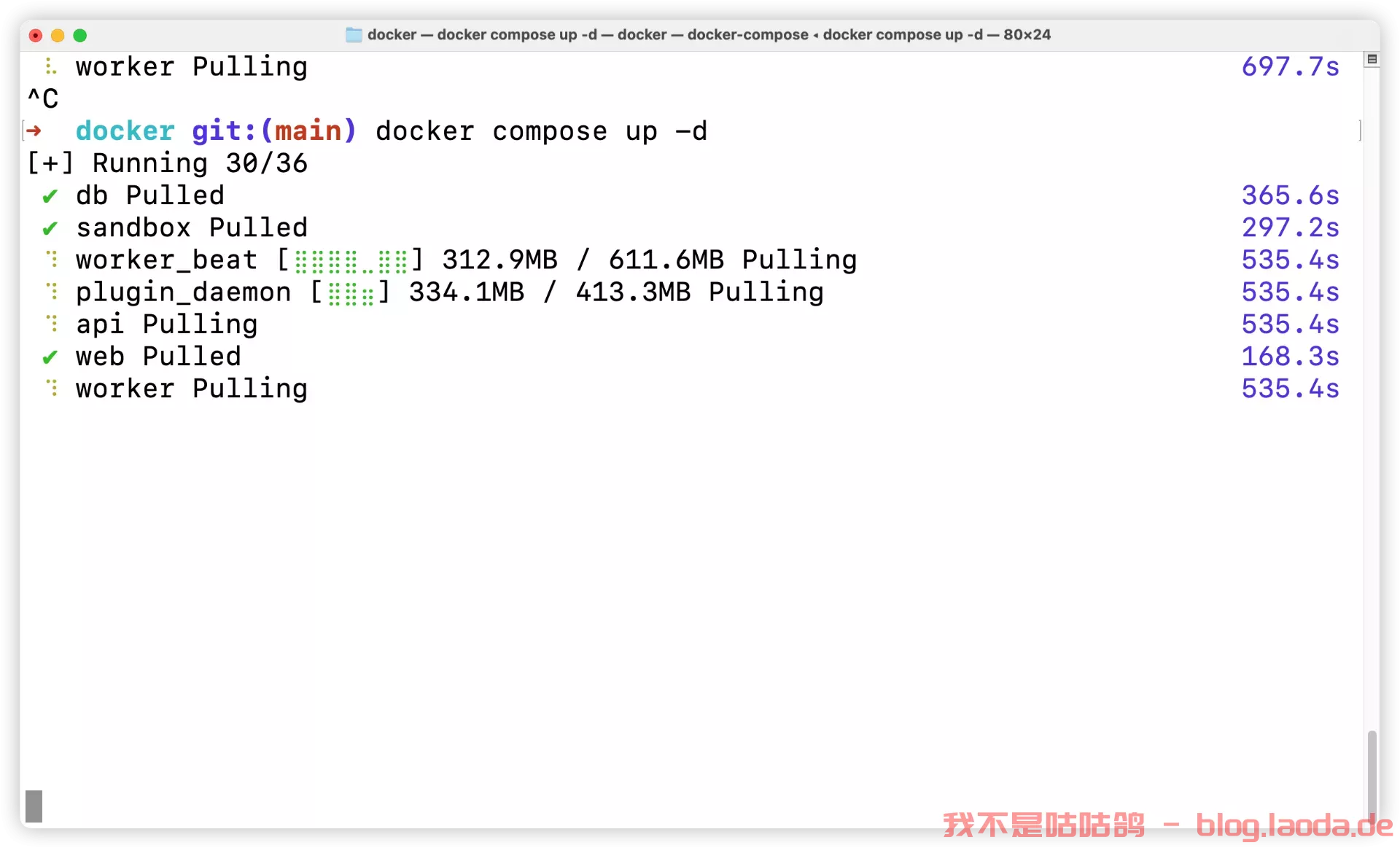
在这期间,如果决定要本地使用,不调用云端API的话,我们可以先把Ollama和本地的模型先下载起来。
安装Ollama(可选)
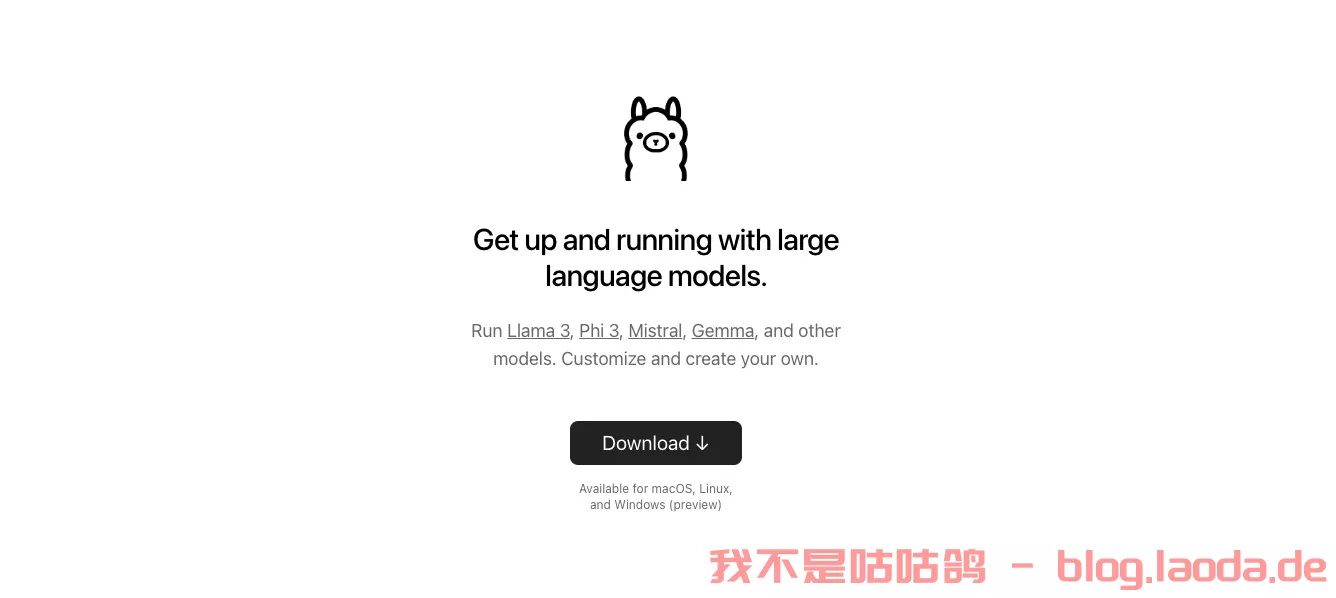
其实这个也可以用docker来装,但是既然给了安装版,我们就直接到官网下载即可。
什么是Ollama?

Ollama 是一个便于本地部署和运行大型语言模型(Large Language Models, LLMs)的工具。使用通俗的语言来说,如果你想在自己的电脑上运行如 GPT这样的大型人工智能模型,而不是通过互联网连接到它们,那么 Ollama 是一个实现这一目标的工具。
Ollama支持非常多的开源模型,比如:
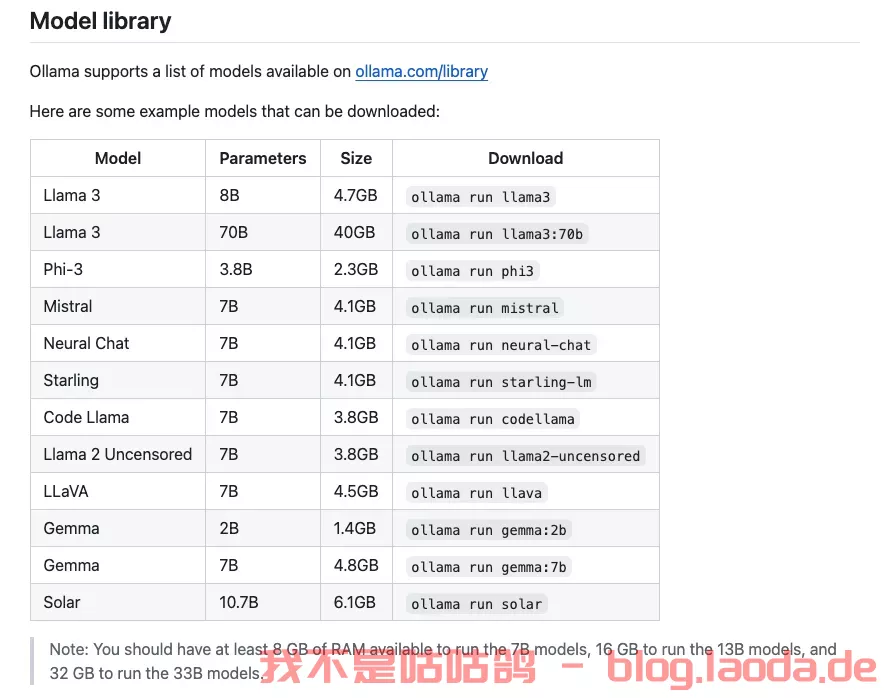
更多支持的模型可以看这边:https://ollama.com/library
当然它还支持自定义模型,这边就不深入了,有兴趣的可以研究:https://github.com/ollama/ollama
装好之后,命令行运行:
ollama -v
查看到版本号说明安装好了。
接下来,比如我们下载一个llama3 8B的模型:
ollama run llama3
这边可能需要比较长的时间,取决于你的网速。
下载好了就可以进行交互了:
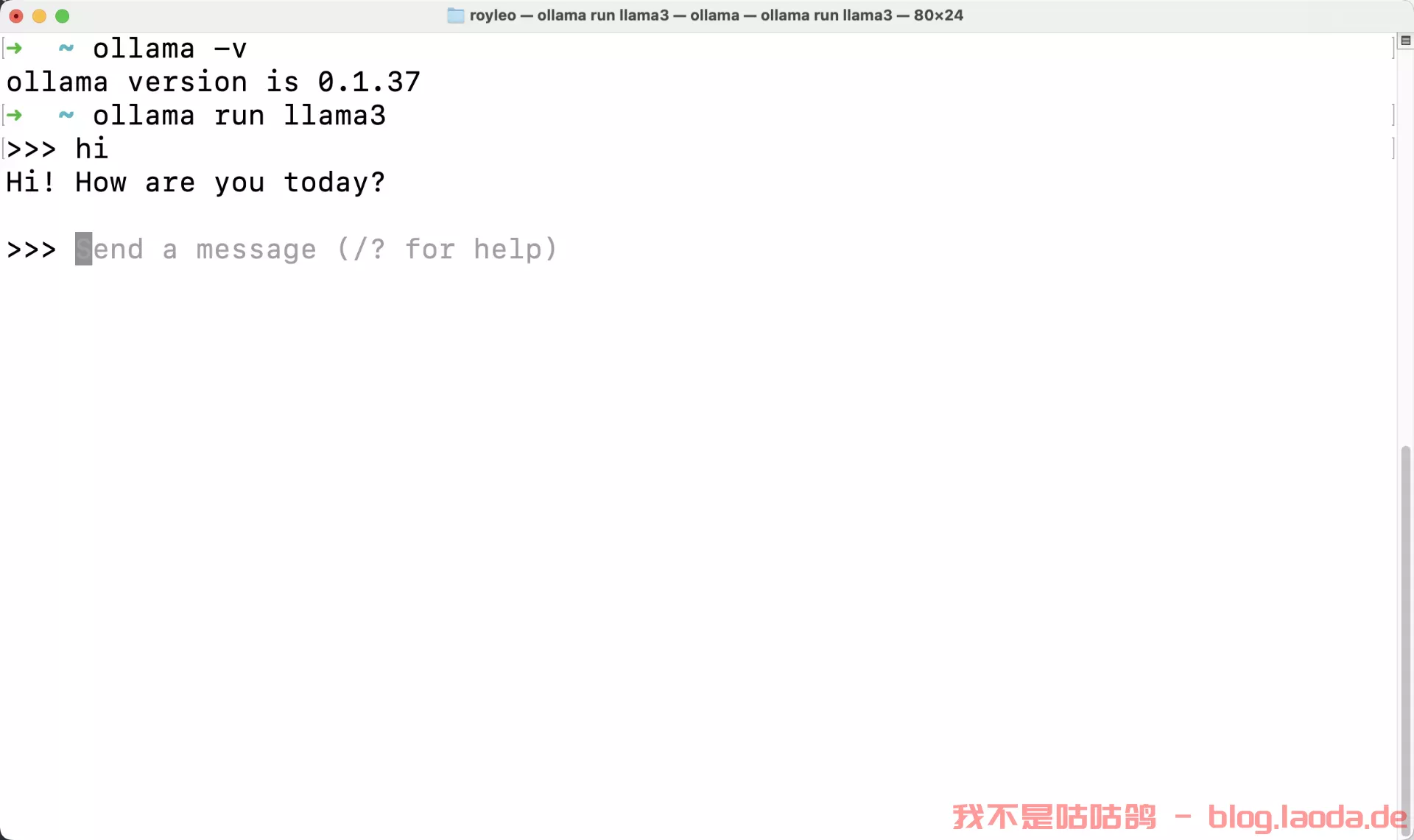
/? 可以查看帮助:
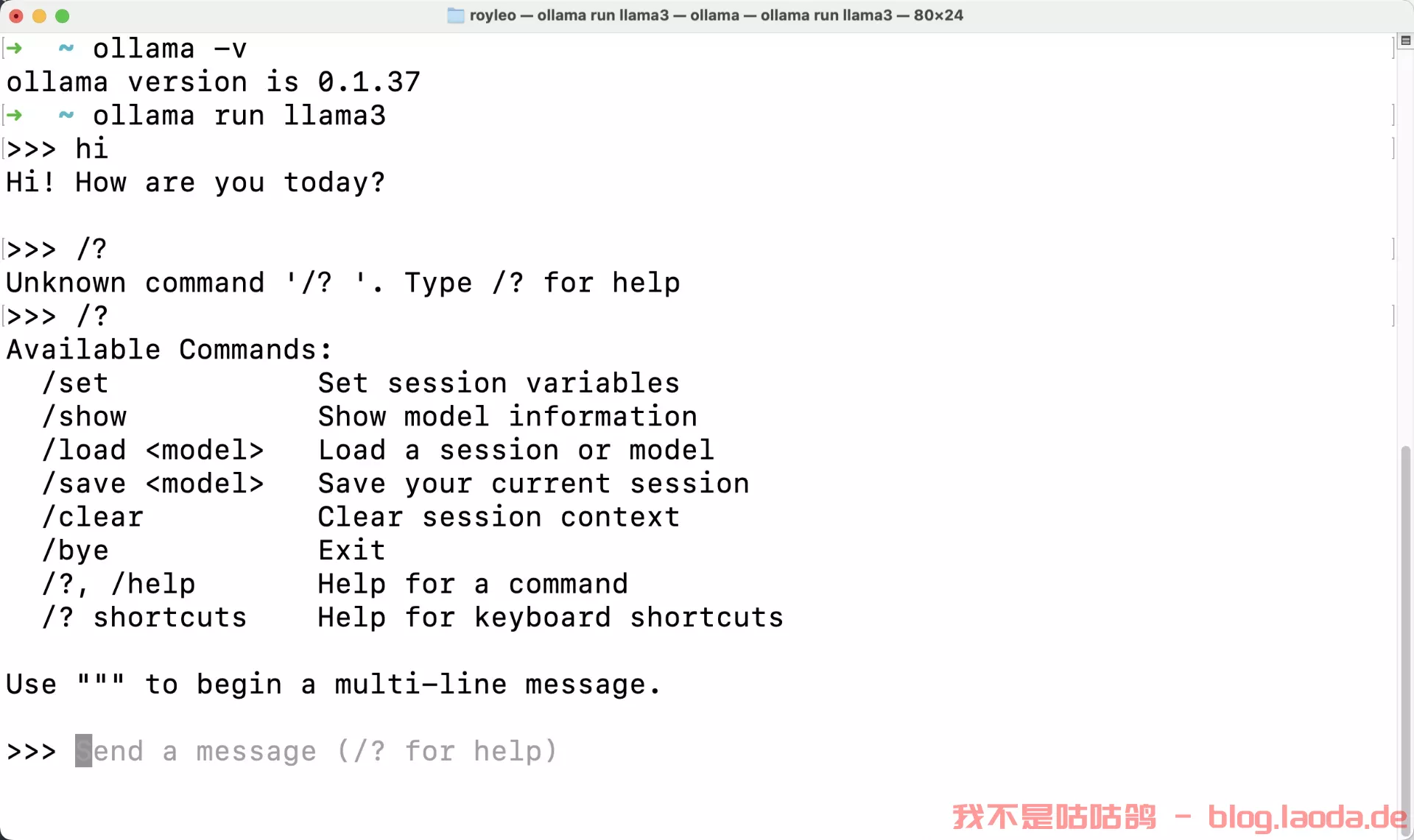
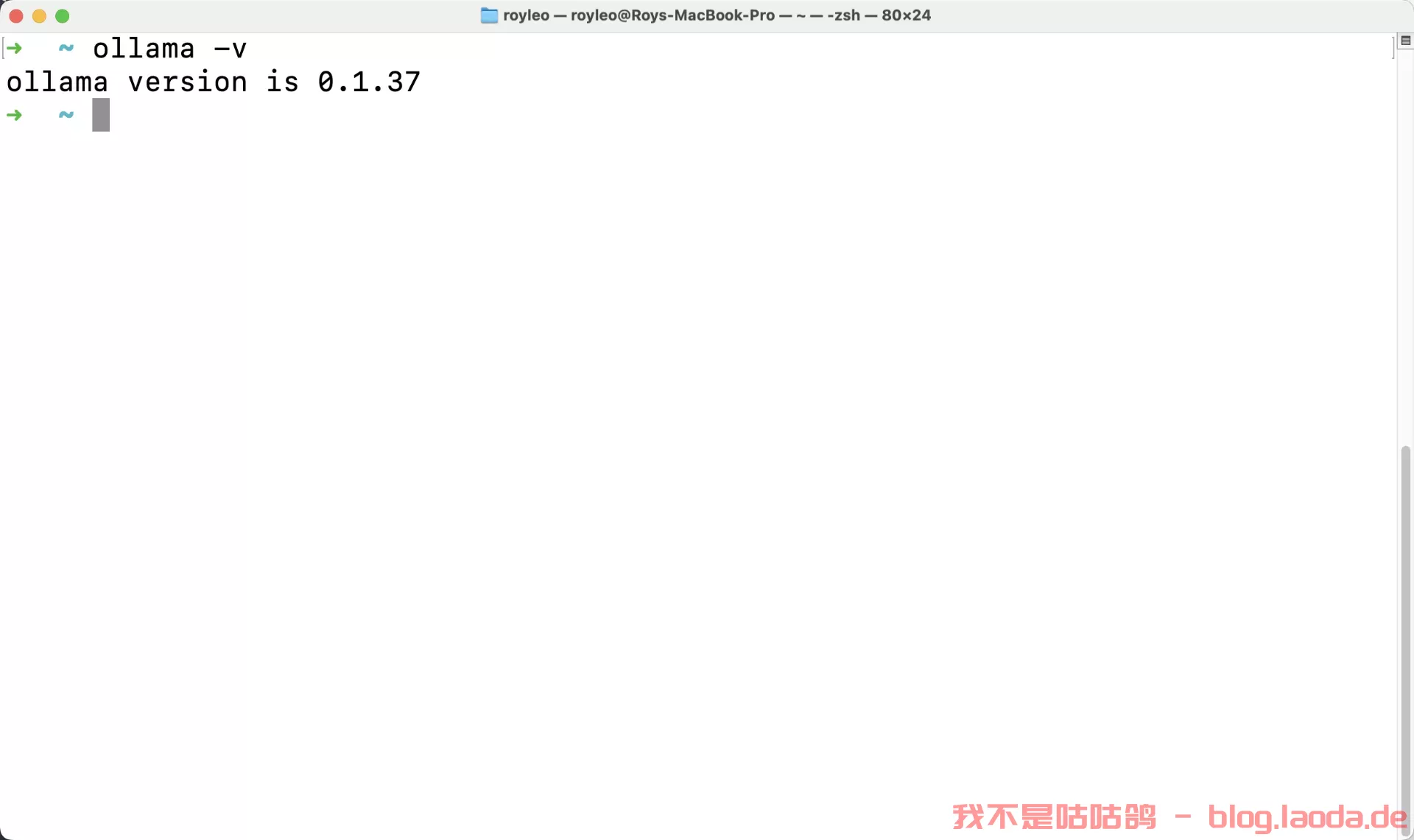
/bye 可以退出

其实现在已经搞定了,你可以让它帮你干活了,但是每次都要用命令行,有些人觉得不方便,而且也不能给别人用,下面我们就给它搞一个图形化界面,扩展一下功能,也能让局域网里的其他小伙伴也用上你的这个模型(注意多人同时访问会导致机器负载飙升,具体取决于你机器的性能和模型参数的大小)
配置Dify
等所有容器都拉取好了,我们就可以通过在浏览器地址栏输入:127.0.0.1来访问Dify了。
第一次登录会让你注册一个管理员账号,然后我们就可以登录了,
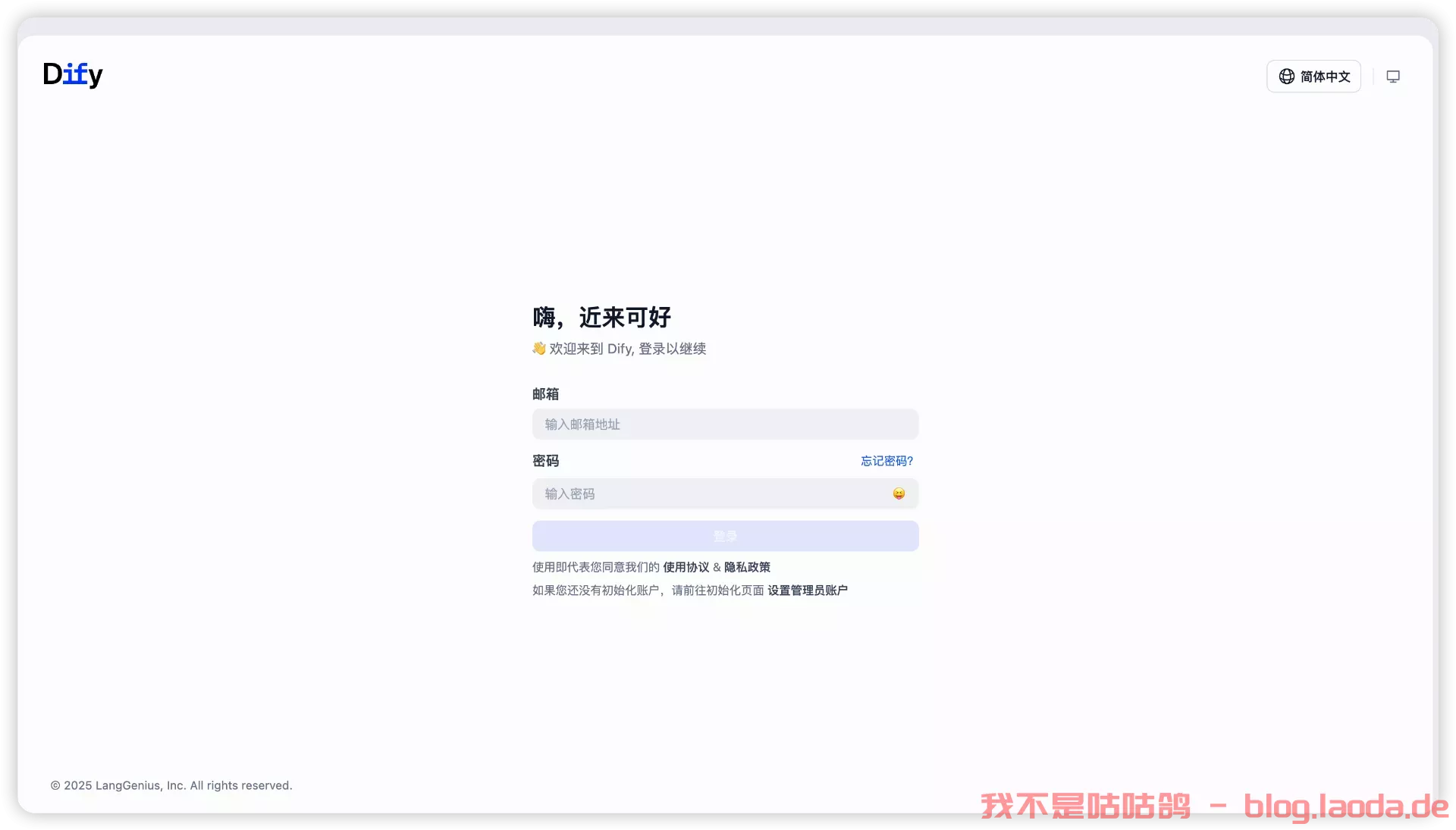
后台是这个样子的,
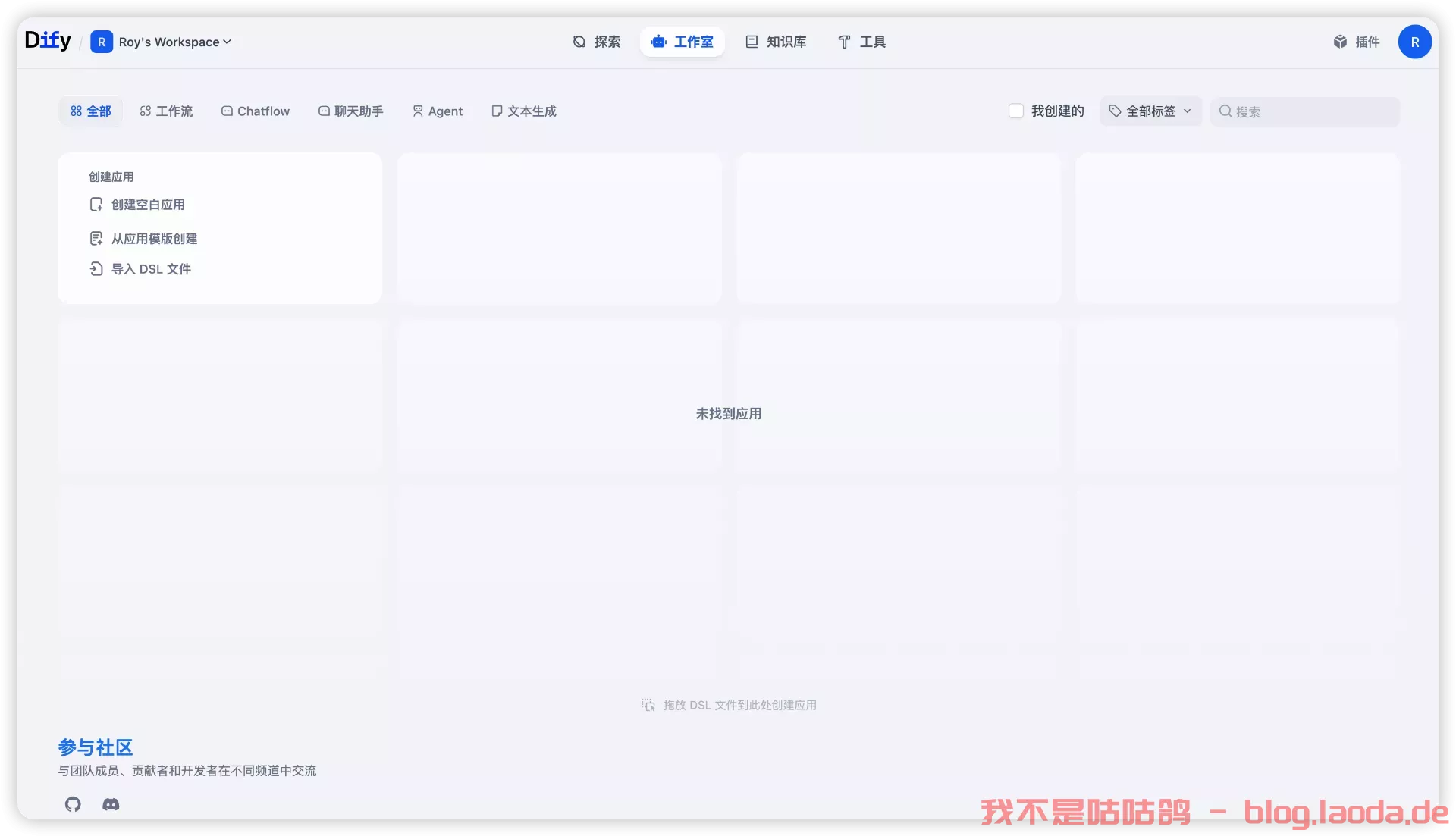
我们先来到设置,配置一下大模型,
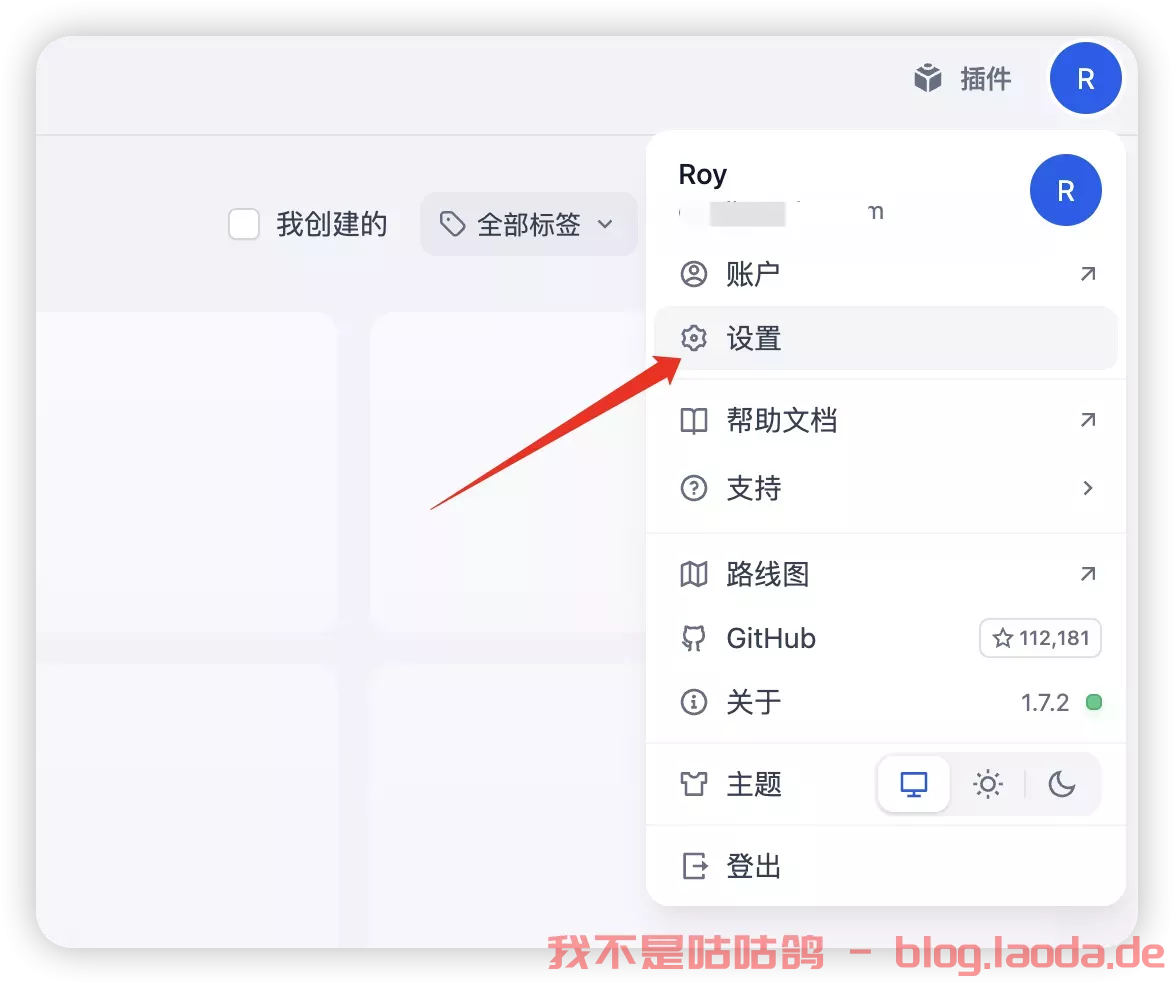
这边可以看到很多的模型供应商,
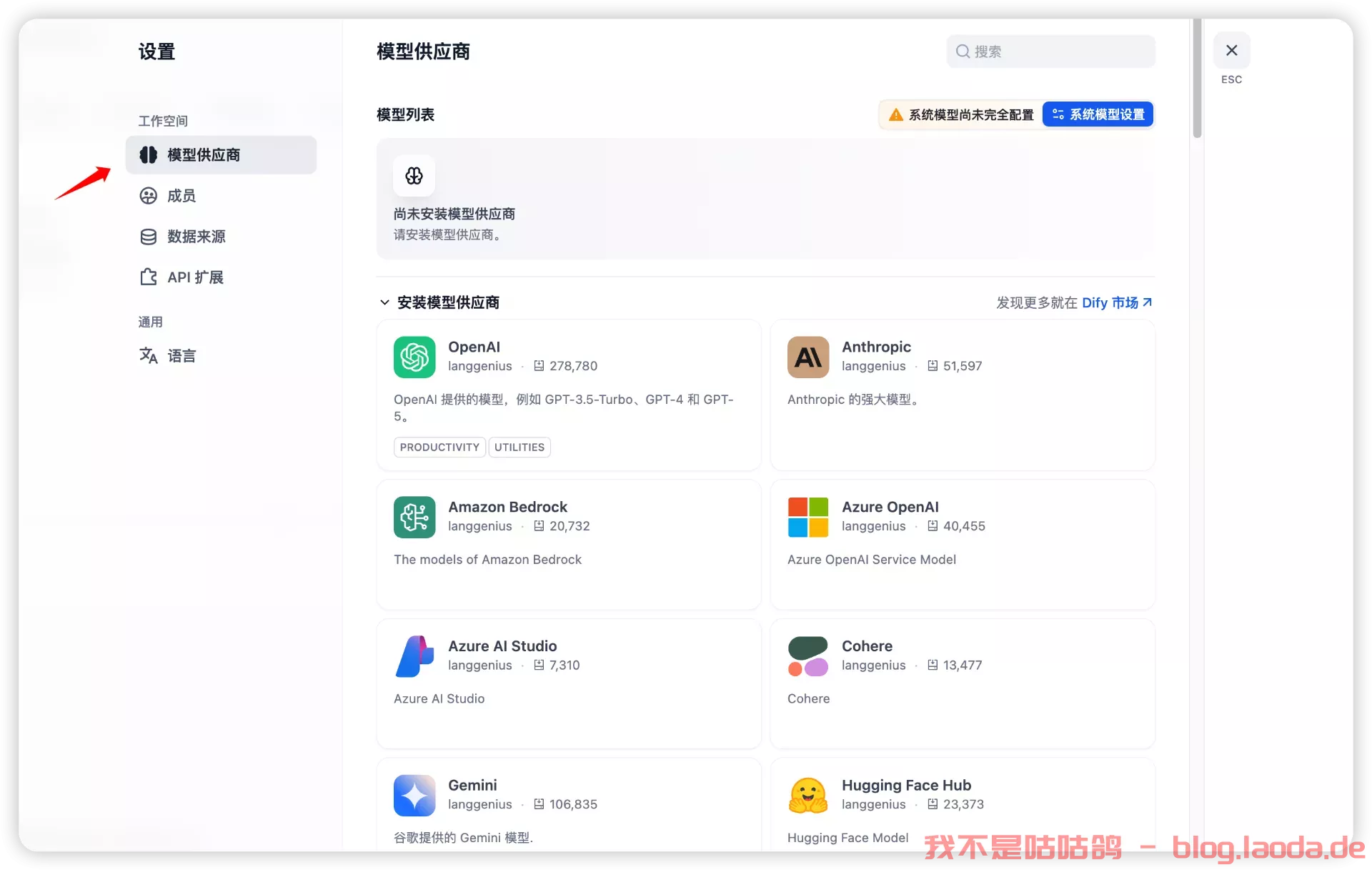
我们本地部署,就用ollama,
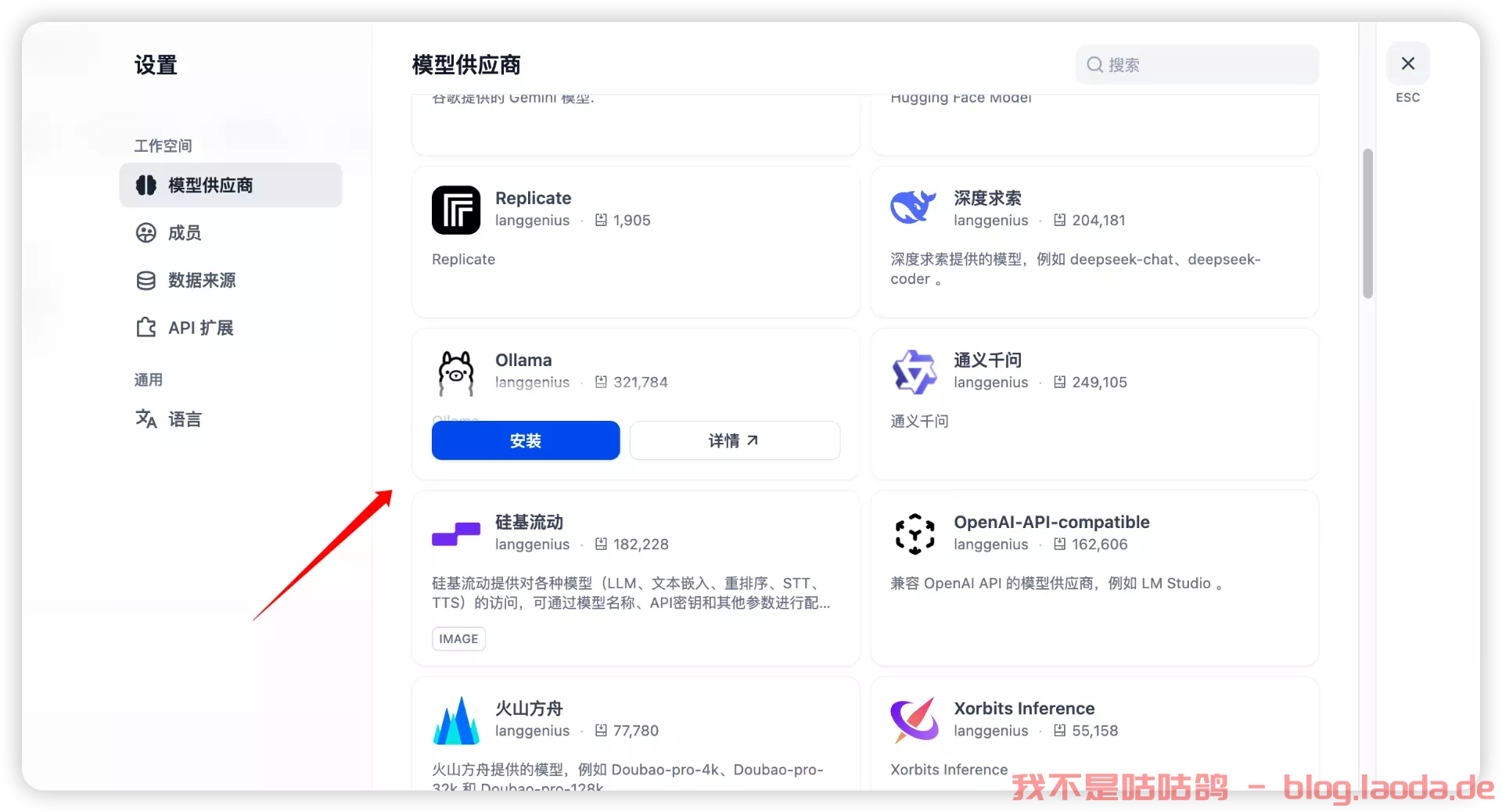
点击安装,
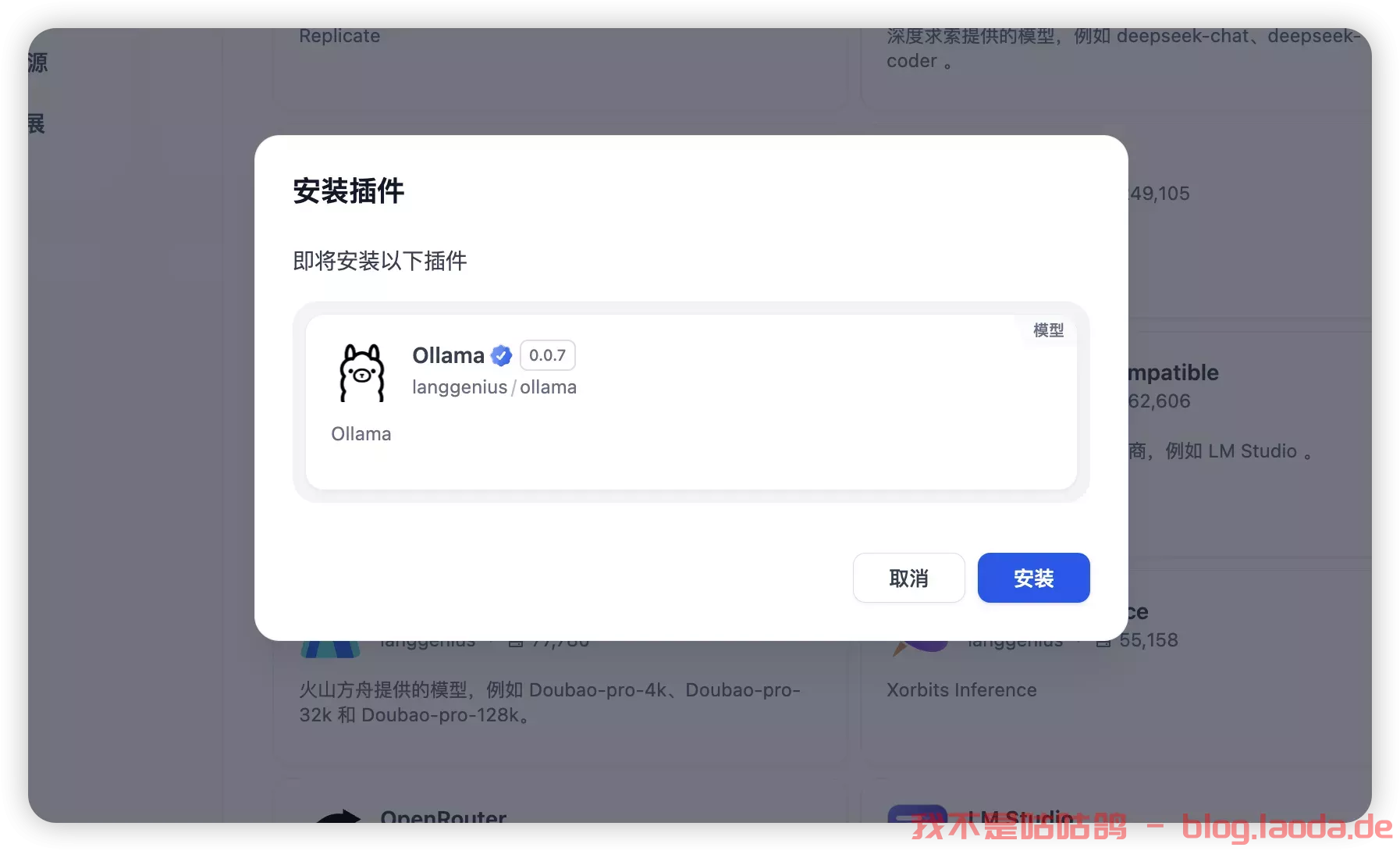
安装好了之后,来添加模型,
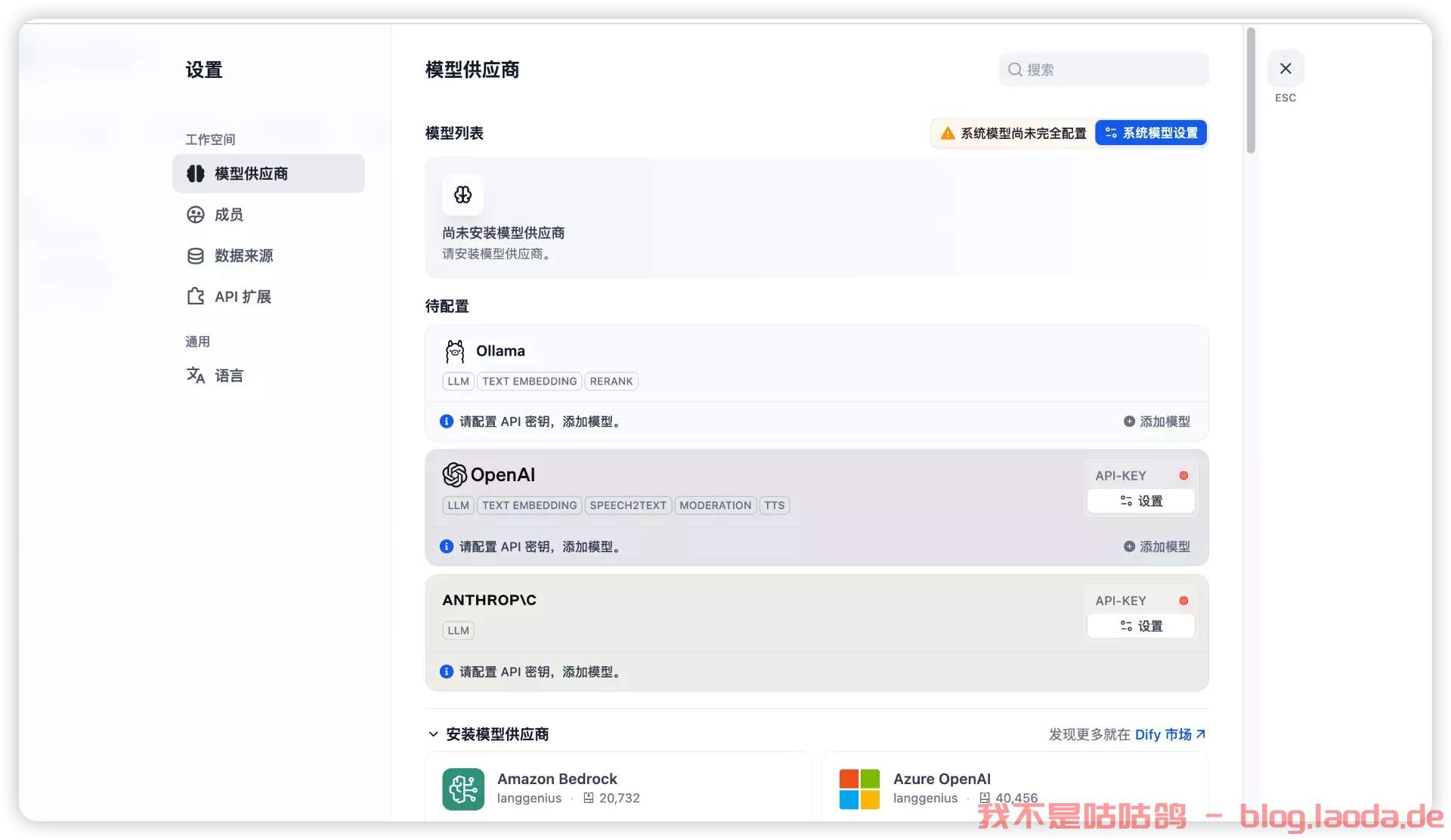
这里的基础URL,填写:http://host.docker.internal:11434
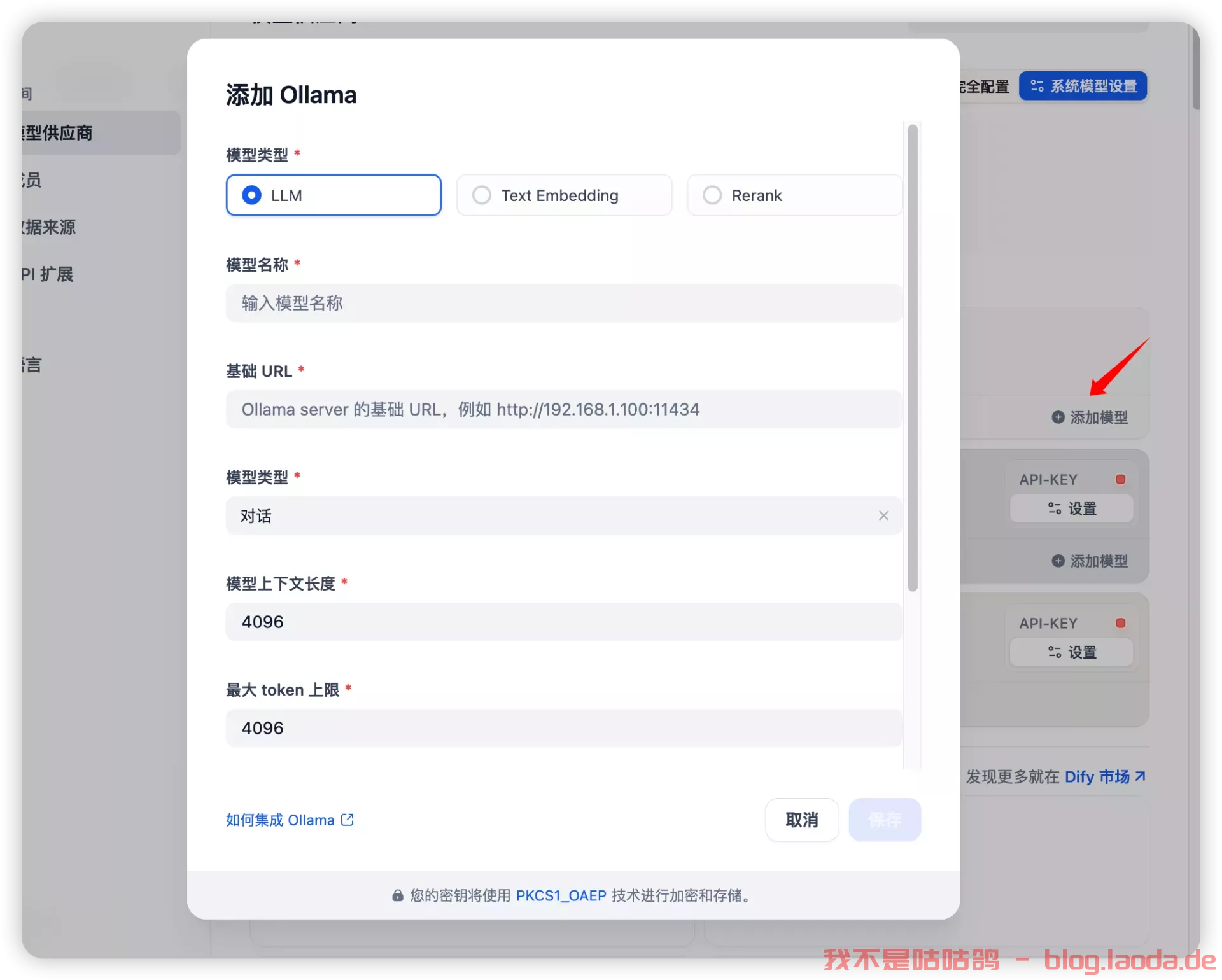
模型名称的话,看看我们ollama里下载了什么模型,打开终端,输入
ollama list
可以看到我这边下载了很多模型,
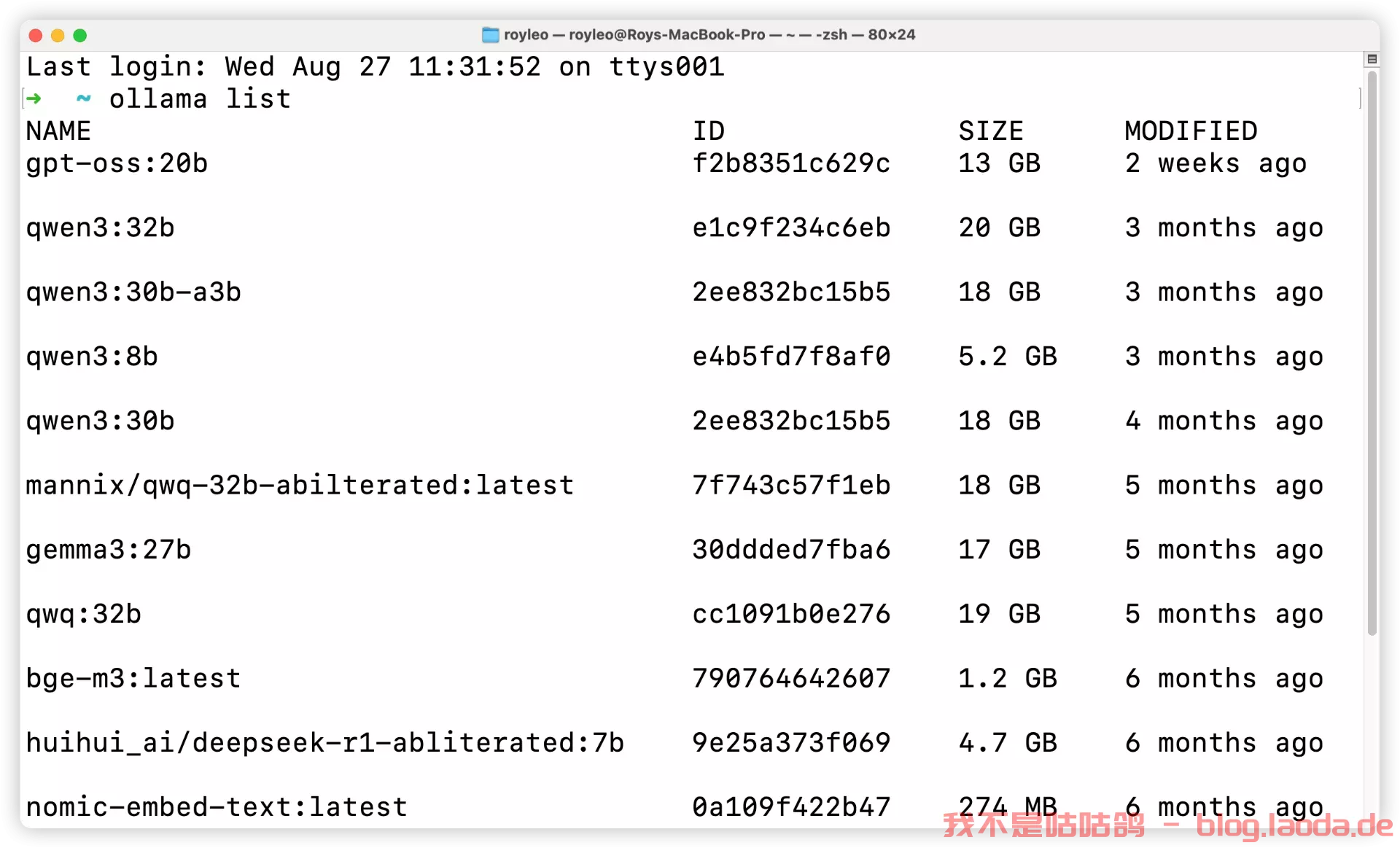
我们就选择gpt最近刚开源的gpt-oss:20b
其他信息填写如图,
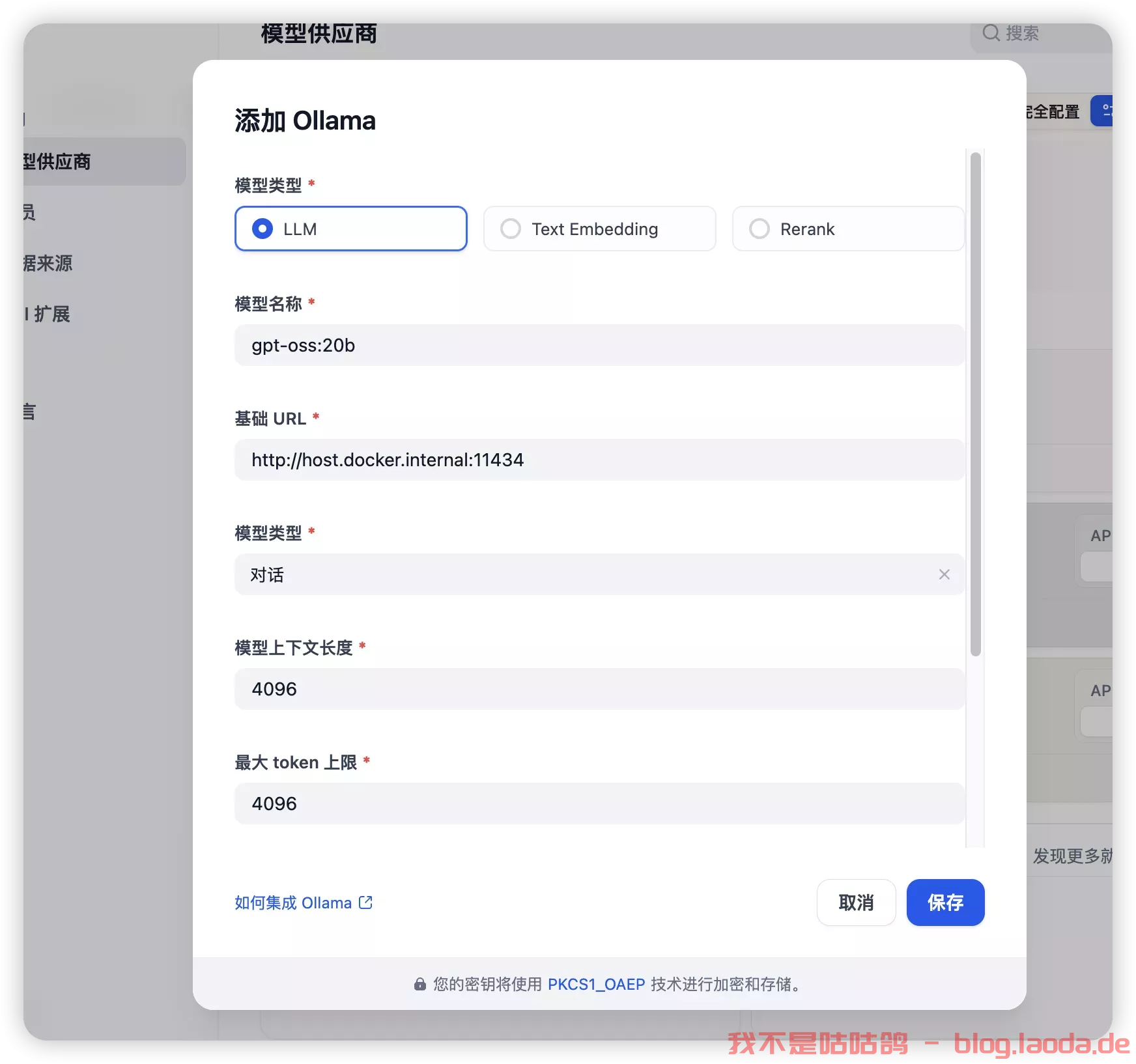
这边是支持函数调用的,选择是,不支持视觉,
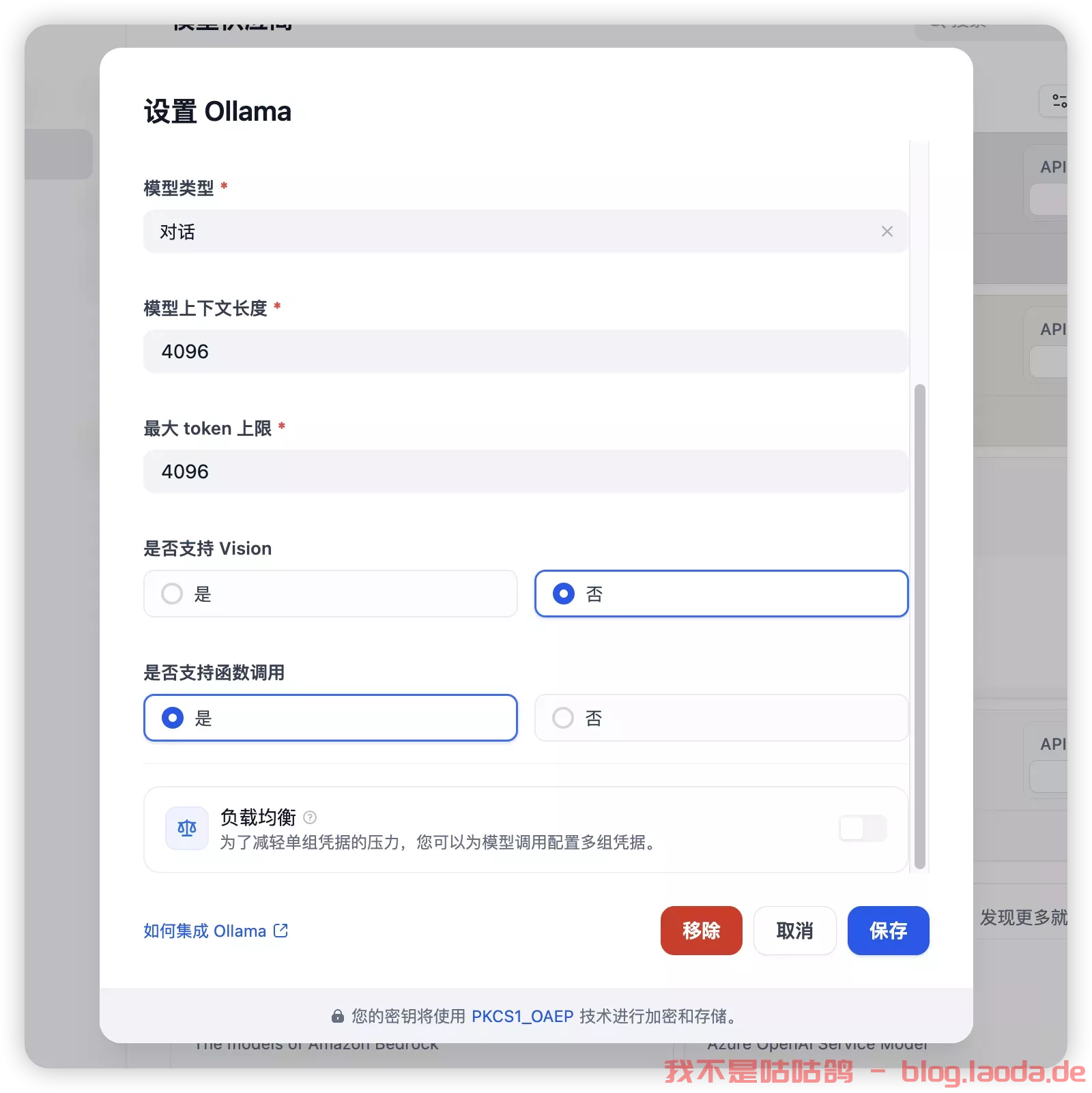
这样我们就添加好一个模型啦。
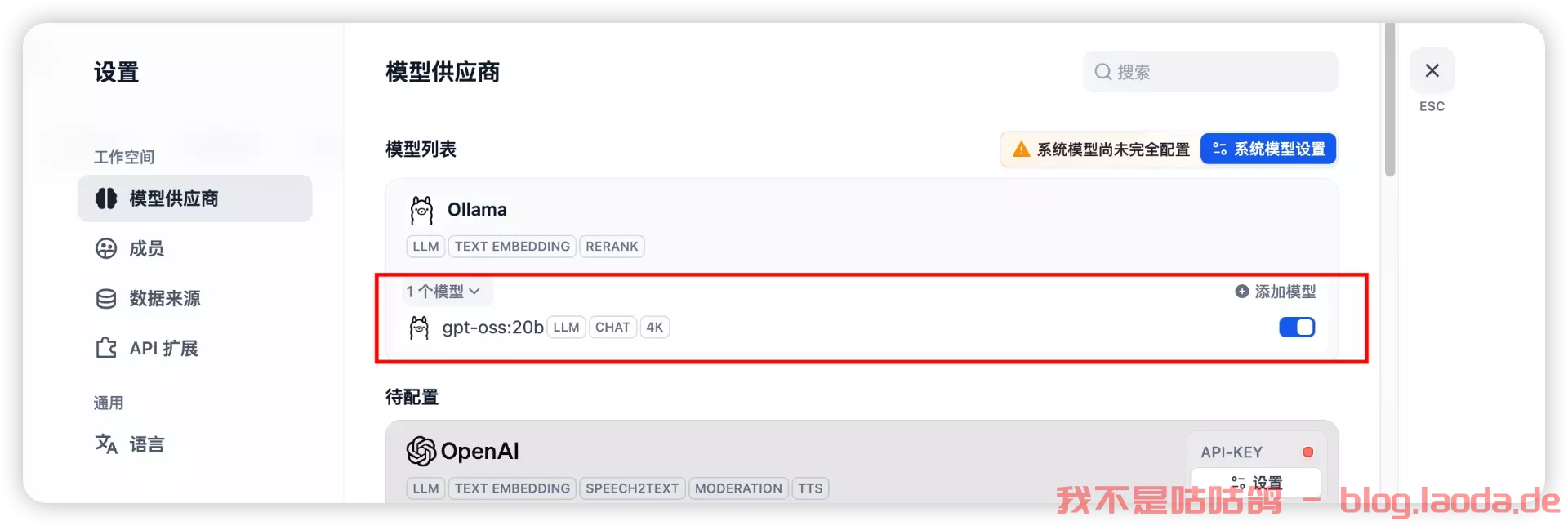
如果你的本地电脑算力不够,也可以选择使用云端的模型,比如DeepSeek之类的,
添加方法也很简单,下载模型供应商,然后在这边点击配置,
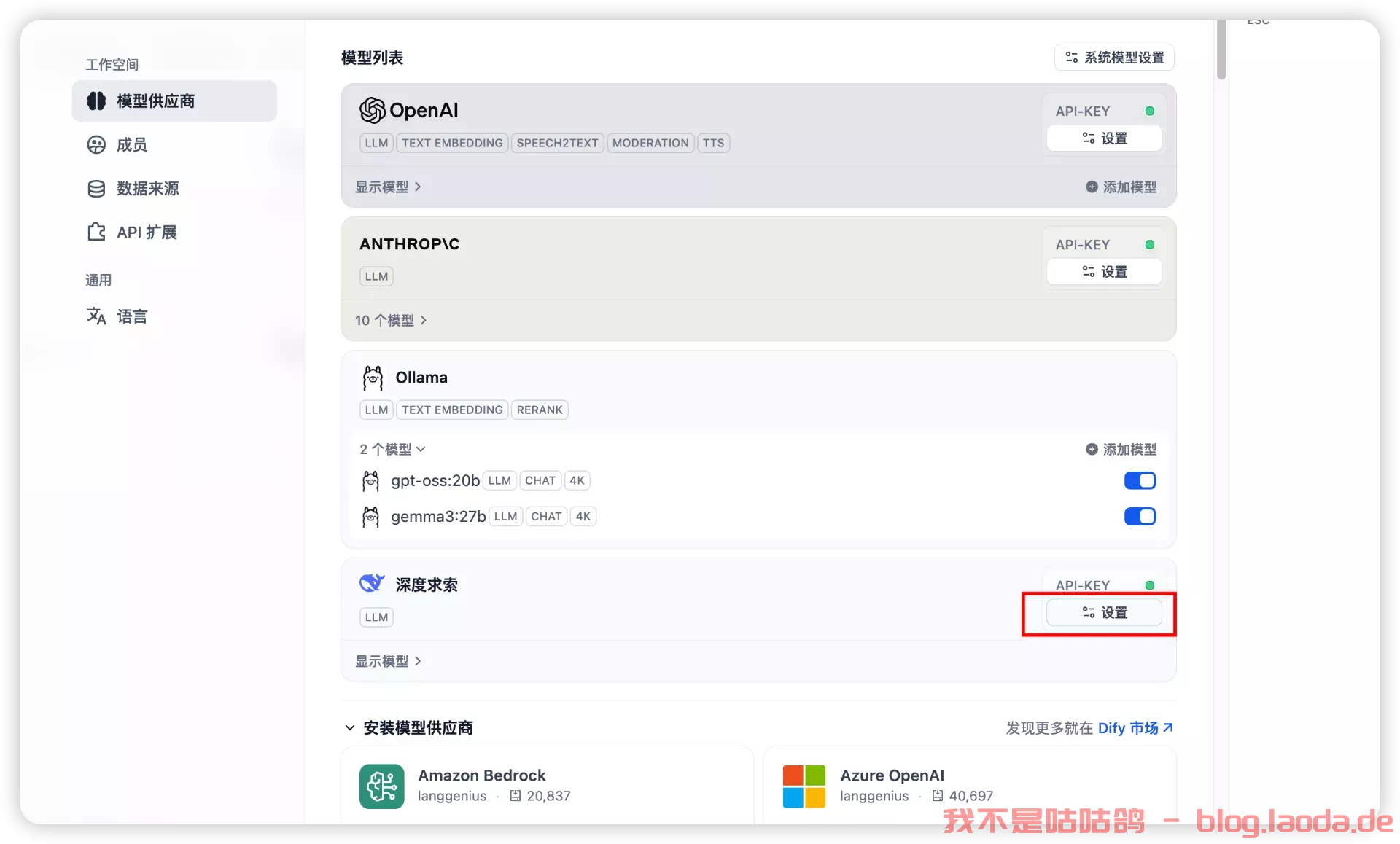
填入你在DeepSeek官网拿到的API Key就行了。
OpenAI、ANTHROPIC也是类似的方法,填API Key就可以。
接着,我们就来创建一个空白应用,
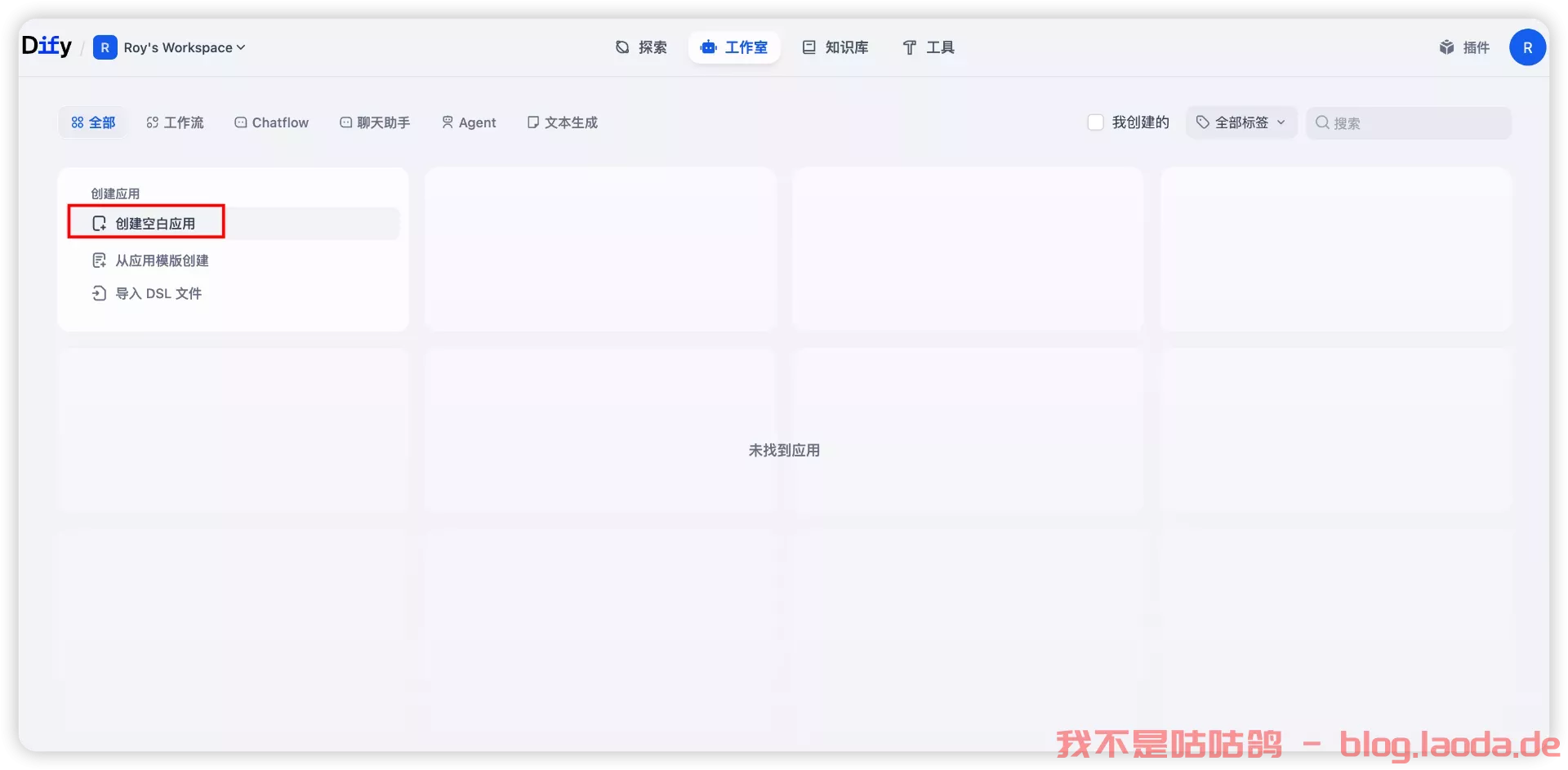
这边选择最简单的,创建一个聊天助手,
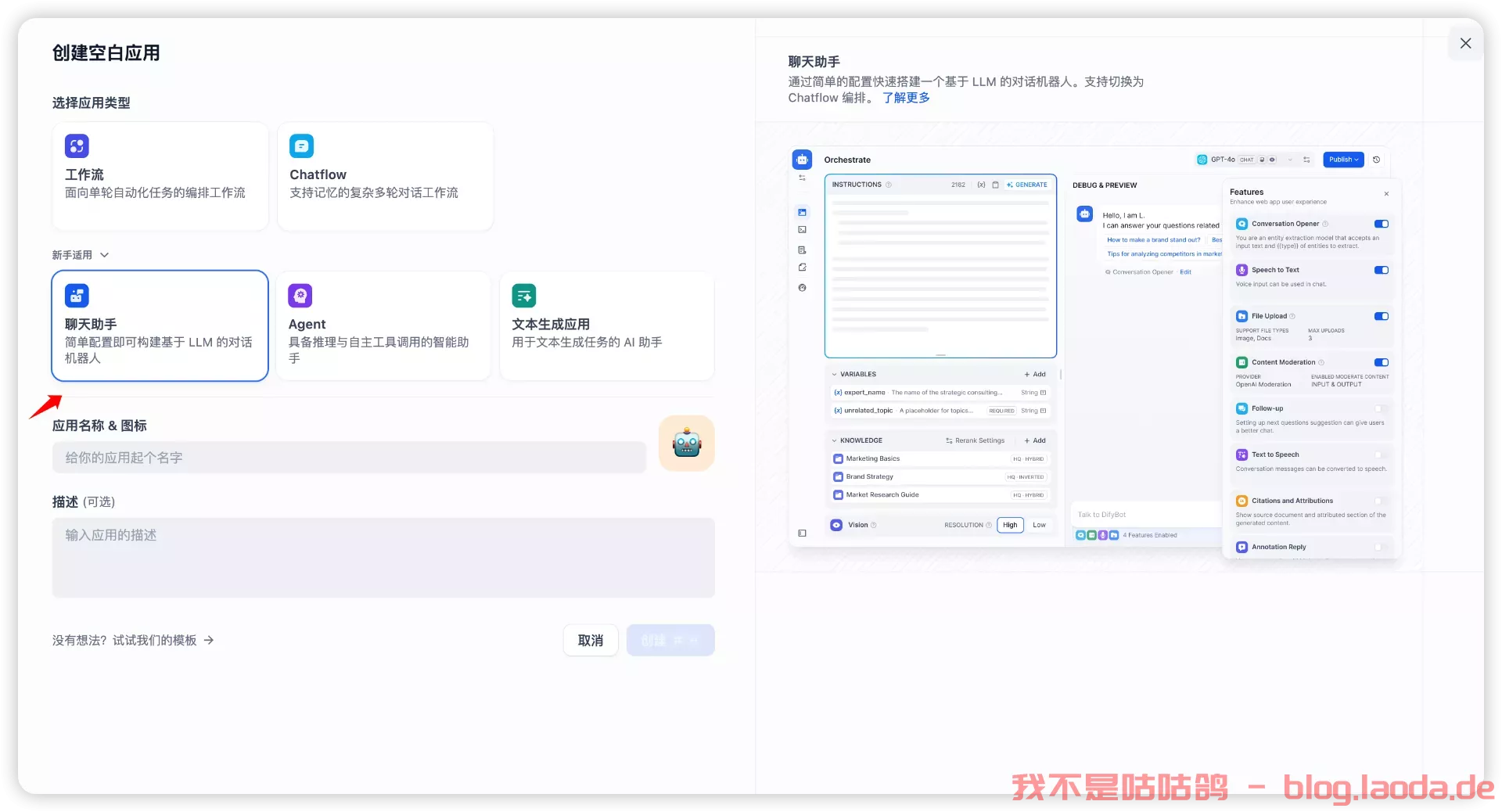
创建的过程中,你可以调试,这边的自定义程度会高一些,
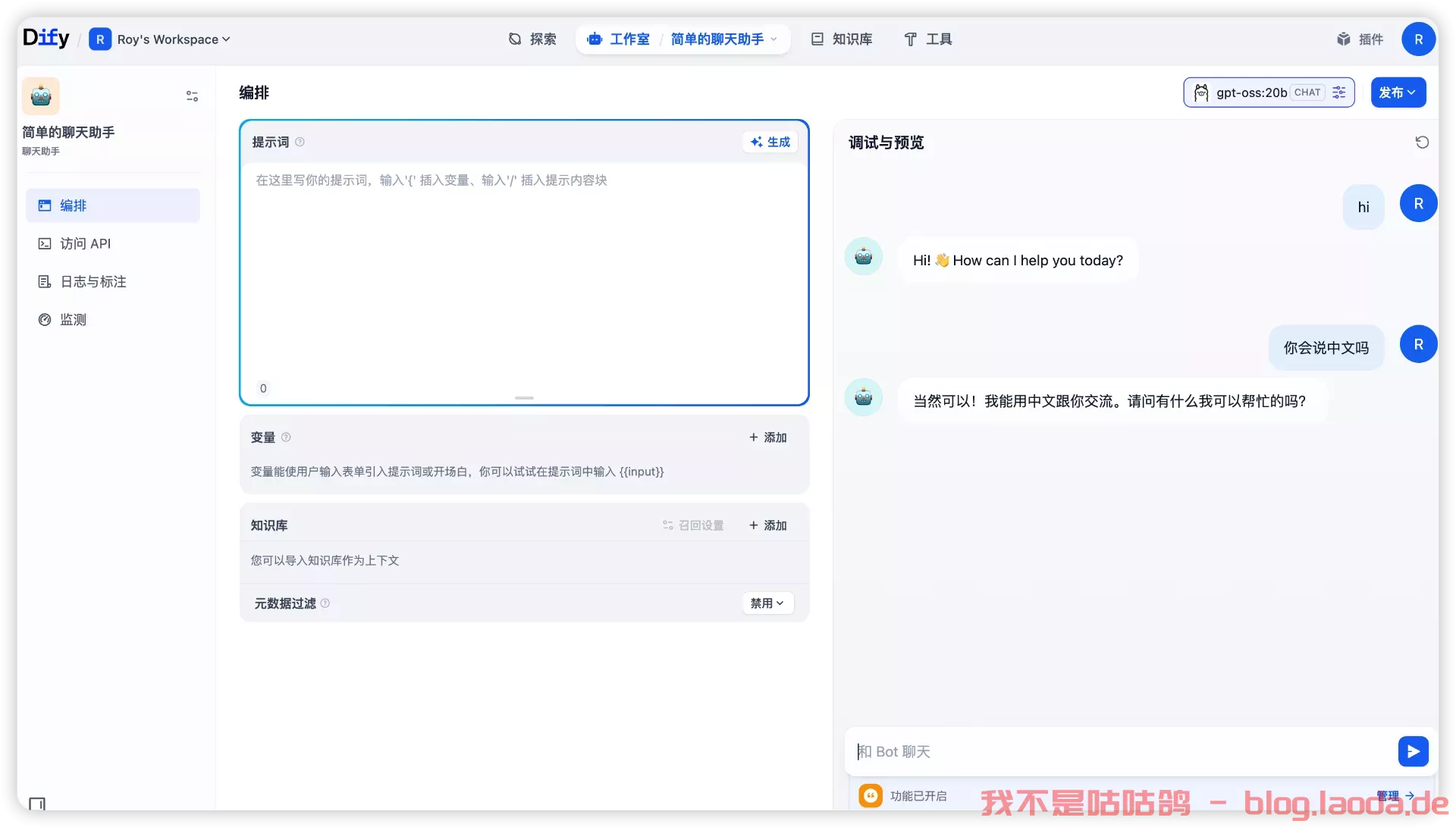
创建好之后,可以选择发布,或者点击探索,

就可以在这边调出使用了。
当然,这只是最简单的功能,dify的魅力在于降低AI应用开发的门槛,快速构建和部署生产级的生成式AI应用
它通过以下核心功能来实现这个目标:
- 简化开发流程:Dify是一个开源的大语言模型(LLM)应用开发平台,融合了后端即服务(BaaS)和LLMOps理念,提供可视化的Prompt编排、数据集管理、RAG(检索增强生成)引擎、Agent框架等功能,使开发者无需深入底层技术也能快速搭建AI应用。
- 支持低代码/无代码开发:通过直观的界面和拖拽操作,非技术人员也能参与AI应用的定义和数据运营,极大地降低了开发门槛。
- 灵活的模型支持:Dify支持多种主流大语言模型(如GPT、Claude、DeepSeek等)以及开源模型,开发者可根据需求灵活选择和切换模型。
- 高效的RAG和Agent功能:Dify的RAG技术通过结合外部知识库提升生成内容的准确性,而Agent框架赋予AI自主推理和任务执行能力,适用于复杂场景如智能客服、内容生成等。189.html)
- 企业级应用支持:Dify提供私有化部署、API集成、多租户隔离等功能,适合企业构建内部AI网关或快速将AI能力融入现有业务,助力AI转型。
总结来说,Dify通过提供一站式、易用的开发平台,帮助开发者、企业甚至非技术人员快速实现AI应用创意,节省开发时间,专注于创新和业务需求,特别适合从原型设计到生产部署的全流程管理。
大家可以自行探索一下Dify的高级玩法,我自己也在慢慢摸索学习,之后有机会可以和大家分享!




评论区